2014–15 Annual Report HTML
Annual Report 2014–15 Commonwealth Director of Public Prosecutions
CONTENTS
- Highlights
- Letter of Transmittal
- Summary of 2014–15 Performance
- Director’s Review
- Chapter 1 About Us
- Chapter 2 Our National Practice Areas
- Chapter 3 Our National Practice Groups
- Chapter 4 Our Partnerships
- Chapter 5 Our Performance
- Chapter 6 Our Corporate Governance
- Chapter 7 Our People
- Chapter 8 Finances
- Chapter 9 Financial Statements
- Chapter 10 Appendices and References
- Chapter 11 Index
- Our Offices
- Contact Details
List of tables
- Table 1: National Practice Groups and crimes we prosecute
- Table 2: POC Act 2002—orders and forfeitures in 2014–15
- Table 3: Criminal Assets: summary of recoveries for 2014–15
- Table 4: Legislation under which charges were dealt with in 2014–15
- Table 5: Referring agencies: defendants dealt with in 2014–15
- Table 6: Outcomes of successful prosecutions in 2014–15
- Table 7: Summary of prosecutions in 2014–15
- Table 8: Committals in 2014–15
- Table 9: Prosecutions on indictment in 2014–15
- Table 10: Prosecution appeals against sentence in 2014–15
- Table 11: Defence appeals in 2014–15
- Table 12: Reparation orders and fines
- Table 13: Prosecution performance indicators for 2014–15 (national totals)
- Table 14: Prosecution performance indicators for 2013–14 and 2014–15 (national totals)
- Table 15: Audit Committee membership
- Table 16: Audit Committee attendance 2014–15
- Table 17: Audit Committee members
- Table 18: Staffing headcount by classification level and region at 30 June 2015
- Table 19: Workforce profile by classification
- Table 20: Workforce profile by location
- Table 21: Average staffing level by location 2014–15
- Table 22: Staffing summary
- Table 23: Workforce profile by category summary
- Table 24: Workforce diversity profile by classification at 30 June 2015
- Table 25: Workplace diversity summary
- Table 26: Salary scales at 30 June 2015
- Table 27: Legal services expenditure
- Table 28: Environmental performance during 2014–15
- Table 29: Agency resource statement
- Table 30: Expenses by outcome
- Table 31: List of requirements
List of figures
- Figure 1: Organisation chart at 30 June 2015
- Figure 2: CDPP governance structure at 30 June 2015
COMMONWEALTH DIRECTOR OF PUBLIC PROSECUTIONS
Australia’s Federal Prosecution Service
Contributing to a fair and just Australia
OUR AIM
We will provide an effective and efficient independent prosecution service that contributes to a fair, safe and just Australia where Commonwealth laws are respected, offenders are brought to justice and potential offenders are deterred.
OUR LEGAL PRACTICE
We will:
- be fair, consistent and professional in everything we do
- work with our partner agencies to assist them in advancing their goals and priorities in accordance with the Prosecution Policy of the Commonwealth
- treat victims of crime with courtesy, dignity and respect.
OUR PEOPLE
We will recognise, value and develop the knowledge and skills of our people.
By investing in effective people development programmes to support continuous learning we will enhance our workplace culture—build resilience, reward effective performance and implement a performance measurement framework.
ADVISE
We work collaboratively with stakeholders.
Partner agencies rely on the CDPP to bring their investigations to conclusion through prosecution.
The CDPP provides guidance through pre-brief advice.
PROSECUTE
We prosecute crimes against Commonwealth law.
By taking legal action against offenders the CDPP helps protect the broader community.
Successful prosecutions convict offenders and break down criminal networks−delivering justice through effective sentencing.
EDUCATE
Educating the community about our prosecution outcomes helps build public confidence in the CDPP as a vital part of the Australian justice system.
Through education we aim to deter potential offenders by highlighting the serious consequences for individuals convicted of crimes committed against the Commonwealth−our work sends a strong message that serious crime will not be tolerated.
OUR PROSECUTION OUTCOMES— 2014–15 AT A GLANCE
We work closely with partner agencies to bring cases to a close through effective prosecution.
- 4,909 matters before the courts
- An average of 409 matters per month or 94 matters per week
Resulting in:
- 2,156 prosecutions resulting in a conviction
- 1,011 defendants sentenced to imprisonment
- 2,704 cases closed
The CDPP worked with 59 investigative agencies during the reporting period and received briefs of evidence from 46 investigative agencies across the nation.
Top referring agencies include:
- Australian Federal Police
- Department of Human Services
- Australian Taxation Office
- Department of Immigration and Border Protection
- Australian Securities and Investments Commission
Referrals from these agencies represent 80% of all matters.
SIGNIFICANT MATTERS
Together we contribute to a fair, safe and just society, where the laws of the Commonwealth are respected and there is public confidence in the justice system.
FRAUD
- More than $60 million fraud proven against the Commonwealth
Including:
- More than $28M tax fraud
- nearly $16M Centrelink fraud
- In excess of $500,000 other benefits fraud
COUNTER-TERRORISM
- 21 counter-terrorism matters before the courts
- 39 referrals during 2014–15
PEOPLE SMUGGLING
- 23 people smuggling matters before the courts
- 2 new referrals during 2014–15
SERIOUS DRUGS
- 263 convicted of serious drug offences under the Criminal Code
- Of those 90% were sentenced to gaol
TRANSMITTAL LETTER
30 September 2015

Attorney-General
Senator the Hon George Brandis QC
Parliament House
Canberra
Dear Attorney-General
I am pleased to present the annual report for the Commonwealth Director of Public Prosecutions (CDPP) for the year ended 30 June 2015.
Section 46 of the Public Governance, Performance and Accountability Act 2013 requires the Director of Public Prosecutions to prepare a report to the Attorney-General regarding the CDPP’s operations during the year.
This report has been prepared in accordance with section 63(1) of the Public Service Act 1999, which requires me to provide this report to you for presentation to the Parliament. It reflects the Requirements for annual reports for departments, executive agencies and other non-corporate Commonwealth entities (25 June 2015) as approved by the Joint Committee of Public Accounts and Audit.
In addition, I certify that the CDPP has prepared a fraud risk assessment and fraud control plan that complies with the requirements of the Commonwealth Fraud Control Framework 2014, and specifically section 10(b) of the Public Governance, Performance and Accountability Rule 2014. We have robust fraud prevention, detection, investigation, reporting and data collection procedures and processes in place that align with the principles outlined in the Australian Audit Office Better Practice Guide on Fraud Control in Australian Government Entities, 2011. We have taken all reasonable measures to minimise the potential incidence of fraud in the CDPP and to enable effective investigation and recovery of proceeds of any fraud against the CDPP.
Yours sincerely
Robert Bromwich SC
Commonwealth Director of Public Prosecutions
SUMMARY OF 2014–15 PERFORMANCE
Our Portfolio Budget Statement includes the outcome, programme, deliverables and key performance indicators against which we must report.
Outcome
Maintenance of law and order for the Australian community through an independent and ethical prosecution service in accordance with the Prosecution Policy of the Commonwealth.
Programme
An independent service to prosecute alleged offences against the criminal law of the Commonwealth, in appropriate matters, in a manner which is fair and just, and to ensure that offenders, where appropriate, are deprived of the proceeds and benefits of criminal activity.
Deliverable
To achieve the programme objectives, we will continue to deliver effective and timely prosecution services.
Results in 2014–15
In 2014–15 we met all prosecution performance indicators, including exceeding our target prosecutions resulting in conviction:
| Deliverable | Target | Outcome | Details |
|---|---|---|---|
| Prosecutions resulting in a conviction | 90% | 98% | 2,156 (out of a total of 2,209) |
Prosecution performance indicators
Our key performance indicators focus on providing public confidence in the justice system by providing effective and timely prosecution services. We continue to meet and exceed performance targets each year.
| Key performance indicator | Target | 2013–14 | 2014–15 |
|---|---|---|---|
| Prosecutions resulting in convictions | 90% | 98% | 98% |
Full details are in Chapter 4: Our Partnerships from page 70, Chapter 2: Our National Practice Areas from page 28 and Chapter 5: Our Performance from page 84.
DIRECTOR’S REVIEW
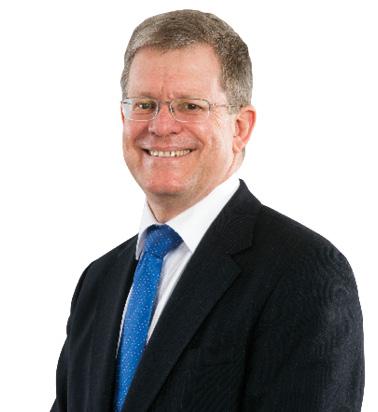
Transforming our organisation
2014–15 was a pivotal year for the Office of the Commonwealth Director of Public Prosecutions (CDPP). This was our first full year operating under a new national practice group model—based on legal practice groups comprising specialist teams in many locations dedicated to prosecuting specific categories of crime.
As well as transforming our national practice, we continued to modernise our systems and processes.
Our transformation has positioned the CDPP to meet the challenges of increasingly complex and expanded Commonwealth criminal law. It has led to immediate improvements, such as quicker decision-making and less internal red-tape, and is delivering benefits that will strengthen our position within the justice system into the future, including:
- more efficient, effective and nationally consistent federal prosecution services
- enhanced expertise of our Federal Prosecutors, who operate in courts at every level nationally
- strengthened relationships with our partners, supporting better briefs of evidence and improved prosecution outcomes, including greater encouragement of early guilty pleas
- improved sharing of information, expertise and knowledge.
Achieving successful prosecution outcomes
We achieved a 98 per cent conviction rate, with 2,156 out of 2,209 prosecutions resulting in convictions this year. A high conviction rate is a hallmark of a successful prosecution service. This has been achieved through high quality evidence assessment and effective charge selection and preparation ensuring a very high guilty plea rate. This has enabled case load and complexity to be balanced.
To indicate the range and diversity of our legal practice, cases were referred by 46 Commonwealth investigative agencies, as well as state and territory police. Cases included illicit drug and precursor importation, child internet pornography and other internet child sex offending, defrauding the government of tax or benefits, corporate crime, and a sharp increase in terrorism and related offences, as well as many other areas.
Building our capability
To continue to prosecute crimes against Commonwealth law successfully, we must ensure the conduct of our practice remains in step with society’s expectations. Our operating environment must also remain progressive to deliver a high performing CDPP. To this end, during the year we extensively reviewed our three functional areas—legal, administrative support, and corporate management. This led to 28 new Federal Prosecutor (Level 1) recruits joining our ranks, including recent graduates taking the first step in their legal careers. I am very pleased to provide these bright and dedicated young lawyers with an opportunity to work for the Commonwealth. While challenging, it is incredibly rewarding work and a real chance to make a difference.
To ensure we are properly resourced, we improved our internal reporting and legal case management tools. This has enabled us to analyse our legal work and develop evidence-based business cases to seek further funding to guide our recruitment and promotion activities and resource allocation. This will allow us to respond to the ever-changing work referred by our partner agencies. The drive to create an agile and flexible workforce has underpinned much of our planning.
Developing our leaders
Our leaders at all levels have played a critical role in advancing our major change agenda. We have expanded our investment in building our leadership capability. A tailored leadership programme was developed and implemented to improve our capability in the fundamental leadership areas of communication, change management, influence and learning agility, in turn helping to promote and support high performance.
Ensuring appropriate governance
As part of building our leadership capability, we must ensure our operating framework emphasises governance, accountability, performance and the appropriate use of public resources. Our reorganisation and the implementation of the Public Governance, Performance and Accountability Act 2013 and Rule 2014 have been foremost in our work in this area during 2014–15. This includes significant work reviewing our practices to ensure they align with government objectives and priorities, and contribute to achieving greater efficiencies and more effective outcomes.
Improving our prosecution services
In implementing our revised governance model we formed a National Best Practice Committee, drawing on and improving on past experience. The committee’s work has already resulted in significant improvements, in particular identifying and implementing best practice that is fundamental to our national operations and meeting our strategic directions.
Our prosecution services are influenced by this work, which brings together our expertise and organisational improvements to deliver tangible outcomes. For example, improved relationships with partner agencies are leading to better briefs of evidence, more efficient processing of work and more consistent outcomes, especially in sentencing.
Strengthening our partnerships
Staff at the CDPP recognise the importance of continually building on our strong collaborative relationships with our partner agencies. This remained a top priority during the year.
Our national practice group model better aligned our national liaison with partner agencies and the way we oversee cases they refer to us. Given our different roles and responsibilities, early engagement with our partner agencies is vital for better investigation and prosecution outcomes.
Throughout the year we were called on for advice, including scoping matters and providing qualified pre-brief advice. We are committed to improving this service as and when resources permit, recognising the clear and obvious direct correlation between the contribution this makes to improving the quality of the briefs we receive and our timeliness in assessing briefs and moving cases forward to a successful conclusion.
Our commitment to strong partnerships is evident in our contribution to multi-agency taskforces. Project Wickenby is a fine example of the value of partnering with other agencies to fight crime—in this instance, a joint effort targeting sophisticated tax crime. Our role was to prosecute successfully a large number of serious tax evasion matters, commonly using complicated domestic and overseas transactions and structures. This resulted in the imposition of substantial terms of imprisonment in many cases. Importantly, these prosecutions also sent a strong deterrent message—that no one is above the law and that tax fraud is a serious crime, which can attract severe punishment.
I thank all of our partner agencies for their focus and commitment—together we continue to build public confidence in the justice system and contribute to a fair, safe and just society.
Delivering better outcomes through appeals
Adequate sentencing for crimes committed remains an important part of my work at the CDPP. High level appeals demonstrate our commitment to ensure adequate sentencing for serious offending. I have spearheaded Crown appeals, especially in the areas of money-laundering, corporate offending and internet child exploitation offending. These successful appeals included non-custodial sentences being substituted with custodial ones, demonstrating the important role of intermediate appeal court decisions in discouraging this sort of offending, for the benefit of our society.
Educating the community
We are increasing our level of communication and engagement with the community. We recognise that bringing cases to a close through effective prosecution can serve as a strong deterrent. During the year we continued to publish case reports on our website to reinforce this strong message. This is in addition to working collaboratively with partner agencies to promote the work of joint taskforces, including Project Wickenby.
Promoting prosecution outcomes as a deterrent is one of our three objectives in strengthening our role in community education. The other two objectives are increasing public knowledge and understanding of Commonwealth criminal law and the consequences of breaking those laws.
Looking ahead
A highlight for the year ahead will be the appointment of the Commonwealth Solicitor for Public Prosecutions. This position will oversee the day-to-day running of the legal practice and help us embed our restructure while maintaining focus on building and enhancing our service delivery model to achieve effective prosecution outcomes and promote excellence in all that we do.
Also in the year ahead we will:
- build on our strong culture of integrity and service delivery
- work to achieve the outcomes set out in our Corporate Plan 2015–19
- continue to deliver effective prosecution outcomes in accordance with the Prosecution Policy of the Commonwealth
- actively participate in partner-led taskforce activity
- contribute to the Government’s law reform agenda
- increase the CDPP’s profile through ongoing community education
- deter potential offenders by promoting the consequences of criminal activity.
The important role of the CDPP in the justice system led to our staff receiving well-deserved accolades and awards from partner agencies this year. I would like to add my thanks to our staff, whose professionalism and dedication underpinned our achievements this year.
The next 12 months will be challenging—this is the nature of our work, especially in such a tight fiscal environment. However, I am confident we have the framework and sustainable structure in place to achieve our goal of contributing to a fair, safe and just Australia. It is important that I acknowledge that both past and future CDPP performance and success depends, as it always has done, on our talented, hard-working and dedicated staff.
I am pleased to present the CDPP Annual Report 2014–15.
Robert Bromwich SC
Commonwealth Director of Public Prosecutions
‘2014–15 was a pivotal year for the Office of the Commonwealth Director of Public Prosecutions. This was our first full year operating under our new national practice model. Our transformation has positioned the CDPP to meet the challenges of increasingly complex and expanded Commonwealth law.’ Robert Bromwich SC
1 ABOUT US

The Office of the Commonwealth Director of Public Prosecutions (CDPP) is an independent prosecution service established by Parliament to prosecute alleged offences against Commonwealth law.
The CDPP was established under the Director of Public Prosecutions Act 1983 (the DPP Act) and began operations on 5 March 1984.
Our work
We deal with diverse matters reflecting the evolving and expanding nature of offences against Commonwealth law. Our prosecutions are often complex and feature international transactions and overseas evidence, reflecting the often global nature of Commonwealth offending.
We prosecute a wide range of matters including terrorism, serious drug offences, money laundering, human trafficking and slavery, people smuggling, child exploitation, cybercrime, revenue and benefit fraud, corporate and commercial offending, regulatory non-compliance, public and workplace safety, environmental crimes, corruption, unlawful disclosure of information, copyright offences, perjury, and failing to vote.
In addition, we take action to confiscate the proceeds of crime following conviction and we are responsible for prosecuting offences against the laws of Jervis Bay and Australia’s external territories, other than Norfolk Island.
We also provide legal advice to Commonwealth investigators and apply for superannuation forfeiture orders under Commonwealth law.
Our aim
Our independent prosecution service contributes to a fair, safe and just Australia where Commonwealth laws are respected, offenders are brought to justice and potential offenders are deterred.
To achieve our aim, we will:
- be fair, consistent, ethical and professional in everything we do
- recognise, value and develop the knowledge, skills and commitment of our people
- work efficiently and effectively, in accordance with the Prosecution Policy of the Commonwealth
- work collaboratively with our partner agencies to assist them in advancing their goals and priorities in bringing their investigations to conclusion, through prosecutions
- treat victims of crime with courtesy, dignity and respect
- provide information to the public about Commonwealth criminal law and prosecutions.
The Office is under the control of the Director, who is appointed for a term of up to seven years. Our current Director, Robert Bromwich SC, was appointed on 17 December 2012 for a term of five years.
Directions or guidelines to the Director
The CDPP is within the Commonwealth Attorney-General’s portfolio, but we operate independently of the Attorney-General and the political process. The Commonwealth Attorney-General has power under section 8 of the DPP Act to issue directions or guidelines to the Director. Directions or guidelines must be in writing and tabled in Parliament, and there must be prior consultation between the Attorney-General and the Director. Only seven directions have been issued in over 30 years, with one issued during the reporting period.
On 30 October 2014 the Attorney-General, Senator the Hon George Brandis QC issued a section 8 direction to the Director requiring the Director not to proceed with a prosecution of a person for alleged contravention of section 35P of the Australian Security Intelligence Organisation Act 1979 and sections 15HK, 15HL and 3ZZHA of the Crimes Act 1914, without the written consent of the Attorney-General where the person is a journalist and the facts constituting the alleged offence relate to the work of the person in a professional capacity as a journalist.
Our organisation
We are a Commonwealth statutory agency with 425 staff working in offices in Canberra, Sydney, Melbourne, Perth, Adelaide, Hobart, Darwin, Brisbane, Townsville and Cairns.
Our organisational structure reflects our national practice model, with areas of legal practice prosecuting specific categories of crime.
FIGURE 1: ORGANISATION CHART AT 30 JUNE 2015

Our Executive Leadership Group
The Executive Leadership Group (ELG) is the key advisory group to the Director. The ELG comprises Deputy Directors and the Chief Corporate Officer and advises on:
- strategy
- policy
- planning
- practice management
- corporate management
- performance reporting
- significant issues of national interest to the Office.
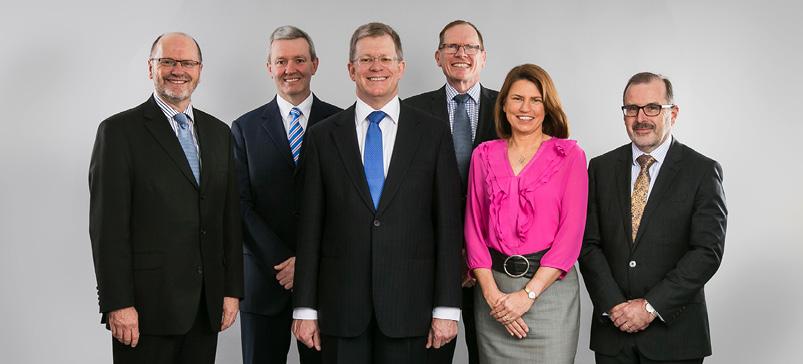
Members of the Executive Leadership Group, left to right: James Carter, Scott Bruckard, Robert Bromwich SC, David Adsett, Gaby Medley-Brown, Shane Kirne. Graeme Davidson not pictured.
Robert Bromwich SC
Commonwealth Director of Public Prosecutions
Robert Bromwich SC was appointed Commonwealth Director of Public Prosecutions following a lengthy legal career in both public and private practice. Robert commenced his career in private practice before specialising in Commonwealth law over a 12 year term at the CDPP in Sydney. He then practised for 15 years as a barrister at the private Bar in NSW where he took silk in September 2009. His private practice experience is diverse and covers investigative powers advice, prosecuting and defending lengthy and complex criminal jury trials, inquests and inquiry work, as well as judicial review proceedings and appeals, and other more general criminal law work. Robert was appointed as Director in December 2012 for a five year term. He has worked to transform the CDPP legal practice through the implementation of a national practice group model based on crime categories, and has instigated the modernisation of support services to underpin the legal practice of the CDPP into the future.
Gaby Medley-Brown
Chief Corporate Officer
Gaby is an accomplished Chief Corporate Officer (CCO) with over five years’ experience in successfully leading all facets of Corporate Services. Gaby’s experience includes the leadership and stewardship of human resources management, information technology and information management, finance, governance audit and risk, property and security services, communication, media, parliamentary services and legal services. Before joining the CDPP, Gaby was Chief Operating Officer at Comcare (2010-2014)—a position she gained after more than 17 years’ designing, implementing and running large information communication technology environments including as the ICT National Operations Manager for Medicare Australia (2005-2010). Gaby is an alumnus of the Harvard Business School’s Advanced Management Program (2013).
Shane Kirne
Deputy Director Commercial, Financial and Corruption
Shane Kirne has been a key member of the CDPP since 1985. As a Federal Prosecutor Shane has had an interesting and diverse career prosecuting crimes against the Commonwealth. Shane has personally handled and/or managed a diverse range of matters, including large and complex drug matters, complex commercial fraud and market manipulation matters, and prosecution of frauds committed against the Commonwealth or by Commonwealth employees, including fraud committed by a member of federal parliament. Shane’s knowledge and experience is highly regarded. He is regularly invited to speak at legal forums to share his knowledge of commercial crimes and their prosecution—inspiring the next generation of lawyers to consider a career specialising in Commonwealth law. Shane holds a Bachelor of Laws [Hons] and a Bachelor of Arts from the University of Melbourne. He is admitted as a Barrister and Solicitor of the Supreme Court of Victoria.
James Carter
Director Revenue and Benefits Fraud
James Carter commenced his legal career at the CDPP as a graduate legal officer in 1987. James prosecuted in the ACT and NSW before moving to national legal, liaison, law reform and practice management roles. James has extensive experience in Commonwealth criminal law and working with partner agencies to successfully investigate and prosecute the wide range of Commonwealth criminal offences. James has contributed to the work of the Australian Law Reform Commission, particularly in relation to the sentencing of federal offenders. James’ experience led to his leadership of the Revenue and Benefits Fraud Practice group. In this role he is responsible nationally for the prosecution of general tax, social security, internal and identity fraud, to protect the integrity of Commonwealth programmes. James has been a member of the Senior Executive of the CDPP since 2004 and a Deputy Director since 2007. James has degrees in Law and Arts from the Australian National University.
Graeme Davidson
Deputy Director of International Assistance and Specialist Agencies
Graeme joined the Attorney-General’s Department in 1980 to work for the Deputy Crown Solicitors Office where he completed rotations in the International Trade Law area and Crown Solicitors Division. After transferring to the Commonwealth Director of Public Prosecutions in 1985 to conduct Australian Capital Territory prosecutions and liaison work, he became responsible for prosecuting corporate crime under the then new Corporations Law Regime (1991). In 2004 Graeme was assigned the international functions of extradition and mutual assistance and was also responsible for overseeing the counter-terrorism function. In 2012 Graeme was invited to be a member of the COAG committee to review counter-terrorism legislation. Graeme underpins his legal career with a Bachelor of Economics/Law from the Australian National University and qualifications from the College of Law in Sydney.
Scott Bruckard
Deputy Director Organised Crime and Counter-Terrorism
Scott has worked as a Federal Prosecutor for over 27 years prosecuting a wide range of crime types. Since 2004 Scott has specialised in the prosecution of counter-terrorism matters. He has managed some of Australia’s largest and high profile cases including the prosecution of Jack Thomas and the numerous prosecutions arising out of AFP Operation Halophyte, Operation Neath and Operation Pendennis — Australia’s largest counter-terrorism police investigation. In Scott’s current portfolio he oversees the delivery of specialist legal services to police and other partner agencies during the course of counter-terrorism and more complex organised crime investigations. Scott has a strong interest in developing better ways to manage large criminal litigation, particularly through more effective partnerships and smarter use of technology. Scott has represented Australia at a number of international counter-terrorism conferences and forums, including at the United Nations in New York and at a Global Counter-Terrorism Forum in Frankfurt. He holds degrees in Arts and Law from the University of Melbourne.
David Adsett
Deputy Director Illegal Imports/Exports and Human Exploitation and Border Protection
David has been a Federal Prosecutor for almost 30 years. During his extensive legal career he has conducted prosecutions for a wide range of Commonwealth offending, including money laundering, tax fraud, commercial fraud, drug importation, people smuggling and terrorism. David’s current portfolio includes child exploitation matters. This involves leading a team of highly skilled lawyers to see offenders brought to justice and potential offenders deterred through effective sentencing. David is a Barrister and holds Law and Arts degrees from the University of Queensland and a Master of Laws degree from the University of Sydney.
We deal with diverse matters reflecting the evolving and expanding nature of offences against Commonwealth law.
Our partnerships
We prosecute in each state and territory—working with 59 investigative agencies across the nation. For details about working with our partners, see Chapter 4: Our Partnerships from page 71.
The prosecution policy
The Prosecution Policy of the Commonwealth applies to all Commonwealth prosecutions. It outlines the principles, factors and considerations our prosecutors must take into account in prosecuting offences against the laws of the Commonwealth.
This policy underpins our decisions throughout the prosecution process and promotes consistency in decision-making. It is available on our website at www.cdpp.gov.au
Two-stage test
The Prosecution Policy of the Commonwealth provides a two-stage test that must be satisfied before a prosecution commences:
- There must be sufficient evidence to prosecute the case.
- It must be evident from the facts of the case, and all the surrounding circumstances, that the prosecution would be in the public interest.
In determining whether there is sufficient evidence to prosecute a case, we must be satisfied that there is prima facie evidence of the elements of the offence, and a reasonable prospect of obtaining a conviction.
In making this decision, our prosecutors must evaluate how strong the case is likely to be when presented in court. They must take into account matters such as the availability, competence and credibility of witnesses, their likely effect on the arbiter of fact, and the admissibility of any alleged confession or other evidence. They also consider any lines of defence open to the alleged offender and any other factors that could affect the likelihood of a conviction.
Our prosecutors also need to consider if any evidence might be excluded by a court. If that evidence is crucial to the case, this may substantially affect the decision whether or not to prosecute. Prosecutors need to look beneath the surface of the evidence in a matter, particularly in borderline cases.
Once satisfied there is sufficient evidence to justify the initiation or continuation of a prosecution, our prosecutors must then consider whether pursuing a prosecution is in the public interest. This involves considering all provable facts and surrounding circumstances. Public interest factors vary from case-to-case and may include:
- whether the offence is serious or trivial
- any mitigating or aggravating circumstances
- the youth, age, intelligence, physical health, mental health or special vulnerability of the alleged offender, witness or victim the alleged offender’s antecedents and background
- the passage of time since the alleged offence
- the availability and efficacy of any alternatives to prosecution
- the prevalence of the alleged offence and the need for general and personal deterrence
- the attitude of the victim
- the need to give effect to regulatory or punitive imperatives
- the likely outcome in the event of a finding of guilt.
All relevant factors are contained in the Prosecution Policy of the Commonwealth.
Generally, the more serious the alleged offence, the more likely the public interest will require a prosecution to be pursued. The decision to prosecute must be made impartially and must not be influenced by any inappropriate reference to race, religion, sex, national origin or political association. The decision to prosecute must not be influenced by any political advantage or disadvantage to the government.
In September 2014 we amended Annexure B of the Prosecution Policy of the Commonwealth. This deals with Immunity from Prosecution in Serious Cartel Offences. The amendment coincided with the release of the Australian Competition and Consumer Commission’s Immunity and cooperation policy for cartel conduct, and streamlines our decision-making about applications for immunity from prosecution under Annexure B.
Links with state and territory Directors of Public Prosecutions
We have arrangements in place with each Director of Public Prosecutions in Australia concerning procedures for conducting trials that involve both Commonwealth and state or territory offences.
The Commonwealth Director of Public Prosecutions can prosecute indictable offences against state and territory laws where the Director holds an authority to do so under the laws of the relevant jurisdiction. In addition, the Director can conduct committal proceedings and summary prosecutions for offences against state or territory law where a Commonwealth officer is the informant.
Liaison between Commonwealth and state prosecuting authorities occurs at both the national and regional level. The Conference of Australian Directors of Public Prosecutions is a forum for Directors to discuss best practice in prosecuting, professional standards, training and liaison.
Another valuable forum is the National Executive Officers’ Meeting of the heads of legal practice and corporate services of Commonwealth, state and territory prosecution services. Through this forum we share information and discuss the management of prosecuting agencies.
Our outcome and programme structure
As set out in government Portfolio Budget Statements, our 2014–15 outcome statement is the intended result, impact or consequences of our actions, while our programme is the way in which we achieve our intended outcome.
Our outcome is:
Maintenance of law and order for the Australian community through an independent and ethical prosecution service in accordance with the Prosecution Policy of the Commonwealth.
Our programme is:
An independent service to prosecute alleged offences against the criminal law of the Commonwealth, in appropriate matters, in a manner which is fair and just and to ensure that offenders, where appropriate, are deprived of the proceeds and benefits of criminal activity.
Other functions
The Director also has a number of miscellaneous functions, including to:
- provide legal advice to Commonwealth investigators
- apply for superannuation forfeiture orders under Commonwealth law.
Social justice and equity
The CDPP advances the interests of social justice and equity by working with partner agencies to enforce criminal law for the benefit of the community. We recognise the importance of adopting the highest professional and ethical standards in prosecutions and in seeking orders under proceeds of crime legislation. The Prosecution Policy of the Commonwealth underpins all the decisions we make throughout the prosecution process and promotes consistency in decision-making (see page 24 for more details).
We work to ensure that alleged offenders and other people affected by the criminal justice process are treated fairly. To support our contribution to the criminal justice system, we take action to promote and maintain an organisational culture that values fairness, equity and respect. We expect conduct from our employees that reflects high ethical standards. We have issued Guidelines on Official Conduct for CDPP employees setting out the ethical standards expected of them. All CDPP employees have signed a copy of this document.
Victims
Traditionally, much of our work has not involved crime directed at individual victims. However, as the nature of Commonwealth crime changes, we are prosecuting an increasing number of matters that involve individual victims of crime. This includes areas such as online child sexual exploitation, child sex offences committed overseas by Australians, human trafficking, servitude and slavery.
Victims of offences against Commonwealth law have an important place in the criminal justice system, and we recognise the importance of providing appropriate support and information to victims participating in the criminal justice process.
Our Prosecution Policy of the Commonwealth states the importance of treating victims with respect and dignity in all prosecution actions. In this context, a victim of crime is an identified individual who has suffered harm as the direct result of an offence or offences committed against Commonwealth law or prosecuted by Commonwealth authorities. ‘Harm’ includes physical or mental injury, emotional suffering and economic loss.
The Prosecution Policy of the Commonwealth provides for the views of any victims—where those views are available, and where it is appropriate—to be considered and taken into account when deciding whether it is in the public interest to:
- commence a prosecution
- discontinue a prosecution
- agree to a charge negotiation
- decline to proceed with a prosecution after a committal.
The Prosecution Policy of the Commonwealth also requires us to comply with our Victims of Crime Policy in our dealings with victims.
We have produced documents about the prosecution process that may be of assistance to victims, such as a step-by-step guide to the prosecution process, a guide to witnesses giving evidence in court, a glossary of commonly used terms, and questions and answers for victims and witnesses.
Witness Assistance Service
Our Witness Assistance Service (WAS) is a national service provided out of our Sydney office. This service ensures we provide appropriate information and support to the most vulnerable victims and witnesses involved in matters we prosecute.
WAS Referral Guidelines, contained in a National Legal Direction, require that all identifiable child victims and victims of slavery, sexual servitude and forced marriage offences are referred to the WAS. The aim is to ensure the most vulnerable victims of Commonwealth crime are treated in an appropriate and consistent manner.
During the reporting period, the WAS received its 1000th victim/witness referral since it was established in late 2008. These referrals have included over 300 children and young people, the majority of whom have been involved in online child exploitation offences.
Our WAS staff provide a range of information and support services including updates on the progress of a prosecution, general information about the prosecution process, court tours, referrals to support services, support at court and during conferences with legal staff and information concerning victim impact statements.
Resources for victims including WAS Referral Guidelines are available on our website at www.cdpp.gov.au.
Business regulation
We have no direct role in business regulation other than to prosecute criminal offences in appropriate cases. Our activities in the area of commercial, financial and corruption prosecutions are reported in Chapter 3: Our National Practice Groups of this report.
Public comment
Any person is free to write to us at the addresses shown at the back of this report. Alternatively, they can email any comments, suggestions or queries about the Office of the CDPP and our functions to inquiries@cdpp.gov.au.
2 OUR NATIONAL PRACTICE AREAS


Supporting our legal practice
Our organisation is structured to support our national legal practice. Our Director is supported by the Director’s Coordination Unit which provides a range of strategic and liaison services.
For our national legal practice groups, relevant committees have been established to provide oversight and encourage best practice, while a communication team has been established to raise the profile of the CDPP. It has become increasingly important to publicise our successful prosecution outcomes to raise the profile of the work of the CDPP and send a strong message of deterrence.
Behind the scenes, our information technology and information management teams have taken steps to modernise our systems and processes.
These different aspects of our national practice work together to contribute to a high performing CDPP.
National practice groups
Embedding our national practice group model this year has enabled us to further build our expertise, ensure national consistency, and be more responsive to the priorities of investigation agencies.
The benefits include improved information sharing around the country, established networks for prosecutors working in specialised areas, provision of online legal resources for our staff and our partner agencies and nationwide meetings.
The national practice group model also enables us to work more efficiently with specialist agencies that provide fewer referrals.
Our prosecutors appear in all levels of the courts around Australia at all stages of the prosecution process. We carry out this work through six national practice groups based on compatible crime types. Refer to table 1 on page 31.
Practice Group Leaders
Each Deputy Director is a Practice Group Leader for particular crime types covered by their practice group across Australia. In 2014–15 one Practice Group Leader was responsible for two practice groups following a reduction in the total number of Practice Group Leaders from six to five. The Practice Group Leaders deal with a broad range of legal, policy and liaison responsibilities in relation to the prosecution work of their practice group. This includes providing legal and strategic advice in significant and sensitive prosecutions; responsibility for national liaison with partner agencies; coordinating the review of national policies and issuing guidelines relevant to the work of the practice group.
The Practice Group Leaders also provide high-level legal advice to the Director on matters within their practice groups and the exercise of the Director’s statutory functions in accordance
with the Prosecution Policy of the Commonwealth. Statutory functions include consideration of no Bills, ex officio indictments, appeals against sentence, reference appeals, conspiracy consents and taking over and discontinuing prosecutions. Responsibility for a number of statutory functions has been delegated to Practice Group Leaders or senior staff within a practice group and this is supporting efficient and effective decision making in the course of litigation.
Feedback from our partner agencies indicates that these are welcome changes and have contributed to improving collaborative efforts.
| Commercial, Financial and Corruption | Revenue and Benefits Fraud |
|---|---|
|
|
| International Assistance and Specialist Agencies | Organised Crime and Counter–Terrorism |
|---|---|
|
|
| Illegal Imports and Exports | Human Exploitation and Border Protection |
|---|---|
|
|
Director’s Coordination Unit
The Director’s Coordination Unit is responsible for developing organisational strategy and planning to support the effective and efficient delivery of prosecutorial services and to advise the Director on national issues that fall outside the practice group areas. It also provides coordination support to the Deputy Directors in their capacity as Practice Group Leaders.
In practical terms the Director’s Coordination Unit is responsible for:
- providing legal and other support to the Director
- contributing to the executive management and governance of the CDPP
- developing internal and external policies relating to legal work within the CDPP
- providing legal and strategic advice in significant and sensitive matters and independent assessment and input
- managing delegations and authorisations in the legal area and Joint Trial arrangements with the states and territories in jointly prosecuting Commonwealth and state offences
- contributing to and progressing law reform proposals which have general CDPP application and do not exclusively fall within a particular practice group’s area of responsibility.
Federal Counsel Group
As part of the move to a national practice group model, we established a national specialist in-house advocacy programme for the CDPP, called the Federal Counsel Group.
The programme comprises a specialist group of advocates capable of regularly conducting federal criminal jury trials, superior court appeals and other more challenging and complex appearance work that would otherwise be briefed to the private bar.
Staff participating in the programme initially commit to a three-year term to develop the skills necessary to carry out this complex work.
The programme generates financial savings for the CDPP and promotes the development of highly specialised advocacy skills offering staff a specialist career path.
Communications and engagement
During the reporting period we established a Communications Team and the necessary framework to strengthen and support a more proactive approach to CDPP communications and community engagement.
Promoting joint outcomes
The Communications Team has connected with counterparts in partner agencies to proactively contribute to taskforce-specific initiatives and collaborate when prosecutions attract media attention. This has included promoting the outcome of coordinated investigation and prosecutions as an important way of communicating with the public.
We publish case reports highlighting the areas of practice as a valuable resource reflecting the diversity of our work across jurisdictions and practice areas. These reports are on our website at www.cdpp.gov.au.
Working with the media
The CDPP recognises the importance of working to improve community awareness of our work and the important role we play in the justice system. We manage daily media enquiries from national media, and at times international media. We have established effective processes to support accurate reporting of prosecution outcomes.
Digital communication platform improvements
Promoting prosecution outcomes to educate the community about the serious consequences for individuals convicted of crimes committed against the Commonwealth sends a strong message that serious crime will not be tolerated.
Recognising the importance of this, we enhanced the CDPP website to promote popular content and case studies. We will make further improvements to the website as an important channel to reach the general public.
Information management support services
Information technology
Our computing environment comprises a national network covering all CDPP offices across the country. During the reporting period we commenced a full review of our information technology capability to:
- benchmark the level and cost of existing services
- assess the readiness of the computing environment for our future requirements including:
- mobile computing
- legal case management
- financial, and human resources management and payroll systems
- develop a strategy towards right-sourcing computing in accordance with the Australian Government Cloud Computing Policy—Smarter ICT Investment.
We also made significant progress in other areas this year including:
- restructuring our information technology resources
- modernising all second tier computing equipment to ensure full compliance with Information Security Management standards by the end of 2015
- enhancing internal video conferencing
- implementing a strategy to migrate the CDPP to digital information and records management for efficiency purposes under the Australian Government Digital
Transformation Policy.
Information management
Our library and records management service is governed by the CDPP Library Strategic Directions and Information Asset Policy. This ensures that our federal prosecutors have high-level legal research support and access to an extensive range of online services and print materials to keep them up-to-date about legal developments and legislative changes.
Our prosecutors appear in all levels of courts around Australia at all stages in the prosecution process.
3 OUR NATIONAL PRACTICE GROUPS



Commercial, Financial and Corruption
The Commercial, Financial and Corruption Practice Group Leader is Shane Kirne, Deputy Director.
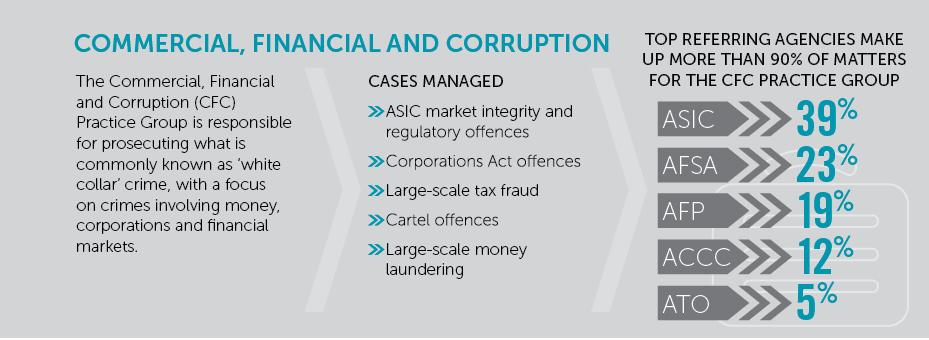
This practice group is responsible for prosecuting the more complex cases of ‘white collar’ crime, with a focus on crimes involving money, corporations and financial markets. This includes:
- all referrals from the Australian Securities and Investments Commission (ASIC), from market integrity offences such as insider trading and market manipulation, to breaches of directors/officers’ duties, dishonest conduct by financial service providers and many regulatory offences
- all referrals from the Australian Competition and Consumer Commission (ACCC), including serious cartel offences (for example, where businesses agree with their competitors to fix prices, rig bids, share markets or restrict outputs for goods or services)
- all referrals from the Australian Prudential Regulation Authority (APRA)
- complex and large-scale tax fraud, often involving international transactions and opaque corporate structures such as those previously investigated under Project Wickenby
- large-scale finance-related money laundering (often associated with major tax fraud)
- bribery of foreign public officials, abuse of public office and other major corruption cases involving Commonwealth public officials.
Typically, we prosecute offences under the Criminal Code (Cth), the Corporations Act 2001, the Australian Securities and Investments Commission Act 2001, the National Consumer Credit Protection Act 2009, the Competition and Consumer Act 2010, and related state or territory offences. These types of offences can be very difficult to detect, investigate and prosecute but they can have devastating financial and personal consequences for individuals, businesses and indeed communities.
Early engagement
The Commercial, Financial and Corruption Practice Group prosecutes many of the most complex matters we deal with. As a result an important part of our work is pre-brief advice to investigating agencies on matters such as the elements of an offence, evidentiary issues or potential further lines of inquiry. This helps to ensure that investigations
are conducted in a strategic, efficient and effective manner.
There is a growing trend for some agencies to refer matters to us before a full brief of evidence has been compiled, to explore whether an accused person is willing to enter an early plea of guilty and, if so, to identify charges which adequately reflect the criminality alleged. Where appropriate, the early resolution of matters can result in significant savings of time and money for the Government and the community.
Practice Group structure
As at 30 June 2015 the Commercial, Financial and Corruption Practice Group comprised two branches—one in Sydney and one in Melbourne—which dealt primarily with the work of the practice group. Other offices across Australia that receive and conduct Commercial, Financial and Corruption Practice Group work as required are located in Adelaide, Brisbane, Canberra, Hobart and Perth.
Partner agencies
Partner agencies that refer work to the Commercial, Financial and Corruption Practice Group are the Australian Crime Commission, the Australian Competition and Consumer Commission, the Australian Federal Police, Australian Prudential Regulation Authority, Australian Securities and Investments Commission, and the Australian Taxation Office. This is also the lead Practice Group for all national liaison with the Australian Crime Commission, the Australian Competition and Consumer Commission, and the Australian Prudential Regulation Authority.
Developments this year
Project Wickenby
We have played a central role in advising investigative agencies and prosecuting matters referred under Project Wickenby since it was established in 2006. This Commonwealth cross-agency taskforce focused on complex tax fraud with offshore elements. After nine years, the allocation of special funding for Project Wickenby came to an end on 30 June 2015.
In its final year, Project Wickenby continued to deliver results. We received one new matter, completed 14 and ended the year with 19 matters open/ongoing. A total of 61 people have been committed to trial for indictable offences to date, with 46 convicted of one or more indictable offences, all receiving a custodial sentence.
For more details about the Wickenby legacy, see the case study on page 80.
Serious Financial Crime Taskforce
During the year the Government announced the multi agency Serious Financial Crime Taskforce, which will lead the Commonwealth operational response to high priority serious financial crimes from 1 July 2015. Ongoing Wickenby prosecutions will be managed within the Serious Financial Crime Taskforce.
The overall objective of the new taskforce is to maintain integrity and community confidence in the Australian economy, financial markets, regulatory framework and collection of revenue. The taskforce includes the Australian Federal Police, Australian Taxation Office, Australian Crime Commission, Attorney-General’s Department, Australian Transaction Reports and Analysis Centre, Australian Securities and Investments Commission, and Australian Customs and Border Protection Service and the CDPP.
Key priorities over the next two years include investigations into serious offshore tax evasion, and criminality related phoenix activity and trusts.
Foreign bribery
We are currently prosecuting two matters relating to allegations of foreign bribery, contrary to section 70.2 of the Criminal Code.
The first matter relates to an allegation that individuals associated with two companies—Securency International Pty Ltd (a company half owned by the Reserve Bank of Australia) and Note Printing Australia (a company wholly owned by the Reserve Bank of Australia)—used agents to bribe foreign officials in various countries that purchased polymer substrate for the manufacture of bank notes, from as far back as 1999. These allegations have been widely reported in the media. However, because the prosecution is ongoing and various suppression orders apply, it is not appropriate for us to report further.
The second matter relates to an allegation of foreign bribery in connection with large, government-funded construction projects in Iraq.
Immunity framework for serious cartel conduct
Annexure B of the Prosecution Policy of the Commonwealth outlines our policy in considering applications for immunity from prosecution by parties implicated in a serious cartel offence, who meet the criteria for conditional immunity under the Australian Competition and Consumer Commission’s Immunity and cooperation policy for cartel conduct. A serious cartel offence refers to the offences in sections 44ZZRF and 44ZZRG of the Competition and Consumer Act 2010 and the corresponding offences in the state and territory Competition Codes.
Our policy is based on the Government’s recognition that, regarding serious cartel offences, it is in the public interest to offer immunity from prosecution to a party who is willing to be the first to break ranks with other cartel participants by exposing the illegal conduct and fully cooperating with us and with the Australian Competition and Consumer Commission.
In September 2014, we amended Annexure B to streamline our internal processes for dealing with immunity applications. Previously, all parties who met the criteria for criminal immunity under Annexure B were provided with a written undertaking under s9(6D) of the Director of Public Prosecutions Act 1983 (DPP Act). The amendment means that from September 2014, the Deputy Director (Commercial, Financial and Corruption) would first issue a ‘letter of comfort’ then, before commencing any prosecution, the Director would grant a formal undertaking pursuant to section 9(6D) of the DPP Act.
The impact of the decision in Lee
On 21 May 2014 the High Court delivered its judgment in the matter of Lee v R (2014) 253 CLR 455; [2014] HCA 20. The issue in Lee was that, prior to trial, the appellants were compulsorily examined by the New South Wales Crime Commission about matters directly relating to criminal charges then pending against them, as well as matters relating to serious drugs charges that were also anticipated. The appellants were subsequently convicted of those charges. On appeal, the High Court held that the dissemination of the examination material to the prosecution was, in the circumstances, unlawful and had fundamentally altered the trial of the appellants. The High Court ordered the appellants’ convictions be quashed and a new trial be held.
This decision has raised important questions about the scope of similar compulsory powers vested by legislation in a number of Commonwealth investigating agencies, such as the Australian Crime Commission and the Australian Securities and Investments Commission, and when material obtained or derived from exercising those powers can be lawfully disseminated to the prosecution team.
The resulting legal uncertainty has generated a large number of defence challenges, including applications for temporary and permanent stays of prosecutions. Meeting these challenges has been resource intensive for the Commercial, Financial and Corruption Practice Group, leading to considerable delays in many matters.
In response to some of the issues raised by Lee, Parliament enacted the Law Enforcement Legislation Amendment (Powers) Act 2015, which commenced on 28 July 2015, just outside the reporting period. We were consulted in the drafting process for this Act.
Policy engagement and law reform
During the reporting period the Commercial, Financial and Corruption Practice Group participated in a number of significant law reform and broader policy processes, including:
- the drafting of the Law Enforcement Legislation Amendment (Powers) Act 2015, referred to above
- the Senate Legal and Constitutional Affairs Legislation Committee’s Inquiry into the Law Enforcement Legislation Amendment (Powers) Bill 2015
- the five-year independent review of the Australian Crime Commission
Act 2002 - Australia’s response to the Organisation for Economic
Co-operation and Development (OECD) Working Group on Bribery’s Phase 3 Report on Implementing the OECD Anti-bribery Convention
in Australia - a proposal to introduce a new Commonwealth offence of false accounting to strengthen Australia’s legislative framework for dealing with foreign bribery
- the Government’s response to the Final Report of the Competition Policy Review (‘Harper Review’), which recommended simplifying and narrowing the cartel offences in the Competition and Consumer Act 2010.
We were also consulted by the Australian Competition and Consumer Commission about the changes to its Immunity and Cooperation Policy for Cartel Conduct, referred to above. In addition, the Practice Group Leader delivered numerous seminars to whole-of-government and public audiences on issues of Commonwealth law and policy arising within the practice group.
International assistance and engagement
The Director, Robert Bromwich SC, attended the International Competition Network Annual Meeting, hosted by the Australian Competition and Consumer Commission, from 28 April to 1 May 2015 in Sydney. During the meeting, the Director also met with counterparts from the United States and Canada to discuss international prosecution policy and practice regarding serious cartel conduct.
Assistant Director, Ms Carolyn Davy, presented at the Judges Dialogue on Anti-Money Laundering held from 19 to 21 May in Medan, Indonesia. The Dialogue was co-hosted by the Australian Attorney-General’s Department and the Indonesian Corruption Eradication Commission. It focused on anti-money laundering and asset recovery in the context of corruption investigations and prosecutions.
The Commercial, Financial and Corruption Practice Group is responsible for prosecuting what is typically referred to as ‘white collar’ crime. They focus on crimes involving money, corporations and financial markets.
CASE STUDY
PRISON FOR DUO BEHIND $7 MILLION INSIDER TRADING CASE
Former banker, 26-year-old Lukas Kamay and former Australian Bureau of Statistics worker, 25-year-old Christopher Hill have both been sentenced to significant gaol terms for their roles in what is one of the biggest insider trading cases in Australian history—worth over $7 million in illegal foreign exchange trades.
The plan
Kamay and Hill met in 2007 at Monash University in Victoria where they were studying commerce and economics. They both graduated in 2011.
In 2013, during a casual catch up at a Fitzroy North pub, Hill agreed to use his position at the Australian Bureau of Statistics (ABS) in Canberra to send Kamay sensitive and unpublished ABS main economic indicators. This data about Australia’s labour force, retail trade, building approvals and private expenditure is inside information not generally available to the public until official publication.
The plan was simple and followed a similar pattern each time. Hill obtained the ABS economic indicator information in his capacity as a Commonwealth public official. He accessed the data within the ABS, recorded the data in handwritten notes, and removed it from the ABS. Hill would then pass the key or main economic indicator information to Kamay via their mobile phones.
Kamay traded on the foreign exchange (FX) derivatives market, using the information not generally available to the wider public. This had a material effect on the price or value of the foreign exchange derivative contracts when the information became public.
The pair knew this information could make them a lot of money. The plan was to make around $200,000 profit, but Kamay ended up concealing millions.
Unknown to Hill, Kamay set up three secret trading accounts and made more than $7 million.
Fearing detection, Kamay attempted to conceal his offending by losing money on some occasions.
In April 2014, he successfully bid $2,375,000 at auction for a three-bedroom Albert Park loft featured on the Channel 9 TV series, The Block. However, the settlement on this property never occurred and the proceeds action ended in a forfeiture order by consent concerning the assets in Kamay’s accounts and other properties.
The investigation and prosecution
The Australian Federal Police and Australian Securities and Investments Commission launched a joint investigation on 21 February 2014. The investigation culminated on 9 May 2014, with both men arrested.
On 10 and 11 December 2014 Kamay and Hill appeared before Justice Hollingsworth in the Supreme Court of Victoria in Melbourne. Kamay pleaded guilty to seven charges, while Hill pleaded guilty to six charges.
Kamay was sentenced to seven years and three months imprisonment with a non-parole period of four and a half years. Hill was sentenced to three years and three months with a non-parole period of two years.
Australian Statistician, David W. Kalisch acknowledged the significant effect the event has had on the ABS. He said, ‘The ABS commends the collaborative work undertaken by the CDPP, ASIC and the AFP fraud and anti-corruption team on the diligence and professionalism they brought to this investigation. It is reassuring that they have the will and the capacity to detect, investigate, and prosecute those involved in such a major betrayal of trust.‘
‘The incident was the first time in the ABS’ 100 year history that a staff member had been arrested for leaking statistics. We subsequently commissioned a thorough review of our security controls and strict embargo procedure with recommendations implemented to ensure we were doing all we could to avoid the possibility of recurrence. The ABS has shared these learnings with a number of APS agencies as we work together to deal with these complex matters and we continue to foster a strict security culture.’
In sentencing Kamay, Justice Hollingworth said ‘The gross profit you made is, by a very considerable margin, the largest insider trading profit to come before an Australian court. Apart from your early plea of guilty, Mr Kamay, and some very minor allowance for your age and immaturity, there is relatively little that can be said by way of mitigation. The CDPP was right to describe your conduct as the worst instance of insider trading to have come before the courts in this country’.
The Commonwealth Director of Public Prosecutions, Robert Bromwich SC, who appeared for the Crown at the sentencing hearing, said offences that undermine the integrity of the market are serious crimes warranting substantial gaol sentences.
‘This was deliberate and planned, and all underpinned by personal greed at every stage. The sentence imposed will encourage and support the people who do the right thing, as well as discouraging those who might be tempted to do the wrong thing,’ said Mr Bromwich.
Lukas Kamay has appealed against the severity of his sentence. The appeal is yet to be finalised.

Revenue and Benefits Fraud
The Revenue and Benefits Fraud Practice Group Leader is James Carter, Deputy Director.
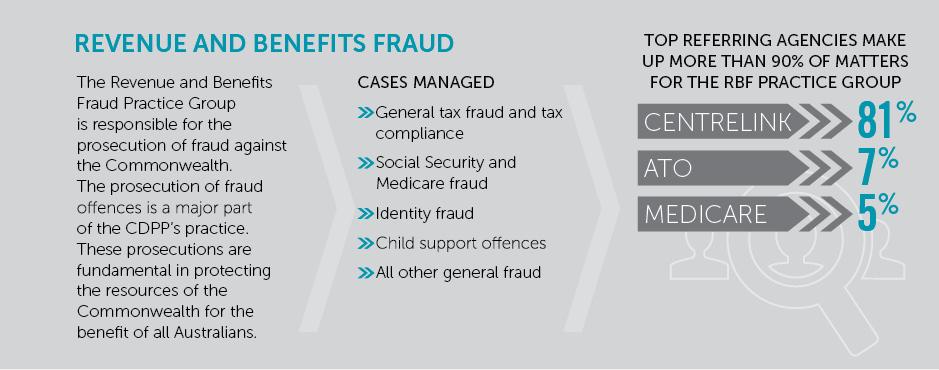
This practice group is generally responsible for prosecuting fraud against the Australian government, including general tax fraud, social security fraud, Medicare fraud, and identity fraud. The Revenue and Benefits Fraud Practice Group is also responsible for prosecuting fraud-related money laundering, counterfeit currency and child support offences.
Prosecuting fraud offences is a major part of the CDPP’s overall practice. These prosecutions are fundamental in protecting the resources of the Commonwealth for the benefit of all Australians.
Fraud prosecutions are diverse—fraud can be committed in numerous ways and span the broad range of Commonwealth programmes and assistance available to the Australian community, as well as the Australian taxation system. Frauds can range from making false statements to sophisticated and highly structured offending designed to evade tax obligations.
Commonwealth revenue and benefit systems rely heavily on the integrity and honesty of all Australians. Government agencies increasingly interact with customers through online services. Innovations have enabled customers to claim benefits and provide information through technology, such as voice recognition systems, mobile apps and electronic facilities. As a consequence, a large proportion of revenue and benefits fraud is now committed online. This has changed the evidence involved in prosecuting fraud offences, as there is now considerably less reliance on paper records. Evidence of electronic systems and their operation form an important part of briefs of evidence.
General deterrence is particularly important when considering the prosecution of revenue and benefits fraud and is fundamental in protecting these systems and public resources.
Prosecutions may involve significant sums of money, particularly where there has been a continuing fraud over many years or use of multiple identities or benefits. Prosecutions can be complex and demanding, and involve technical evidence from our partner agencies about the operation of their electronic systems to support and explain the evidence necessary to prosecute. We work closely with our partner agencies to seek to achieve best practice in investigating and prosecuting in this important area.
The Revenue and Benefits Fraud Practice Group has a strong strategic focus on active prosecution at all stages—through early engagement, assessment and the conduct of matters through court.
Revenue fraud
Prosecuting tax frauds continued to be a significant part of our practice this year. As in previous years, there were a significant number of fraud cases relating to income tax and the goods and services tax (GST). We prosecute tax frauds referred by the Serious Non-Compliance area of the Australian Taxation Office as well as the Australian Federal Police.
The GST is a key element of the Australian tax system. Prosecutions relating to GST vary in sophistication from small-scale fraud to large, complex schemes. By prosecuting people who exploit that system—for example, by failing to report cash income they receive or by falsifying claims for GST credits—we help to maintain acceptable levels of voluntary compliance with tax laws.
Benefits fraud
The Department of Human Services provides a range of health, social and welfare payments and services including through Centrelink, Medicare and Child Support. Of all our partner agencies, this department refers the largest number of briefs to the CDPP.
Our prosecutions play an essential role in protecting Commonwealth resources and ensuring support is provided where it is most needed in our community. Briefs typically relate to allegations that people have intentionally engaged in conduct and, as a result, received social, health or welfare services or payments they knew they were not entitled to.
Centrelink prosecutions typically involve a person receiving benefits that have been calculated on a false premise. For example, a person might say they are unemployed when, in fact, they are receiving income from paid employment or they might fail to advise the department that they have become a member of a couple. Cases can also involve fraud where someone has received benefits on behalf of a person who has died, or where someone uses multiple identities to obtain multiple benefits.
Child Support fraud includes claims for child support by someone who is not entitled to that support, parents who do not correctly declare their income or relationship status, and employers who fail to deduct an amount from a paying parent’s salary or wage or fail to forward an amount that has been deducted.
Medicare fraud may involve claims for services that were not provided. This can involve a person using their own name to claim services from, or service providers or their employees using patients’ identities to make fraudulent claims. We have established a national Medicare Focus Group to consider the specific issues raised by this practice area, in addition to our Focus Groups for Centrelink and Taxation matters.
Practice Group structure
The Revenue and Benefits Fraud Practice Group comprises three branches, one in Sydney, one in Brisbane and a third that operates across our Townsville, Cairns and Darwin offices. Revenue and benefits fraud cases are, however, conducted across all our offices around Australia, and each office strongly contributes to the Revenue and Benefits Fraud Practice Group.
Partner agencies
Over the past year our Revenue and Benefits Fraud Practice Group has engaged with agencies to advance their enforcement strategies and consider longer-term strategic issues. We have strengthened liaison and coordination arrangements with partner agencies and increased informal liaison.
This is the lead practice group for all liaison with the Australian Taxation Office and the Department of Human Services, also working closely with the Australian Federal Police.
In addition, this practice group liaises with and conducts prosecutions referred by:
- the Department of Social Services, which is responsible for programmes relating to families and children, housing support, disability and carers, employment services, childcare and senior citizens and government grants for specific purposes
- the Department of the Prime Minister and Cabinet, which has primary responsibility for Indigenous affairs and most Commonwealth Indigenous-specific policy and programmes
- the Department of Veterans’ Affairs, which refers briefs of evidence relating to a range of fraudulent activity, including claiming benefits to which one is not entitled, fraud through over-servicing by service providers, and deceased beneficiary cases.
This year the Revenue and Benefits Fraud Practice Group also established new liaison relationships with the Australian Federal Police Fraud and Anti-Corruption Centre and the National Disability Insurance Agency.
The Revenue and Benefits Fraud Practice Group is responsible for prosecuting fraud against the Australian Government. Crimes include general tax fraud, social security fraud, Medicare fraud, and identify fraud.
International Assistance and Specialist Agencies
The International Assistance and Specialist Agencies Practice Group Leader is Graeme Davidson, Deputy Director.
This practice group deals with offences against a wide array of Commonwealth laws, with specific responsibility for engaging with specialist Commonwealth agencies and international assistance.
International assistance (including mutual assistance and extradition)
International assistance is an important tool in the successful prosecution of transnational crime. Serious offences such as terrorism, people smuggling, drug trafficking, human trafficking and slavery type offences, bribery of foreign officials, money laundering and offences relating to child exploitation and abuse material, often have an international aspect and require international assistance for effective investigation and prosecution.
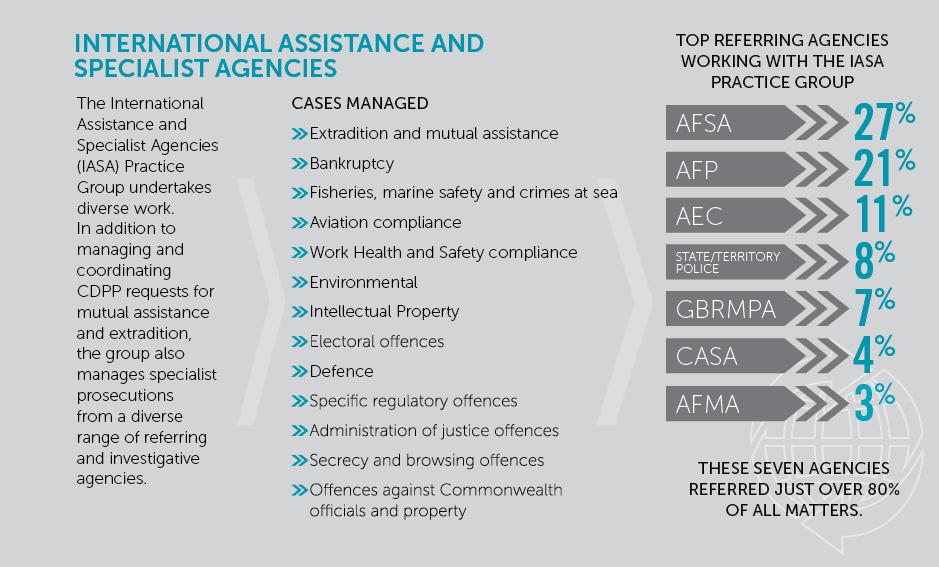
We seek cooperation from other countries to assist in the prosecution of transnational crime and to apprehend and extradite fugitives. While the Attorney-General’s Department has primary responsibility for these areas as Australia’s central authority for extradition and mutual assistance in criminal matters, we play an important role in assisting with requests.
Based on our expertise and practical experience in prosecuting, we also contribute to legal capacity programmes to strengthen effective investigation and prosecution of criminal activities such as people smuggling, human trafficking and terrorism. This contribution can be important in building international and regional links in the context of the increasingly transnational nature of criminal activity.
Mutual assistance
Mutual assistance is a formal process used by countries to assist each other to investigate and prosecute criminal offences and recover the proceeds of crime.
The formal mutual assistance regime runs parallel with the less formal system of international cooperation between investigating agencies, known as ‘agency-to-agency’ assistance. Formal mutual assistance channels are used when the request for assistance involves the use of coercive powers or when the material requested needs to be in a form that is admissible in criminal proceedings.
The mutual assistance regime rests on a network of international relations and obligations together with the willingness of participating countries to provide assistance to each other. This international network is underpinned by a number of bilateral treaties and multilateral conventions.
Australia has ratified 29 bilateral mutual assistance treaties and a number of multilateral conventions, which bind the signatories to provide mutual assistance to each other. These include the:
- United Nations Convention against Illicit Traffic in Narcotic Drugs and Psychotropic Substances
- United Nations Convention against Transnational Organised Crime
- Convention on Laundering, Search, Seizure and Confiscation of the Proceeds of Crime.
Countries that are not signatories to mutual assistance treaties or conventions may also request mutual assistance from, and provide mutual assistance to, each other. This is done under the principle of reciprocity, where countries agree to assist each other on a case-by-case basis on the understanding that each will receive similar assistance in return.
We are responsible for drafting mutual assistance requests to foreign countries to support Australian criminal proceedings for federal offences where charges have been laid against the alleged offender. By arrangement with the Attorney-General’s Department, in drug-related matters we provide detailed information to the department to facilitate mutual assistance requests. This year we were involved in the preparation of 82 outgoing requests made by Australia to 27 foreign countries in relation to matters where charges were laid by a Commonwealth investigative agency or where we received specific funding to draft mutual assistance requests in respect of a particular matter or type of matter. These outgoing requests were generally made in conjunction with Commonwealth investigative agencies or joint taskforces comprising law enforcement officers from Commonwealth, state and territory agencies.
Extradition
Extradition is a formal process where offenders who are outside the jurisdiction are returned to the country requesting extradition to be prosecuted or serve a sentence of imprisonment. Extradition is an important and effective mechanism in law enforcement.
The Attorney-General’s Department has sole responsibility for international extradition for all countries except New Zealand. Our role in extradition encompasses requesting that extradition be sought in Commonwealth matters and the execution of incoming requests from New Zealand.
In the case of outgoing extradition requests, we prepare documents in support of requests for extradition in serious cases where a person is wanted for prosecution for an offence against Commonwealth law or to serve a sentence of imprisonment, and is found to be in a foreign country.
Outgoing requests
During the reporting year we asked the Attorney-General’s Department to make four extradition requests to foreign countries in relation to prosecutions we were conducting. Two people were surrendered to Australia during the year as a result of extradition requests made in previous years. A further 10 requests from previous years are ongoing, including one request to New Zealand.
Incoming requests
Requests from New Zealand are made on a police-to-police basis, and are referred to us by the Australian Federal Police. We appear on behalf of New Zealand in extradition proceedings before a Magistrate to determine whether a person will be surrendered, and in any review or appeal arising from those proceedings.
In the past year we appeared on behalf of New Zealand in relation to an ongoing matter. Those proceedings resulted in the person being surrendered to New Zealand.
Specialist agencies
The specialist agencies aspect of this practice group’s work arises out of the breadth of Commonwealth criminal legislation. The CDPP receives referrals from a wide variety of partner agencies whose work does not fall within the specific crime types covered by our other practice groups.
Much of this work is specialised in nature and compliance-focused. We recognise the importance of these partner agencies by allocating their work to a dedicated practice group. Our International Assistance and Specialist Agencies Practice Group receives referrals from specialist agencies in relation to:
- Aboriginal and Torres Strait Islander corporations
- administration of justice offences
- aviation compliance
- bankruptcy
- communications
- defence
- electoral offences
- enforcement power prosecutions
- environmental
- fisheries
- high-profile, less serious offences
- intellectual property
- marine safety
- offences against Commonwealth officials and property
- offences relating to the administration of government
- occupational health and safety
- secrecy and browsing offences
- therapeutic goods.
An advantage of this practice group’s focus on these offences is that prosecutors develop expertise dealing with these specialised crime types.
Freedom of information
The International Assistance and Specialist Agencies Practice Group coordinates our proceeds of crime work and our obligations under the Freedom of Information Act 1982. The practice group is responsible for general freedom of information (FOI) policy and reporting work. During the year, responsibility for responding to FOI requests, and FOI decision-making was delegated to designated FOI officers in each regional location.
Proceeds of crime
Following the establishment of the Australian Federal Police-led Criminal Assets Confiscation Taskforce (the taskforce) in January 2012, our role in criminal confiscation under the Proceeds of Crime Act 2002 (POC Act 2002) was, by agreement, limited to taking criminal confiscation action in matters where restraint of property is not required to preserve the property for confiscation and the person is convicted of an offence. The International Assistance and Specialist Agencies Practice Group coordinates our ongoing role.
The practice group also coordinates our approach to matters under the old Proceeds of Crime Act 1987 (POC Act 1987) as these matters do not fall within the responsibility of the Criminal Assets Confiscation Taskforce.
Practice Group structure
The IASA Practice Group is led by Graeme Davidson, Deputy Director, with branches from the Australian Capital Territory and southern New South Wales prosecution group, the Hobart office and the Adelaide office. As the IASA Practice Group does not have branches in every CDPP regional office, as required, specified branches in our offices have previously been allocated IASA work. However, during the year, a refinement to the IASA Practice Group model occurred with matters now being centrally referred to the Canberra/Hobart Branch, Adelaide Branch and Townsville Office.
The new model takes advantage of the efficiencies that come from closer specialisation and improves the consistency and quality of our work.
Partner agencies
As noted, we work with a wide range of specialist agencies. Our strategy is to foster expertise in specialist agency matters and enhance our liaison with them, to work more efficiently and effectively to assist these agencies in achieving their strategic objectives. The agencies include:
- Australian Bureau of Statistics
- Australian Commission for Law Enforcement Integrity
- Australian Communications and Media Authority
- Australian Electoral Commission
- Australian Fisheries Management Authority
- Australian Federal Police and state and territory police
- Australian Financial Security Authority
- Australian Maritime Safety Authority
- Australian Prudential Regulation Authority
- Australian Pesticides and Veterinary Medicines Authority
- Civil Aviation Safety Authority
- Clean Energy Regulator
- Comcare
- Department of the Environment
- Department of Health
- Department of Industry and Science
- Department of Employment
- Department of Education and Training
- Department of Defence
- Great Barrier Reef Marine Park Authority
- National Measurement Institute
- National Offshore Petroleum Safety and Environmental Management Authority
- Office of the Director of Military Prosecution
- Office of the Registrar of Indigenous Corporations
- Therapeutic Goods Administration.
The International Assistance and Specialist Agencies Practice Group deals with offences against a wide range of Commonwealth laws. They work with specialist Commonwealth agencies and manage international assistance—including mutual assistance and extradition.
Organised Crime and Counter-Terrorism
The Organised Crime and Counter-Terrorism Practice Group Leader is Scott Bruckard, Deputy Director.
Counter-terrorism work
There was a steep increase in the number of terrorism matters referred to the CDPP in 2014–15. A number of those referrals related to local residents who had allegedly undertaken preparations for armed hostilities in Syria or Iraq, or who had allegedly supported others known to be fighting in those locations. Other referrals alleged that persons had knowingly provided support or resources to prescribed terrorist organisations. A number of these matters have resulted in prosecutions that are now before the courts. We are also prosecuting several local residents charged with undertaking preparations for, or planning, acts of terrorism in Australia. For the first time, one of these matters commenced before the Children’s Court. Community safety remains a paramount consideration in the management of these matters.
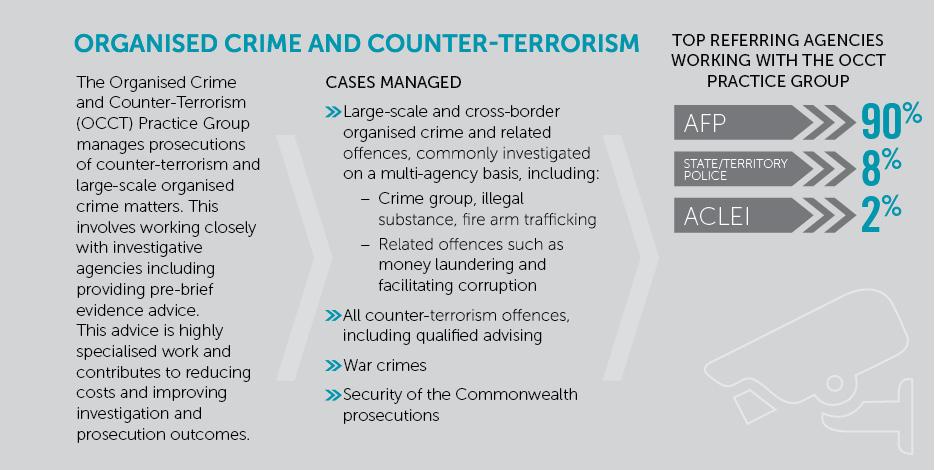
Not all of the terrorism-related matters referred to the CDPP for evaluation and legal advice result in a prosecution. We play an important role in independently assessing the evidence available in each case to determine whether sufficient evidence exists to sustain a prosecution in accordance with the Prosecution Policy of the Commonwealth.
However, our role is much broader than that. Our specialist counter-terrorism Federal Prosecutors actively support police and other partner agencies during the investigation phase of terrorism matters. The unique nature of these crimes requires police to seek the assistance of specialist federal prosecutors very early in an investigation. Australia’s counter-terrorism laws are designed to create criminal liability at a much earlier stage than for other crime types. While this unique feature helps protect the community from harm that could result from a terrorist act, the application of these offences is more challenging than traditional crime types. Independent advice from specialist counter-terrorism prosecutors helps police identify and fill deficiencies in evidence. It also helps police determine when there is sufficient evidence to make an arrest. This advice may also enable police to quickly terminate investigations that have no prospect of success—saving finite police resources that can be better used elsewhere. These matters are some of the most complex and resource-intensive in our legal practice.
Organised crime
We are also a key partner of law enforcement in the fight against organised crime in Australia. Our organised crime practice is dominated by referrals relating to commercial drug importations, drug trafficking and money laundering. However, we also support our partners in a range of other crime types, such as the large-scale evasion of revenue on tobacco and cigarettes.
Much of this work is referred to us from the Australian Federal Police and the various multi-agency taskforces commissioned to combat and disrupt organised crime throughout Australia, including the waterfront taskforces.
The quantity of drugs and money seized continues to increase, as does the sophistication of methods used by syndicates to conduct criminal activities in Australia.
Those prosecuted for these more serious crimes face heavy penalties if convicted. Where charges are contested, it is not uncommon for jury trials to run many weeks or months and involve the presentation of large volumes of electronic and physical surveillance evidence. Proper resourcing of these cases is essential to secure convictions and maintain plea rates. These long and costly cases also highlight the value of early pleas of guilty and reinforce the need for us to further invest in early engagement, focused evidence selection, and proactive prosecution practices.
Policy engagement and law reform
During the year we participated in significant law reform and broader policy processes including:
- working closely with the Attorney-General’s Department on various aspects of the Counter-Terrorism Legislation Amendment (Foreign Fighters) Act 2014
- raising issues with Attorney-General’s Department regarding alleged terrorism offences committed by children
- raising concerns surrounding the uncertainty of the offence of ‘possess a thing’ (s101.4 of the Criminal Code) following the decision of the Victorian Court of Appeal in R v Karabegovic (2013) 41 VR 319; [2013] VSCA 380.
- contributing to the review into s35P of the Australian Security Intelligence Organisation Act 1979 (ASIO Act) by the Independent National Security Legislation Monitor (INSLM)—we provided information to the INSLM about the enforcement of s35P and analogous disclosure offences, our views on the practical implications of the relevant disclosure offences including technical matters relating to requirements of proof, and the application of the Prosecution Policy of the Commonwealth, together with our National Legal Direction and the Attorney-General’s direction under s8 of the Director of Public Prosecutions Act 1983
- appearing before the INSLM in both public and private hearings as part of the INSLM’s review into the operation of s35P of the ASIO Act.
International engagement
During the year, our Organised Crime and Counter-Terrorism Practice Group hosted delegations from Thailand and the Philippines and engaged in productive discussions about counter-terrorism investigations and prosecutions.
Practice Group structure
The Organised Crime and Counter-Terrorism Practice Group has branches in Sydney, Melbourne and Perth. The work of the Practice Group is also undertaken in other locations, particularly Brisbane and Adelaide.
Partner agencies
Our key partner agencies in this work are the Australian Federal Police, the Australian Security Intelligence Organisation, the Australian Crime Commission and relevant parts of the state and territory police services. We work closely with these partner agencies to build counter-terrorism interoperability and enhance outcomes.
This year our Federal Prosecutors delivered counter-terrorism training to a range of state and Commonwealth law enforcement agencies across Australia. Much of this training focused on the new counter-terrorism foreign incursions offences which were inserted into the Criminal Code in 2014.
In addition, we maintain a strong working relationship with the Attorney-General’s Department, which monitors the effectiveness of counter-terrorism laws and practice. Feedback from our operational work provides policy-makers with a rich source of information regarding policy settings and issues to be considered as part of possible legislative reforms. Further information about work in this area is reported under Policy engagement and law reform on page 42.
The Organised Crime and Counter-Terrorism Practice Group manage prosecutions of counter-terrorism and large-scale organised crime matters.This is highly specialised work and involves working closely with investigative agencies and providing pre-brief evidence advice.
Illegal Imports and Exports
The Illegal Imports and Exports Practice Group Leader is David Adsett, Deputy Director.
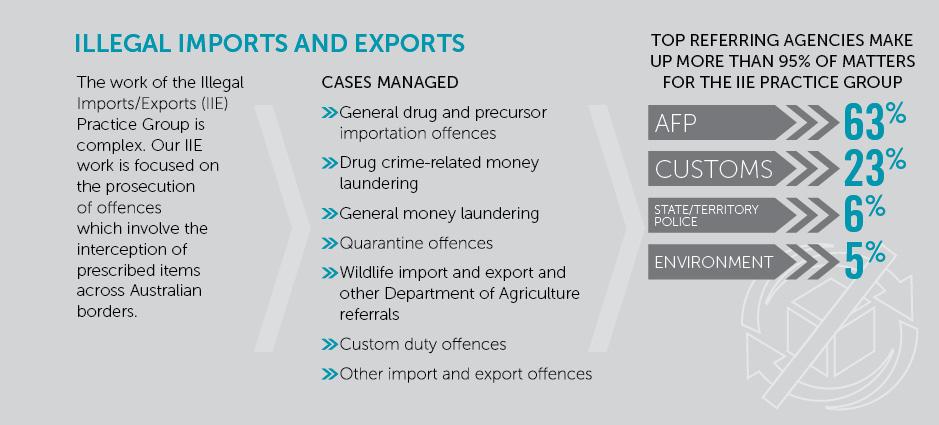
This practice group is primarily responsible for prosecuting offences involving the introduction or removal of prescribed items across Australia’s borders. The crime types covered by the practice group include:
- general drug and precursor importation offences
- drug crime-related money laundering
- general money laundering
- quarantine offences
- wildlife imports and exports
- other import and export offences, such as those against the Customs Act 1901, the Anti-Money Laundering and Counter-Terrorism Financing Act 2006, and cross-border movements of money
- customs and excise duty offences.
Serious drug offences
We conduct a significant amount of work in relation to prosecutions of serious drug offences, particularly importation offences. Drug offences are among the most serious Commonwealth offences and attract substantial penalties, including life imprisonment for offences involving commercial quantities of serious drugs. The range of serious drug offences in the Criminal Code includes trafficking and commercial manufacture of drugs. We also prosecute state and territory drug offences, usually where the investigation involves a Commonwealth agency and it is appropriate for us to conduct the prosecution.
In recent years we have seen a wide spectrum of importation methodologies relating to precursors—ranging from quantities being imported through the mail (often several kilograms at a time) through to sophisticated planning of importations of hundreds of kilograms or several tonnes of precursors imported inside shipping containers.
Money laundering
Since 2003 it has been a Commonwealth offence to deal in the proceeds of crime, or to deal in money or other property (among other things) intending to use it to facilitate a future crime.
While the offences provided for by Part 10.2 of the Criminal Code cover conduct traditionally referred to as ‘money laundering’, they also extend to a wider range of unlawful dealing. During the year we continued to champion the appropriate use of Part 10.2 offences in the fight against serious criminal activity. The broad scope of these offences means that they can be used to attack not just one segment of criminal activity but any serious crime which produces financial profits.
Money laundering prosecutions are no longer confined to simple cases about the proceeds of a drug deal. Examples of conduct we are prosecuting include the remittance out of Australia of large sums of money suspected of being the proceeds of crime, dealing in the proceeds of complex tax frauds, and dealing in money for the purpose of bribing a foreign public official. Related matters may also involve hiding, disguising or legitimising the true origin and ownership of money used in or derived from committing crimes. Money laundering prosecutions involve a diverse range of activity carried out at all levels of sophistication. There is no single method of laundering money although use of the banking system and money transfer services is common. Money launderers are constantly creating schemes to attempt to circumvent detection measures.
These prosecutions are making it clear to potential offenders that dealing in the proceeds of crime or instruments of future crime places them at risk of long-term imprisonment.
The application of Part 10.2 can be complex, with difficult legal and factual issues. During the year appellate courts dealt with a number of matters, which have helped to clarify and confirm the proper application of Part 10.2.
Other offences are also an important part of the fight against money laundering. The offences contained in the Anti-Money Laundering and Counter-Terrorism Financing Act 2006 are important both as predicate offences for the purposes of the Part 10.2 offences, and in their own right. Where appropriate, we continue to charge both anti-money laundering and Part 10.2 offences in combination in the same matter.
Other importation and exportation matters
Our partner agency, the Department of Agriculture, administers a wide range of legislation and is responsible for investigations of other importation and exportation offences. The referrals we receive follow investigations relating to quarantine offending, breaches of food import controls, forgery of exportation documentation and breaches of export control legislation involving the exportation of live cattle.
Practice Group structure
The work of the Illegal Imports and Exports Practice Group is performed across all our offices. Dedicated branches aligned with this practice group operate in our Sydney, Melbourne and Brisbane offices. Other branches in our offices in Adelaide, Canberra, Hobart, Perth, Townsville, Cairns and Darwin also receive work from this practice group.
Partner agencies
The Illegal Imports and Exports Practice Group partner agencies include the Australian Customs and Border Protection Service and the Department of Agriculture, both of which have important responsibilities in relation to the import and export of goods from Australia. This practice group is the lead practice group for all liaison with the Australian Customs and Border Protection Service. We also work with the Australian Federal Police, which continues its significant involvement in policing our borders and investigating drug-related crime.
Policy, engagement and law reform
The Illegal Imports and Exports Practice Group is continuing to work with the Attorney-General’s Department to try and amend the Criminal Code to clarify:
1. the meaning of ‘drug analogue’ so that the serious drug offences continue to apply to all substances that are structurally similar to illicit drugs; and
2. the definition of ‘manufacture’ to clarify that this includes the process of extracting or refining a substance even if it does not result in the creation of a new substance.
The Illegal Imports and Exports Practice Group is responsible for prosecuting offences involving the introduction or removal of prescribed items across Australia’s borders. This work is diverse and covers general drug and precursor importation, money laundering, quarantine and wildlife offences, and a range of other matters including customs duty offences.
Human Exploitation and Border Protection
The Human Exploitation and Border Protection Practice Group Leader is also David Adsett, Deputy Director.
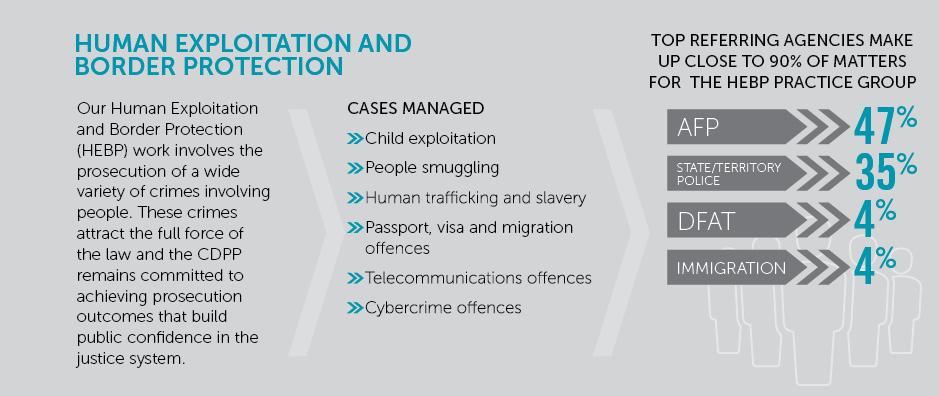
This practice group prosecutes a wide variety of offence types criminalised by several different statutes. This includes:
- Child sex exploitation offences. These include offences relating to child pornography material, child abuse material, and grooming and procuring persons under the age of 16 to engage in, or submit to, sexual activity, or to cause a child to engage in sexual activity with another person, whether by use of the internet, email, telephone or other telecommunications applications, or postal or similar services. These offences also include importation of child pornography and child abuse material, and child sex offences committed overseas by Australian citizens and permanent residents.
- Human trafficking and slavery. This encompasses a range of offences including when people are moved across Australia’s borders through coercion, threat or deception for the purposes of exploitation. It also includes offences which subject people already in Australia to exploitative practices such as slavery, servitude, forced labour, forced marriage or debt bondage. To date, the majority of victims have involved women working in the sex industry. However, increasingly, victims of other forms of labour exploitation are being identified including in the agricultural, construction and hospitality industries.
- People smuggling. Offences for people smuggling apply to both the organisers of ventures, and the crew of the vessels, who bring to Australia people who are not Australian citizens and have no lawful right to come to Australia. Other offences include concealing a non-citizen who has illegally entered or intends to enter Australia, and making or using false documents.
- Passport, visa and other migration offences.
- Telecommunications offences. These offences include using a carriage service to: make a threat or a hoax threat; menace, harass or cause offence to another person; and make improper use of the emergency call service (‘000’).
- Cybercrime offences. In Australia, ‘cybercrime’ describes both crimes directed at computers or other information communications technology (ICT) such as hacking and denial of service attacks, as well as traditional crimes where computers or ICT is an integral part of the offence, such as online fraud, money laundering and identity theft.
- Immigration detention offences.
- Federal community policing. This includes offences committed on airlines, ships, at airports or other federal places.
- Bigamy.
Practice Group structure
The work of this practice group is performed across all our offices. Dedicated branches aligned with this practice group operate in our Sydney, Melbourne and Brisbane offices. Other branches in our offices in Adelaide, Canberra, Hobart, Perth, Townsville, Cairns and Darwin also receive work from this practice group.
Partner agencies
The Human Exploitation and Border Protection Practice Group works closely with partner agencies including the Australian Federal Police, Australian Customs and Border Protection Service, the Department of Foreign Affairs and Trade (Australian Passport Office), and state and territory police.
Online child sex exploitation practice
The number of referrals and victims of crime in this practice area is increasing, as is the technical complexity of the work. These offences are becoming more sophisticated through the use of networks to distribute material, protection of material by encryption, and storage of material online in the ‘cloud’.
Recent appellate decisions in R v Porte [2015] NSWCCA 174, R v De Leeuw [2015] NSWCCA 183 and DPP (Cth) v Zarb [2014] VSCA 347 illustrate how seriously courts view online child sex offending. These decisions highlight the primary consideration of general deterrence and denunciation when sentencing offenders.
Human trafficking practice
Since the commencement of Divisions 270 and 271 of the Criminal Code, sixteen people have been convicted of human trafficking and slavery-related offences following prosecution by the CDPP.
We have increasingly engaged with partner agencies to provide early pre-brief advice on investigations in these areas and to provide training to agencies investigating these offences. This year we provided advice to the Australian Federal Police and state police in relation to nine investigations, covering a range of human trafficking and slavery related allegations, including slavery, human trafficking, forced marriage, servitude, forced labour and debt bondage.
Victims of crime
The Human Exploitation and Border Protection Practice Group is receiving an increasing number of referrals involving victims and vulnerable witnesses. Prosecutions involving victims and vulnerable witnesses present unique challenges and can also require engagement with Commonwealth, state and territory Witness Assistance Services, as well as various non-government organisations involved in victim support, such as the Red Cross. Refer to the Witness Assistance Service on page 27.
International assistance and engagement
There is a transnational nature to crimes prosecuted by the Human Exploitation and Border Protection Practice Group. As a result, in conjunction with the Attorney-General’s Department, we have participated in international and national forums as part of our contribution to law reform and Australia’s obligations under international law, and to enhance relationships with our partner agencies, non-government organisations and other bodies supporting victims. This has included presenting training.
Engagements in this area over the past year included:
- working with the Attorney-General’s Department to contribute a joint commentary to the United Nations Office on Drugs and Crime (UNODC) regarding an UNODC Issue Paper on the concept of exploitation in the Trafficking in Persons Protocol, in November 2014
- providing a presentation to a study delegation of senior representatives from visiting Indonesian criminal justice agencies regarding the treatment and protection of witnesses and victims in trial proceedings, in November 2014
- presenting to a visiting delegation from the Singaporean Ministry of Manpower on labour exploitation in Melbourne, in February 2015
- attending and presenting at the April 2015 Youth, Technology and Virtual Communities Conference, hosted by the Queensland Police Service (Taskforce Argos) at Bond University, in April 2015.
- working with the Attorney-General’s Department to coordinate and host a visiting delegation of Senior State Counsel from Sri Lanka in Melbourne in April 2015—the delegation’s focus was people smuggling and other transnational crime prosecutions we conduct
- providing comments to the UNODC on a draft international Case Digest of Trafficking and Slavery cases, in April 2015
- presenting at a workshop on human trafficking hosted by the Australian Federal Police, in May 2015
- presenting to a study delegation of senior representatives from various Sri Lankan criminal justice agencies at a witness and victim protection forum at Sydney, in June 2015
- contributing as a member of the Operational Working Group on Human Trafficking, at the Senior Officials’ Committee on people smuggling crew prosecutions, and at the Parliamentary Roundtable on Human Trafficking, throughout 2014–15.
Policy engagement and law reform
Human trafficking
In December 2014, we engaged with the Attorney-General’s Department regarding issues arising in a prosecution of a child trafficking offence. Between December 2014 and March 2015, we provided comments to the department on proposed amendments to the forced marriage offence in Division 270 of the Criminal Code. Legislation incorporating those amendments was introduced into Parliament in March 2015. In April 2015, we provided comments about these proposed amendments to the Senate Standing Committee for the Scrutiny of Bills. In addition, in May 2015, we made a submission to the Legal and Constitutional Affairs Legislation Committee regarding, inter alia, the proposed changes to the ‘forced marriage’ provisions under the Criminal Code.
People smuggling
Between September 2014 and May 2015, we provided input to the Attorney-General’s Department in relation to the draft People Smuggling Offences Restructure Bill 2015. The Bill is expected to be introduced to Parliament during the Spring 2015 sittings.
Australian Passport Office
Between March 2015 and May 2015, we provided input to the Department of Foreign Affairs and Trade in relation to the Australian Passports Amendment (Integrity) Bill 2015. The Bill proposes additional new criminal offences for misconduct relating to Australian Passports and travel documents. The Bill was introduced to Parliament on 4 June 2015.
Criminal confiscation
Until 1 January 2012 we had sole responsibility for conducting criminal confiscation action under Commonwealth legislation. On 1 January 2012 the Criminal Assets Confiscation Taskforce was established. The taskforce is led by the Australian Federal Police and includes the Australian Taxation Office and the Australian Crime Commission. At the same time legislative amendments to the Proceeds of Crime Act 2002 (POC Act 2002) came into force to enable the Commissioner of the Australian Federal Police to take criminal confiscation action under that Act.
Following the establishment of the taskforce, the Australian Federal Police has taken responsibility for the majority of proceedings under the POC Act 2002, and our role in criminal confiscation action is now limited. Since 2 April 2012 we have not commenced criminal confiscation action in non-conviction based matters, or conviction-based matters commenced by restraining order.
We retain responsibility for taking criminal confiscation action in matters where the restraint of property is not required to preserve the property for confiscation and the person has been convicted of an offence. All other matters are conducted by the taskforce.
In 2014–15 $5,890,810 was recovered through action we took under the POC Act 2002.
A number of restraining orders made under the POC Act 2002 to secure property to pay pecuniary penalty orders remain in place as recovery action by the Official Trustee is ongoing.
Other legislation
The POC Act 1987 applies to cases in which confiscation action was commenced prior to 1 January 2003. No amendments have been made to the Proceeds of Crime Act 1987 to enable the Commissioner of the Australian Federal Police to conduct matters under this Act. Recoveries continue to be made in a small number of residual matters under this legislation.
The CDPP also has statutory duties under the Crimes (Superannuation Benefits) Act 1989 and Part VA of the Australian Federal Police Act 1979. We have the function of bringing applications to forfeit the employer-funded component of superannuation payable to Commonwealth and Australian Federal Police employees who have been convicted of corruption offences. No superannuation orders were made in this financial year.
We have two further responsibilities in this area which have not been used following the enactment of proceeds of crime legislation. These are:
- under Division 3 of Part XIII of the Customs Act, the CDPP is vested with power to bring proceedings to recover profits earned from ‘prescribed narcotic dealings’
- under the DPP Act, the CDPP has power to take traditional civil remedies action on behalf of the Commonwealth in cases where there is a connection with a prosecution.
No orders were made in this financial year under these Acts.
Each state and territory in Australia has legislation dealing with the confiscation of property derived from state and territory offences which facilitate proceeds of crime action by state and territory authorities.
| Number | Value | |
|---|---|---|
| Conviction based pecuniary penalty orders | 3 | $166,213 |
| Conviction based forfeiture orders | 24 | $1,415,282 |
| Amount recovered | |
|---|---|
| POC Act 1987 pecuniary penalty orders | $105,774 |
| POC Act 1987 forfeiture orders | $0 |
| POC Act 1987 automatic forfeiture | $0 |
| POC Act 1987 total | $105,774 |
| POC Act 2002 pecuniary penalty orders | $81,955 |
| POC Act 2002 forfeiture orders | $2,227,342 |
| POC Act 2002 automatic forfeiture | $3,581,513 |
| POC Act 2002 total | $5,890,810 |
| Grand total | $5,996,584 |
Our Human Exploitation and Border Protection work involves the prosecution of a wide variety of crimes involving people. These crimes attract the full force of the law and the CDPP remains committed to achieving prosecution outcomes that build public confidence in the justice system.
4 OUR PARTNERSHIPS


Working with our partner agencies
We have partnerships with 59 investigative agencies, with 46 referring briefs of evidence during the reporting period.
The CDPP serves the public interest by maintaining effective partnerships with Commonwealth law enforcement agencies. We have no investigative function and we can only prosecute where there has been an investigation by another agency. We rely upon investigative agencies to provide briefs of evidence and we work closely with them to prepare and present cases in court, including requisitioning additional evidence.
Our effective investigation–prosecution partnerships result in well-targeted prosecutions that:
- help partner agencies meet their enforcement and regulatory objectives
- build public confidence in Commonwealth law enforcement and regulatory frameworks.
We make decisions independently of those responsible for the investigation of federal offences.
The formation of our national practice groups last year provided new opportunities to collaborate with and support partner agencies. This model allows us to engage with agencies earlier and more frequently, and to consider strategic issues and how prosecution can advance their enforcement strategies. It also supports stronger liaison and coordination arrangements, including through identifying and addressing common or systematic issues, early engagement, scoping, and pre-brief advice.
Providing pre-brief advice
Pre-brief advice helps investigators to focus their efforts and more efficiently gather admissible evidence needed to prove an offence beyond reasonable doubt.
In the last year we increased the level of support provided in relation to pre-brief advice. The feedback from partner agencies has been positive.
We continue, as resources permit and as agreed between agencies, to provide pre-brief advice in matters that are significant, complex or major, sensitive, of particular importance for our partner agency’s enforcement strategy, and likely to have an impact on a broader class of cases.
Assessing, preparing and presenting Commonwealth prosecutions
Our prosecutors work with partner agencies to:
- provide sound and independent legal advice
- share specialist knowledge and experience of the prosecution process
- assess briefs, including identifying legal issues, relevant public interest considerations and evidentiary deficiencies (evidence must be carefully assessed in accordance with the Prosecution Policy of the Commonwealth to ensure admissible, substantial and reliable evidence substantiates any case presented in court)
- frame and present the prosecution case effectively
- address the international aspects of prosecuting (such as mutual assistance and extradition)
- deal with complex legal, evidentiary, practical and logistical issues.
Liaising with partner agencies
As detailed in Chapter 3: Our National Practice Groups, our national practice group model better aligns our national liaison with partner agencies and the way we oversee cases they refer to us. Our practice groups are:
- Commercial, Financial and Corruption
- Revenue and Benefits Fraud
- International Assistance and Specialist Agencies
- Organised Crime and Counter-Terrorism
- Illegal Imports and Exports
- Human Exploitation and Border Protection.
Practice Group Leaders are responsible for liaison with partners about the crime types covered by their group.
For partner agencies whose referrals cross more than one practice group, we have a lead practice group. Commercial, Financial and Corruption is the lead practice group for liaison with the Australian Crime Commission, Revenue and Benefits Fraud is the lead practice group for liaison with the Australian Taxation Office, and Illegal Imports and Exports is the lead practice group for liaison with the Australian Customs and Border Protection Service.
Our General Guidelines for Dealing with Investigative Agencies and memoranda of understanding with a range of partner agencies also guide the way we liaise with partners. We contribute, to the extent resources allow, to training courses our partners run for their investigative officers.
We have also developed statistical reports to help our partner agencies monitor their enforcement action and we are working with agencies to enhance the provision of advice as a national resource.
Legal manuals
Our Search Warrants Manual, Telecommunications Interception and Stored Communications Warrants Manual and Surveillance Devices Manual provide Commonwealth investigators with guidance on the legal requirements for obtaining and executing warrants under Commonwealth law.
Given the technical nature of this area of law, we have an important role in ensuring investigators have clear and appropriate advice about exercising powers under the relevant legislation and case law. While resourcing constraints have limited our ability to maintain and update these manuals in the past year, we recognise the importance of doing so and we are exploring resourcing options to enable this to occur on a ‘business-as-usual’ basis.
Providing online resources
Contemporary prosecuting increasingly involves the management and presentation to courts of voluminous evidential material, and we use electronic resources to support this work.
CDPP Partner Agencies portal
The CDPP Partner Agencies portal provides an information service to update our partner agencies on criminal law issues—Commonwealth criminal cases, new legislation, and recently published books, articles, conference papers and government reports.
This portal also includes offence breakdowns and draft charges so investigators can readily identify the physical and fault elements that must be proven to establish an offence, tailor their investigation or evidence gathering, and assist in formulating charges.
Commonwealth Sentencing Database
The Commonwealth Sentencing Database is a joint project of the CDPP, the National Judicial College of Australia and the Judicial Commission of New South Wales. It provides judicial officers and other users with rapid and easy access to information about sentencing for federal offences, to assist with their sentencing decisions. The Commonwealth Sentencing Database is designed to provide primary research sources (such as judgments and legislation) linked to secondary resources (including commentary on sentencing principles and sentencing statistics).
Ensuring proper disclosure
An important and ongoing issue is ensuring proper disclosure in prosecutions, as provided for in our Statement on Prosecution Disclosure, which is currently under review.
We continue to work with partner agencies to help them meet disclosure obligations by producing resources for investigators. Our current Statement on Prosecution Disclosure is available on our website at www.cdpp.gov.au.
Statistics about relevant legislation and referring agencies
We receive the most referrals from the Australian Federal Police, the Australian Department of Human Services, the Australian Taxation Office, Australian Customs and Border Protection Service and Australian Securities and Investments Commission.
Certain agencies conduct summary prosecutions for straightforward regulatory offences by arrangement with the CDPP. In some cases, this includes a state or territory agency conducting a Commonwealth prosecution, usually for reasons of convenience.
In 2014–15:
- The Australian Taxation Office conducted more than 1,500 prosecutions of over 1,200 individuals and 330 companies. Fines, costs and reparation orders totalling more than $9.8 million were imposed.
- The Australian Securities and Investments Commission prosecuted 355 defendants for 680 offences. Fines and costs totalling more than $914,675 were imposed.
- The Australian Electoral Commission issued 3,072 summonses. Of these, 1,630 were unable to be served, 215 were discontinued, 19 were dismissed (not proven), 907 were proven and resulted in a conviction, 246 were proven but did not result in a conviction and 55 are still to be heard. Of the matters successfully prosecuted fines totalling $125,331 and costs totalling $128,989 were imposed by the courts, all relating to non-voting in the 2013 election (these fines were not all imposed in the 2014–15 financial year).
The following tables provide statistics covering relevant legislation and referring agencies in relation to matters dealt with in 2014–15.
Connecting with international counterparts
From 23 to 25 February 2015 the Director attended the Global Law Summit in London, where he was invited to participate in a panel discussion, ‘Whose responsibility is it to maintain the rule of law’. The session had a strong emphasis on legal aid—adequate legal representation as an interest confined to the rights of a defendant. The Director explained the importance of adequate legal representation in the context of community expectations—with adequate representation a hallmark of a justice system that is functioning properly.
While in the United Kingdom, the Director also visited the Crown Prosecution Service and spent two days meeting representatives from the leadership team to strengthen relationships and gain insights into how they operate, work with partners, and manage their caseload.Gathering insights from international counterparts has been invaluable and timely given the implementation of the CDPP’s legal practice model.
| Legislation | Summary (Charges) | Indictable (Charges) |
|---|---|---|
| A New Tax System (Family Assistance) (Administration) Act 1999 | 1 | 0 |
| Aged Care Act 1997 | 0 | 1 |
| Agricultural and Veterinary Chemicals Code Act 1994 | 5 | 0 |
| Airports (Control of On-Airport Activities) Regulations 1997 | 11 | 0 |
| Anti-Money Laundering and Counter Terrorism Financing Act 2006 | 16 | 36 |
| Australian Citizenship Act 2007 | 2 | 0 |
| Australian Crime Commission Act 2002 | 0 | 6 |
| Australian Federal Police Act 1979 | 1 | 0 |
| Australian Passports Act 2005 | 32 | 0 |
| Australian Securities and Investments Commission Act 2001 | 1 | 4 |
| Aviation Transport Security Act 2004 | 33 | 0 |
| Aviation Transport Security Regulations 2005 | 12 | 0 |
| Bankruptcy Act 1966 | 200 | 11 |
| Business Names Registration Act 2011 | 2 | 0 |
| Child Support (Registration and Collection) Act 1988 | 40 | 0 |
| Civil Aviation Act 1988 | 27 | 0 |
| Civil Aviation Regulations 1988 | 49 | 0 |
| Civil Aviation Safety Regulations 1998 | 6 | 0 |
| Commonwealth Electoral Act 1918 | 43 | 0 |
| Copyright Act 1968 | 23 | 1 |
| Corporations (Aboriginal and Torres Strait Islander) Act 2006 | 29 | 6 |
| Corporations Act 2001 | 117 | 183 |
| Court Security Act 2013 | 2 | 0 |
| Crimes (Aviation) Act 1991 | 35 | 0 |
| Crimes (Currency) Act 1981 | 60 | 27 |
| Crimes (Foreign Incursions and Recruitment) Act 1978 | 0 | 7 |
| Crimes (Internationally Protected Persons) Act 1976 | 0 | 1 |
| Crimes Act 1914 | 31 | 27 |
| Criminal Code (Cth) | 2931 | 2364 |
| Customs Act 1901 | 179 | 92 |
| Defence Act 1903 | 2 | 0 |
| Environment Protection and Biodiversity Conservation Act 1999 | 2 | 1 |
| Environment Protection and Biodiversity Conservation Regulations 2000 | 1 | 0 |
| Excise Act 1901 | 5 | 3 |
| Export Control Act 1982 | 4 | 4 |
| Family Law Act 1975 | 2 | 0 |
| Financial Management and Accountability Act 1997 | 10 | 1 |
| Financial Transaction Reports Act 1988 | 1 | 0 |
| Fisheries Management Act 1991 | 180 | 0 |
| Foreign Passports (Law Enforcement and Security) Act 2005 | 9 | 9 |
| Great Barrier Reef Marine Park Act 1975 | 11 | 0 |
| Great Barrier Reef Marine Park Regulations 1983 | 2 | 0 |
| Health Insurance Act 1973 | 119 | 3 |
| Imported Food Control Act 1992 | 9 | 1 |
| Imported Food Control Regulations 1993 | 1 | 0 |
| Income Tax Assessment Act 1936 | 4 | 0 |
| Marriage Act 1961 | 2 | 0 |
| Migration Act 1958 | 203 | 99 |
| National Measurement Act 1960 | 25 | 0 |
| Passports Act 1938 | 19 | 0 |
| Primary Industries Levies and Charges Collection Act 1991 | 10 | 0 |
| Proceeds of Crime Act 2002 | 0 | 4 |
| Protection of the Sea (Prevention of Pollution from Ships) Act 1983 | 9 | 0 |
| Public Order (Protection of Persons and Property) Act 1971 | 13 | 0 |
| Quarantine Act 1908 | 38 | 143 |
| Quarantine Regulations 2000 | 2 | 0 |
| Radiocommunications Act 1992 | 15 | 0 |
| Social Security (Administration) Act 1999 | 99 | 0 |
| Social Security Act 1991 | 3 | 0 |
| Statutory Declarations Act 1959 | 2 | 0 |
| Student and Youth Assistance Act 1973 | 1 | 0 |
| Student Assistance Act 1973 | 2 | 0 |
| Sydney Airport Curfew Act 1995 | 3 | 0 |
| Taxation Administration Act 1953 | 515 | 0 |
| Therapeutic Goods Act 1989 | 49 | 0 |
| Torres Strait Fisheries Act 1984 | 1 | 0 |
| Trade Marks Act 1995 | 8 | 1 |
| Non Commonwealth Legislation | 218 | 318 |
| Total | 5487 | 3353 |
| Referring agency | Defendants | |
|---|---|---|
| Summary | Indictable | |
| Australian Federal Police/Australian Commission for Law Enforcement Integrity Joint Task Force | 0 | 4 |
| Australian Commission for Law Enforcement Integrity | 2 | 0 |
| Australian Communications and Media Authority | 4 | 0 |
| Australian Crime Commission | 0 | 5 |
| Australian Customs and Border Protection Service | 56 | 44 |
| Australian Electoral Commission | 38 | 0 |
| Australian Federal Police | 363 | 450 |
| Australian Financial Security Authority | 96 | 3 |
| Australian Fisheries Management Authority | 20 | 0 |
| Australian Maritime Safety Authority | 8 | 0 |
| Australian Pesticides and Veterinary Medicines Authority | 1 | 0 |
| Australian Postal Corporation | 23 | 1 |
| Australian Securities and Investments Commission | 22 | 22 |
| Australian Skills and Quality Authority | 1 | 0 |
| Australian Taxation Office | 69 | 28 |
| Australian Trade Commission | 0 | 1 |
| Civil Aviation Safety Authority | 10 | 0 |
| Clean Energy Regulator | 1 | 0 |
| Department of Agriculture | 21 | 12 |
| Department of Defence | 3 | 0 |
| Department of Education and Training | 8 | 5 |
| Department of Employment | 3 | 2 |
| Department of Foreign Affairs and Trade | 22 | 0 |
| Department of Human Services | 1 | 0 |
| Department of Human Services (Centrelink) | 976 | 29 |
| Department of Human Services (Child Support Agency) | 19 | 0 |
| Department of Human Services (Medicare) | 29 | 4 |
| Department of Immigration and Border Protection | 10 | 1 |
| Department of Industry and Science | 1 | 0 |
| Department of Infrastructure and Regional Development | 1 | 0 |
| Department of Social Services | 1 | 0 |
| Department of Sustainability, Environment, Water, Population and Communities | 0 | 1 |
| Department of the Environment | 2 | 0 |
| Department of Veterans’ Affairs | 0 | 1 |
| Great Barrier Reef Marine Park Authority | 9 | 0 |
| National Measurement Institute | 5 | 0 |
| Office of the Registrar of Indigenous Corporations | 26 | 1 |
| Department of the Prime Minister and Cabinet | 0 | 2 |
| Therapeutic Goods Administration | 3 | 0 |
| Non Commonwealth Agencies | 113 | 121 |
| Total | 1967 | 737 |
Notes: This list contains names of only current Commonwealth agencies at 30 June 2015. Where an agency’s name has changed over time, all the cases emanating from that agency, whatever its name, are included under the most current agency that has assumed the function.
The ‘Non-Commonwealth Agencies’ count includes three private prosecutions (summary).
‘Defendants dealt with’ includes not only convictions and findings of guilt but also matters resulting in acquittals, prosecutions which are discontinued in accordance with the Prosecution Policy of the Commonwealth based on evidentiary or public interest considerations or as part of a charge negotiation, as well as when there is a hung jury, a warrant is issued as the defendant has absconded, and determinations that a defendant is unfit to be tried.
CASE STUDY
PROJECT WICKENBY — A DECADE OF TACKLING TAX EVASION
The multi-agency Project Wickenby represented an unprecedented effort against offshore tax evasion, avoidance and crime. As Wickenby comes to a close, we reflect on its successes and look ahead to the future of fighting tax crime under the new Serious Financial Crime Taskforce.
Establishment and purpose
In 2004 an international tax scheme promoter visited Australia to meet with prospective clients. A raid on the promoter’s Melbourne hotel room and the seizure and analysis of his laptop led to Australia’s innovative multi-agency effort against offshore tax evasion, known as Project Wickenby.
Wickenby was established in 2006 to fight offshore tax evasion on an unparalleled scale.
Australian Taxation Office Deputy Commissioner Michael Cranston, said, ‘From the beginning of Project Wickenby we were breaking new ground. Government agencies, both within Australia and overseas, had never worked so closely, and so successfully together before.’
The goal was to protect the integrity of Australia’s financial and regulatory systems by preventing people from promoting or participating in the abusive use of secrecy jurisdictions.
The Project Wickenby taskforce combined the efforts of eight Australian Government agencies and drew upon unprecedented levels of international cooperation and sophisticated technology. Its objectives were to:
- reduce international tax evasion within the Australian taxation system
- enhance strategies and capabilities of Australian and international agencies to collectively detect, deter, deal with and disrupt international tax evasion and money laundering
- improve community confidence in Australia’s regulatory systems
- reform administrative practice, policy and legislation.
With Australians increasingly engaged in the global economy, and the scale of international tax avoidance and evasion extensive and growing, that goal is as relevant today as it was then.
Prosecutions
Our contribution to Project Wickenby was to prosecute those who attempted to evade paying their correct share of tax, to help maintain community confidence in Australia’s taxation system and deter other offenders. Over the last decade we have worked closely with our partner agencies to advise on, assess and prosecute many complex tax frauds referred to the CDPP under Project Wickenby.
As at 30 June 2015, a total of 61 people had been committed to trial for indictable offences (the most serious category of offences). Of these, 46 were convicted. Significantly, each offender was sentenced to a term of imprisonment. This underscores how seriously the courts view this type of offending and the importance of general deterrence as the primary sentencing principle.
Offences that strike at the community’s heart
Many Project Wickenby prosecutions have given rise to important judicial statements about the proper sentencing principles for serious tax offenders and other white collar criminals.
Courts have emphasised that ‘offences against Commonwealth revenue strike at the community’s heart’ and ‘so called massive tax evasion will call for punishment to operate to deter others’: R v Wheatley [2007] VCC 718. Serious tax fraud has been described as ‘offending that affects the whole community’ and that the sentence must ‘have both a deterrent and a punitive effect’: Hili v R; Jones v R (2010) 242 CLR 520; (2010) HCA 45.
In addition to the 61 indictable matters referred to above, a further 69 people were prosecuted for summary offences with the majority involving outstanding lodgements of tax returns.
In its final year, Project Wickenby continued to deliver results. We received one new matter, completed 14 and ended the year with 19 matters open/ongoing. From 1 July the finalisation of those ongoing matters will be managed within the Serious Financial Crime Taskforce.
Not surprisingly given its mandate, Project Wickenby involved significant technical and logistical challenges. These include the need to obtain evidence from overseas jurisdictions, analyse and distil voluminous documentary evidence, meet complex legal challenges to the prosecution process, and present complex factual scenarios to a jury.
Achieving successful outcomes has required a significant commitment of CDPP resources, usually over many years. Trials can last many months, usually following extended pre-trial applications and hearings. For example, one prosecution has been running for more than six years, involving committal proceedings, a trial, appeals to the Court of Criminal Appeal, and an appeal to the High Court.
The dedicated funding provided to the CDPP under Project Wickenby has allowed us to resource this challenging and specialised work without detracting from our ability to meet prosecution priorities in other areas.
A lasting legacy
Combatting serious tax fraud is complicated—the scale and scope of the criminality is large, as described by Shane Kirne, CDPP Deputy Director, the prosecution of those involved in tax crime builds community trust in the justice system.
‘Firm action showed that the Commonwealth had the resolve to bring these criminals to account notwithstanding the subterfuge, secrecy and misrepresentations that often clothed their fraudulent behaviour,’ said Shane Kirne.
‘The prosecutions have also been very important in sending a strong deterrent message, making it clear that tax fraud is a serious crime that will be punished severely, and maintaining the rule of law principle that no-one is above the law’, added Kirne.
This work encourages and supports the great bulk of the population, who do the right thing naturally, as well as discouraging those who might be tempted to do otherwise.
‘Times have certainly changed from the days when you might have heard someone at the local pub bragging about how they managed to fool the tax man. Increasingly, we are seeing the community’s recognition of the tax system as a community asset. When someone doesn’t pay their tax, it may be to their own short term advantage, but it is to the detriment of the entire Australian community, and that’s not something to boast about,’ said Deputy Commissioner Michael Cranston.
Serious Financial Crime Taskforce
The Serious Financial Crime Taskforce commenced on 1 July 2015. It builds on the successful Wickenby multi-agency model, but has a significantly broader scope. The taskforce’s initial intelligence priorities are superannuation and investment fraud, identity crime and professional facilitators. Its initial operational priorities are phoenix fraud, trust fraud and international tax evasion fraud.
The Fraud and Anti-corruption Centre (FAC), which is hosted by the Australian Federal Police, will coordinate the new taskforce.
The CDPP will play an important role in providing pre-brief advice to the FAC and investigating agencies, then assessing and (where appropriate) prosecuting matters referred to it by the Serious Financial Crime Taskforce.
We remain committed to working in partnership with other Commonwealth agencies to protect the tax system and the community, and bring offenders to justice. We will provide pre-brief advice to the FAC and investigating agencies, and assess and (where appropriate) prosecute matters referred by the Serious Financial Crime Taskforce.
5 OUR PERFORMANCE



Prosecution statistics
During the year, we dealt with 2,704 people in court in addition to ongoing matters. The cases were referred by 46 Commonwealth investigative agencies, as well as state and territory agencies.
The following tables set out details of prosecutions we conducted in 2014–15.
Prosecutions and appeals
| Description | Number |
|---|---|
| Defendants convicted of offences prosecuted summarily | 1,537 |
| Defendants convicted of offences prosecuted on indictment | 619 |
| Defendants committed for trial or sentence | 681 |
| Description | Number |
|---|---|
| Defendants convicted after a plea of guilty | 1,467 |
| Defendants convicted after a plea of not guilty | 70 |
| Total defendants convicted | 1,537 |
| Defendants acquitted after a plea of not guilty | 21 |
| Total | 1,558 |
| Description | Number |
|---|---|
| Defendants committed after a plea of guilty | 380 |
| Defendants committed after a plea of not guilty | 301 |
| Total defendants committed | 681 |
| Defendants discharged after a plea of not guilty | 3 |
| Total | 684 |
| Description | Number |
|---|---|
| Defendants convicted after a plea of guilty | 543 |
| Defendants convicted after a plea of not guilty | 76 |
| Total defendants convicted | 619 |
| Defendants acquitted after a plea of not guilty | 32 |
| Total | 651 |
| Appeal Type | Outcome | Summary | Indictable |
|---|---|---|---|
| Appeals against sentence | Upheld | 2 | 13 |
| Dismissed | 1 | 6 | |
| Total | 3 | 19 |
| Appeal Type | Outcome | Summary | Indictable |
|---|---|---|---|
| Against conviction only | Upheld | 3 | 4 |
| Dismissed | 6 | 8 | |
| Against sentence only | Upheld | 29 | 22 |
| Dismissed | 18 | 29 | |
| Conviction and sentence | Upheld | 6 | 1 |
| Dismissed | 7 | 21 | |
| Total | 69 | 85 |
Orders and fines
| Order | Actual 2013–14 $’000 | Actual 2014–-15 $’000 |
|---|---|---|
| Reparation orders made | 31,477 | 35,795 |
| Fines and costs orders made | 3,811 | 2,691 |
Prosecution performance indicators 2014–15
In 2014–15 we met all prosecution performance indicators.
| Description | Target | Outcome | Details successful (Total) |
|---|---|---|---|
| Prosecutions resulting in a conviction* | 90% | 98% | 2,156 (2,209) |
| Defendants in defended summary hearings resulting in conviction | 60% | 77% | 70 (91) |
| Defendants in defended committals resulting in a committal order | 80% | 99% | 301 (304) |
| Defendants tried on indictment and convicted | 60% | 70% | 76 (108) |
| Prosecution sentence appeals in summary prosecutions upheld | 60% | 67% | 2 (3) |
| Prosecution sentence appeals in a prosecution on indictment upheld** | 60% | 68% | 13 (19) |
| Description | Target | 2013–14*** | 2014–15 |
|---|---|---|---|
| Prosecutions resulting in a conviction | 90% | 98% | 98% |
| Defendants in defended summary hearings resulting in conviction | 60% | 68% | 77% |
| Defendants in defended committals resulting in a committal order | 80% | 98% | 99% |
| Defendants tried on indictment and convicted | 60% | 74% | 70% |
| Prosecution sentence appeals in summary prosecutions upheld | 60% | 100% | 67% |
| Prosecution sentence appeals in a prosecution on indictment upheld | 60% | 65% | 68% |
Notes:
* The conviction rate is calculated by taking the number of defendants convicted as a percentage of defendants convicted or acquitted. The calculation does not include defendants where the CDPP discontinued the prosecution in its entirety or where a prosecution has commenced and the defendant failed to appear before a court.
** A prosecution sentence appeal is recorded as not having been upheld if the court finds that the sentence imposed at first instance was too lenient but in the exercise of its discretion declines to allow the appeal. In 2014–15 there were three such cases.
*** In table 14 the number of cases on which the percentages were calculated is published in our 2013–14 Annual Report. A copy of the report is available on our website at www.cdpp.gov.au/.
Prosecution appeals against sentence
The Prosecution Policy of the Commonwealth provides that the prosecution right to appeal against sentence should be exercised with appropriate restraint. In deciding whether to appeal, we consider whether there is a reasonable prospect that the appeal will be successful. Factors we may consider when deciding to appeal include whether:
- the sentence is manifestly inadequate
- the sentence reveals an inconsistency in sentencing standards
- the sentence proceeded on the basis of a material error of law or fact requiring appellate correction
- the sentence is substantially and unnecessarily inconsistent with other relevant sentences
- an appeal to a Court of Appeal would enable the court to lay down some general principles for the governance and guidance of sentencers
- an appeal will enable the court to establish and maintain adequate standards of punishment for crime
- an appeal will ensure, so far as the subject matter permits, uniformity in sentencing
- an appeal will enable an appellate court to correct an error of legal principle.
In 2014–15 a total of 19 prosecution appeals against sentence in indictable matters were decided. Of those, 13 were upheld while six were dismissed. In one of the dismissed appeals, the appeal court found that the non-parole period imposed by the sentencing judge was manifestly inadequate, however the court elected to exercise its residual discretion not to intervene and dismissed the appeal. In two of the dismissed appeals, the appeal court considered the sentences imposed at first instance, although not manifestly inadequate, were lenient or very lenient.
R v Zarb
In a prosecution sentence appeal which was successful1 the Victorian Court of Appeal upheld the Director’s appeal in a case where the defendant engaged in an online chat with a police operative in which he commented that he enjoyed the fantasy of raping an eight-year-old girl. Further, a laptop computer seized during the execution of a search warrant at the defendant’s residence revealed 415 child pornography images and one child pornography movie. Analysis also revealed that the defendant had transmitted child pornography to two separate recipients.
The defendant pleaded guilty to one charge of accessing and two charges of transmitting child pornography and was sentenced to two separate community correction orders, of three years and three months duration. The Director appealed on the ground of manifest inadequacy. By a majority (Priest JA dissenting) the appeal was allowed, and the defendant was re-sentenced to a three-month term of imprisonment in relation to one charge and a two-year community correction order in relation to the other two charges.
1 R v Zarb [2014] VSCA 347 (18 December 2014)
Neave and Kyrou JJ delivered a joint judgment concluding that it was outside the range of the judge’s sentencing discretion to impose an entirely non-custodial sentence, as the offending was very serious and the offender’s moral culpability was high. They held that the sentences imposed at first instance gave insufficient weight to the gravity of the offences, the weight to be given to general and specific deterrence, and the need to denounce the offending.
R v Combo & Crake
In another successful appeal2 Combo, a Chief Executive Officer of an Aboriginal Corporation, dishonestly exercised his position as a Commonwealth public official on three occasions to obtain $74,000 for himself and a further $10,000 indirectly. Crake aided Combo to also obtain a significant personal benefit of $81,000. Combo was sentenced to 16 months’ imprisonment to be released forthwith. Crake was sentenced to 13 months’ imprisonment to be released forthwith.
The Director successfully appealed the sentences on two grounds, one asserting manifest inadequacy and one concerning the sentencing judge’s treatment of comparative cases. The appeal court imposed a sentence of 16 months’ imprisonment on Combo, to be released after serving eight months and 10 months’ imprisonment on Crake, to be released after serving five months. In its judgment the court stated:
‘The positive personal factors present in this case are often present in white collar offences of this type committed by the respondents. As a result, there was (at least in the recent past) grounds for a perception that courts treated white collar criminals more favourably than other categories of offending of a similar nature, such as social security fraud. This troubled the sentencing judge. However, it has come to be recognised that fraudulent conduct of this type committed by the respondents requires significant emphasis on and weight given to the need for general deterrence with correspondingly less weight given to matters personal to the offenders. That is particularly so in situations where the fraud depends for its success on an insider abusing their position of trust. Indeed, the sentencing principles that apply in the circumstances of this case are the antithesis of those extracted by the sentencing judge from the sentencing schedule.’
2 R v Combo & Crake [2015] WASCA 34
(24 February 2015)
R v Estrada, Yuan and Byun
In R v Estrada, Yuan and Byun3 the Victorian County Court imposed sentences of five years’ imprisonment with a non-parole period of three years, after the defendants pleaded guilty to conspiring to manufacture a commercial quantity of a controlled drug. The prosecution case was that the three defendants had entered into an agreement to manufacture a commercial quantity of methamphetamine for sale. The Director appealed on the ground of manifest inadequacy. The Victorian Court of Appeal upheld the appeals and sentenced each of the respondents to eight years’ imprisonment with a non-parole period of five years. The Court stated that the respondents had chosen to significantly assist a large drug conspiracy for financial benefit and found their moral culpability to be high.
3 R v Estrada, Yuan and Byun [2015] VSCA 22
(20 February 2015)
Prosecution appeals in previous years
2013–14
In 2013–14 a total of 17 prosecution appeals against sentence in indictable matters were decided. Of these, 11 CDPP appeals were upheld, while six of our appeals were dismissed. In two of the dismissed appeals, the appeal court considered the sentences imposed at first instance, although not manifestly inadequate, were lenient, and in a third that the sentence was prima facie too merciful.
2012–13
In 2012–13 a total of 17 prosecution appeals against sentence in indictable matters were decided. Of these, seven CDPP appeals were upheld, while 10 of our appeals were dismissed. In three of the dismissed appeals, the appeal court agreed with us that the sentences imposed at first instance were too lenient but declined to allow the appeals.
Exercise of statutory powers
The Director has powers that can be exercised as part of conducting a prosecution. These include the power to ‘no Bill’ a prosecution, to grant an indemnity, to take over a private prosecution, to file an ex officio indictment and to consent to conspiracy charges being laid in a particular case.
‘No Bill’ applications
After a defendant has been committed for trial, the question sometimes arises whether the prosecution should continue. This can arise either as a result of an application by the defendant or on our own initiative. A submission made to the Director to discontinue such a matter is known as a ‘no Bill’ application.
The Director’s power to discontinue is delegated to the CDPP Practice Group Leaders and branch heads who make these decisions in certain circumstances. This power was exercised by the Director’s delegates in relation to a number of prosecutions during the year.
In the past year there were 18 ‘no Bill’ applications received from defendants or their representatives decided by the Director or the Practice Group Leaders. Of these, seven were granted and 11 were refused. A further 19 prosecutions were discontinued on the basis of a recommendation from a prosecutor without prior representations from the defendant. A total of 26 prosecutions were discontinued, following decisions by the Director in three matters and by the Practice Group Leaders in 23 matters.
Of the 26 prosecutions discontinued, in 17 the primary reason for discontinuing was because there was insufficient evidence. Three were discontinued because the public interest did not warrant the continuation of the prosecution. In the remaining six, the reason for discontinuing the prosecution was both the insufficiency of evidence and the public interest.
Nine of the 26 involved fraud offences, 12 involved drugs offences, three involved people smuggling offences and two involved other types of offences.
Indemnities
The Director of Public Prosecutions Act 1983 (the DPP Act) empowers the Director to give an undertaking—referred to as an indemnity—to a potential witness in three circumstances:
- section 9(6) authorises the Director to give an indemnity to a potential witness in Commonwealth proceedings that any evidence the person may give, and anything derived from that evidence, will not be used in evidence against the person, other than in proceedings for perjury
- section 9(6D) empowers the Director to give an indemnity to a person that he or she will not be prosecuted under Commonwealth law in respect of a specified offence or specified conduct
- section 9(6B) empowers the Director to give an indemnity to a person that any evidence he or she may give in proceedings under state or territory law will not be used in evidence against them in a Commonwealth matter.
In the past year, we provided 28 indemnities under sections 9(6) and 9(6D). We gave no indemnities under section 9(6B). Ten witnesses were indemnified in drug prosecutions, three in prosecutions for fraud, five in prosecutions for money laundering and 10 in relation to other matters.
Taking matters over — private prosecutions
Traditionally it has been open to any person to bring a private prosecution for a criminal offence. That right is protected in Commonwealth matters by section 13 of the Crimes Act 1914 and is expressly preserved under section 10(2) of the DPP Act.
Under section 9(5) of the DPP Act, the Director has the power to take over a prosecution for a Commonwealth offence that has been instituted by another person. The Director is empowered to either carry on the prosecution or, if appropriate, to discontinue it.
The Director exercised this power in 2014–15 in relation to two people who had commenced the prosecution of seven defendants. All matters were discontinued.
Ex officio indictments
The Director has powers under section 6(2A)–(2D) of the DPP Act to institute prosecutions on indictment referred to as ex officio indictments. These powers are used in circumstances where a defendant consents to a prosecution on indictment without being examined or committed for trial or a defendant stands trial on different charges from those on which he or she was committed, whether under Commonwealth, state or territory law. Section 6(2D) of the DPP Act provides that in any other case where the Director considers it appropriate to do so, the Director may institute a prosecution of a person on indictment for an indictable offence against the laws of the Commonwealth in respect of which the person has not been examined or committed for trial.
In 2014–15 the Director exercised his ex officio powers on nine occasions. In certain circumstances the decision to present an ex officio indictment is delegated to Practice Group Leaders and branch heads. The Director’s delegates exercised these powers in relation to a number of prosecutions during the year.
Consent to conspiracy proceedings
The Director’s consent is required before proceedings for Commonwealth conspiracy offences can be commenced. In 2014–15 the Director consented to the commencement of conspiracy proceedings against 59 defendants in relation to 20 alleged conspiracies. Fifteen of the alleged conspiracies related to drugs offences, four of the alleged conspiracies related to fraud offences, and one alleged conspiracy related to another offence.
Consent under section 121(8) of the Family Law Act 1975
The Director’s consent is required before proceedings are commenced for an offence against section 121 of the Family Law Act 1975, which restricts publication of court proceedings. In 2014–15 the Director gave consent for proceedings to commence in one matter.
6 OUR CORPORATE GOVERNANCE


Public sector governance guides an organisation in achieving its outcomes in a way that enhances confidence in the organisation, its decisions and actions.
The Public Governance, Accountability and Performance Act 2013 (PGPA Act) and Public Governance, Performance and Accountability Rule 2014 (PGPA Rule) and related guidance explain that through effective planning, management and reporting we can improve operations and performance—ensuring our organisation is operating effectively and behaving in accordance with community expectations.
In implementing the Prosecution Policy of the Commonwealth, we seek to meet standards of fairness, openness, consistency, accountability and efficiency in prosecuting offences against the laws of the Commonwealth and, in meeting these standards, maintain the confidence of the public it serves. Through improving our governance arrangements we strive to further improve our performance, stakeholder relations and community awareness.
Acting on the recommendations of a comprehensive CDPP Governance Framework review undertaken in October 2014, we have strengthened our focus on our corporate governance structure, frameworks and delivery by embedding the following five principles of public sector governance:
- values driven leadership
- appropriate governance
- performance orientation
- transparency and integrity
- collaboration.
Our newly completed governance structure (see Figure 2) aligns our work and relationships with our stakeholders to work together to achieve the Outcome and Aim expressed in our Corporate Plan 2015–19.
Outcome:
To provide an independent federal prosecution service that contributes to a fair, safe and just society where the laws of the Commonwealth are respected and maintained and there is public confidence in the justice system.
Aim:
To be fair, consistent and professional in everything we do—recognising, valuing and developing the knowledge, skills and commitment of our people as they deliver Australia’s federal prosecution service.
FIGURE 2: CDPP GOVERNANCE STRUCTURE AT 30 JUNE 2015

Planning, performance and reporting
We manage our performance through a combination of careful planning, effective measurement and monitoring of performance, and appropriate, transparent reporting.
Accurate and reliable performance information helps officials, ministers, the parliament and the public form judgements on whether the CDPP is delivering on our intended results. Performance measurement is a CDPP business-as-usual activity, with appropriately focused performance monitoring and reporting used to continuously improve performance.
Our performance measurement, planning and reporting cycle supports four tiers of performance measurement:
- Programme Performance Measures in support of achieving the CDPP Outcome
- Operational Performance Measures against annual Business Plan deliverables
- prosecution statistics supported by branch Action Plans
- individual measures captured in Performance Management Agreements.
These measures combine to provide a wide range of performance information relevant to our Corporate Plan 2015–19 Outcome.
Committees
Our focus on renewing and strengthening our governance structures and frameworks throughout 2014–15 resulted in a streamlined organisational committee structure comprising our Executive Leadership Group, National Best Practice Committee, Audit Committee, and National Health and Safety Committee.
Executive Leadership Group
Our Executive Leadership Group is the key advisory group to the Director and comprises the Director as Chair, Deputy Directors and Chief Corporate Officer.
The Executive Leadership Group meets monthly by video link and quarterly in person to:
- identify and consider emerging strategic issues
- monitor and consider legal practice performance and outcomes
- consider, endorse and oversee CDPP strategies and policies on matters such as human resource management, communications, planning, ICT, information management, security and governance
- oversee budget reporting and financial strategy
- ensure national consistency in legal practice and corporate policies and processes
- oversee strategic planning, including risk identification and management
- oversee implementation, evaluation and improvement of our governance structures and processes
- monitor and provide oversight on significant issues of national interest to the CDPP
- consider and approve work plans and outcomes of its sub-committees.
National Best Practice Committee
Identifying and implementing best legal practice is fundamental to CDPP’s national operations. Our National Best Practice Committee is a sub-committee of the Executive Leadership Group established to align best legal practices for the CDPP across Australia in support of achieving our strategic outcome and directions.
The National Best Practice Committee identifies best legal practice improvements and efficiencies directed towards the CDPP operating as an effective, efficient and independent federal prosecution service. This involves reviewing internal arrangements for conducting prosecutions that require a national approach.
Chaired by James Carter, Deputy Director based in Canberra and Practice Group Leader for the Revenue and Benefits Fraud Practice Group, the National Best Practice Committee comprises senior prosecutors from several Practice Groups, located across several regions.
The National Best Practice Committee contributes to the development of policies, National Legal Directions and Practice Group Instructions, with a view to continuously improving our approach to our national practice and litigation procedures by improving consistency and coordination between regions and practice groups.
Audit Committee
Our Audit Committee provides independent assurance and assistance to the Director on the CDPP’s financial and performance reporting responsibilities, risk oversight and management and system of internal control.
During the year the Director worked with the Audit Committee to ensure its compliance with section 45 of the Public Governance, Performance and Accountability Act 2013 and Rule 17 of the Public Governance, Performance and Accountability Rule 2014.
The Committee began the year comprising management members, with one independent member. However, from 1 May 2015, the Committee was replaced by a fully independent three member Committee, retaining the existing independent member, Simon Kidman, Chief Auditor with the Department of Foreign Affairs and Trade.
Mr Kidman was joined by Ken Moore as Chair and Robyn Gray as Deputy Chair.
The Chief Corporate Officer, the Chief Financial Officer and Practice Group Leaders may attend meetings as observers, as determined by the Chair, but are not members of the Audit Committee. Representatives of the Australian National Audit Office and the internal audit provider are invited to attend all Audit Committee meetings as observers. The Chair briefs the Director after each meeting.
The Audit Committee undertakes an annual self-assessment of its performance with input from the Director, members, senior management, internal and external auditors, Chief Financial Officer, and any other relevant stakeholders, as determined by the Director.
TABLE 17: AUDIT COMMITTEE MEMBERSHIP
| 1 July 2014 – 30 April 2015 | 1 MAY – 30 JUNE 2015 |
|---|---|
|
|
TABLE 16: AUDIT COMMITTEE ATTENDANCE 2014–15
| Management Members | 24 September 2014 | 12 November 2014 | 18 March 2015 | 17 June 2015 |
|---|---|---|---|---|
| David Adsett# | Absent | Present | Present | N/A |
| James Carter# | Present | Present | Present | N/A |
| Ellen McKenzie# | Present | Present | Absent | N/A |
| Gaby Medley-Brown# | Present | Present | Present | N/A |
| Independent Members | ||||
| Robyn Gray* | N/A | N/A | N/A | Present |
| Simon Kidman#* | Present | Present | Present | Present |
| Ken Moore* | N/A | N/A | N/A | Present |
# Member from 1 July 2014 to 30 April 2015
* Member from 1 May 2015 to 30 June 2015
TABLE 17: AUDIT COMMITTEE MEMBERS
| NAME | BIOGRAPHY |
|---|---|
|
MR KEN MOORE (Independent Chair) Independent Audit Committee Chair; Director of Chemring Australia and the Williams Foundation 
|
Ken Moore is a Fellow of CPA Australia and the Australian Institute of Company Directors. Mr Moore brings extensive public and private sector senior executive and financial management experience to his role with the CDPP. Mr Moore’s experience includes 20 years’ in the Senior Executive Service in roles including Head of the National Operations Division and Chief Finance Officer with the Department of Defence. Mr Moore also has wide ranging private sector and ACT Government experience in Executive Leadership roles. Mr Moore is currently Independent Chair of the Audit and Risk Committee, Department of Veterans’ Affairs, and an Independent Member of the Territory and Municipal Services Directorate Audit Committee and the Capital Metro Agency Audit Committee. |
|
|
|
|
MS ROBYN GRAY (Independent Deputy Chair) Principal, Herne Gray and Associates P/L 
|
Robyn Gray is a solicitor, accredited mediator and principal of Herne Gray and Associates P/L. Until February 2007, Ms Gray was the Deputy Solicitor for Public Prosecutions in the Office of the New South Wales Director of Public Prosecutions. She brings over 25 years’ experience as a prosecutor, investigator and legal manager in Commonwealth and New South Wales public sector agencies and several Royal Commissions. She also has experience as a commercial litigator in private practice. In 2007 Ms Gray established her own consultancy providing organisational reviews, evaluations and performance audits, policy work, mediation/facilitation and reviews of workplace investigations for the public sector and not-for-profit agencies. Ms Gray’s strength is in developing recommendations which consider cost and practicability to produce improved efficiency and effectiveness within a reasonable time. |
|
|
|
|
MR SIMON KIDMAN (INDEPENDENT Member) Chief Auditor, Department of Foreign Affairs and Trade 
|
Simon Kidman is the Chief Auditor of the Department of Foreign Affairs and Trade, having previously held the same position at AusAID. Mr Kidman joined AusAID in 2011 as their first Chief Auditor when the aid programme was rapidly expanding and the agency was restructuring to meet this challenge. Mr Kidman has extensive senior level experience in public sector audit and finance roles, including four years at the Australian National Audit Office as the Executive Director responsible for the financial statement audits of the Department of the Prime Minister and Cabinet, the Attorney-General’s Department, the Department of Foreign Affairs and Trade and numerous agencies within the associated portfolios. His experience also includes audit roles within the ACT Government and private sector. |
National Health and Safety Committee
In accordance with the Work Health and Safety Act 2011, we take all reasonably practicable steps to protect the health, safety and wellbeing of our staff and other workers at work. This includes consulting with workers who are, or are likely to be, directly affected by a work health or safety matter.
The independent National Health and Safety Committee is accountable to our staff, assisting and advising on matters affecting the health, safety and wellbeing of staff and other workers at CDPP workplaces. The Committee consults widely with staff and other workers through a comprehensive Work Group Health and Safety Committee structure on the development of the Work Health and Safety Management System.
The central point of cooperation and consultation between management, staff and other workers in relation the System, the Committee is responsible for disseminating Work Health and Safety information, particularly in the regional offices, in a regular and timely manner. In the past twelve months the Committee has assisted in publicising national ‘days’, particularly those relating to mental health issues.
Membership is agreed between management and staff with representatives drawn from across the functions and locations of the Office.
Internal audit
To assist the Director in discharging his accountability, an internal audit programme is carried out each year. This internal audit work is outsourced to provide an independent review of our key risk areas.
The following audits were carried out during the reporting period:
- Work Health and Safety Compliance review
- Credit Card and Travel Expenditure review.
These audits found that overall compliance with internal policies was high. We have addressed areas highlighted for improvement and adopted recommendations.
The internal audit contractors also developed a compliance framework for applying the Prosecution Policy of the Commonwealth test, one of two new Programme Performance Measures identified in our Corporate Plan 2015–19.
Ethical standards
Part of developing strong leadership for an organisation like the CDPP is bringing an ethical framework to our decision-making. Everyone at the CDPP undertakes to follow these standards on joining the CDPP, and is expected to adhere to them throughout their time with us.
The Ethics Advisory Service is available to all employees who wish to discuss and seek advice on ethical issues that occur in the workplace and make sound decisions around these issues. Our people can also access policies, guidance and support from our people team and through the Employee Assistance Provider.
We rigorously pursue disclosure and management of conflicts of interest. The Governance Team worked with the executive to review and strengthen the conflicts policy and related guidance and procedures during the year to enable all officials under the PGPA Act, including the Director as the accountable authority, to meet their disclosure requirements.
Fraud prevention and control
We work diligently to minimise the potential for fraud and corruption through continuous improvement of our fraud control framework and mechanisms. The CDPP’s Fraud Control Policy assists employees, contractors, consultants and the public understand what fraud is and encourages employees at all levels to participate in protecting public resources.
As part of this approach, a compliance review in early 2015 of the CDPP Fraud Control Plan assured the Audit Committee and our senior management that fraud prevention, detection, investigation and reporting mechanisms are in place to meet the requirements of the Commonwealth Fraud Control Framework 2014, and specifically section 10(b) of the Public Governance, Performance and Accountability Rule 2014.
Flowing from the detailed outcomes of the review, and as part of the regular updating of the CDPP Fraud Control Plan, the Governance Team is implementing a more robust fraud awareness programme in 2015–16 to ensure all staff, consultants and contractors continue to embed fraud risk management into activities and business processes.
Fraud reporting
During the period 1 July 2014 to 30 June 2015 there were no reported incidents of fraud.
Risk management
Risk management is part of our strategy and planning process, and is seen as a preventative measure, rather than as a back-end control. During 2014–15 we reviewed all aspects of our Risk Management Framework to ensure compliance with the Commonwealth Risk Management Policy and that it is fit-for-purpose.
The CDPP 2015 Risk Appetite and Tolerance Statement, endorsed by the Audit Committee, clearly articulates our lowest risk appetite is around compliance objectives (principally compliance with the Prosecution Policy of the Commonwealth) including employee work health and safety.
Our Executive Leadership Group and Audit Committee actively monitor the CDPP Strategic Risk Register and Management Plan 2015. The plan identifies the following risks achieving the CDPP Outcome:
- failure to apply the Prosecution Policy of the Commonwealth
- serious workplace injury or death to one or more staff members
- systemic breakdown in external stakeholder relationships.
Risk management of the prosecution process is focused on managing all three strategic risks.
Operational risks are identified in the CDPP 2015–16 Business Plan and then assessed, analysed and treatments recorded and monitored in the CDPP 2015–16 Corporate Services Operational Risk Register.
OUR PEOPLE
7 OUR PEOPLE



Corporate overview
During 2014–15, we continued to transition the CDPP from a location-based management model to a truly national legal practice, with six national practice groups operating across all Australian legal jurisdictions. For full details, see Chapter 3: Our National Practice Groups from page 36.
The legal practice groups are supported by a national corporate service, which is also transitioning to a professional customer-focused, enabling service for the CDPP.
During the reporting year we conducted a national review and reform process to provide clarity and consistency around the roles and responsibilities for lawyers at each level, and to examine and confirm the competencies and professional development needs at each level and how they will be met.
As part of the restructure embedded during 2014–15, we also aligned core work activities to work level standards, resulting in an increased span of control at the manager level and more appropriate work complexity at each classification level. This led to further considerations regarding the ratio of general staff to management staff, resulting in implementing a strategy to further reduce the management staffing ratio.
Human resources
At 30 June 2015 the CDPP comprised 425 people (headcount) with the average full-time equivalent staffing level for the year being 401.51 employees.
Of the headcount number, 62 per cent were frontline lawyers assigned to legal roles across the practice groups. Our prosecutions function is supported by a range of legal practice services, including litigation support, accountancy, information technology, people services, finance and legal administrative support.
During 2014–15, we reduced the number of Principal Federal Prosecutors by 32 per cent and increased Federal Prosecutors Level 1 numbers by 115 per cent, as part of our organisational restructure. At the same time, we reduced non-legal roles across the organisation by 26 per cent. The percentage of Senior Executive Service (SES) staff to total staff numbers also reduced during this period from 10 per cent of total staffing to five per cent. As a consequence of the restructure, we have also been able to reduce non-ongoing engagements by 61 per cent.
All CDPP employees were employed under the Public Service Act 1999 or the Director of Public Prosecutions Act 1983 (DPP Act).
A breakdown of employee numbers is provided in the following tables.
| ACT | NSW | VIC | QLD | SA | WA | TAS | NT | TOTAL | |
|---|---|---|---|---|---|---|---|---|---|
| Director | 1 | 1 | |||||||
| SES Band 2 | 3 | 2 | 1 | 6 | |||||
| SES Band 1 | 3 | 5 | 4 | 3 | 1 | 1 | 17 | ||
| Principal Federal Prosecutor | 7 | 22 | 17 | 12 | 2 | 5 | 1 | 1 | 67 |
| Senior Federal Prosecutor | 5 | 35 | 18 | 13 | 6 | 6 | 1 | 2 | 86 |
| Federal Prosecutor 2 | 1 | 19 | 11 | 9 | 3 | 1 | 4 | 1 | 49 |
| Federal Prosecutor 1 | 2 | 21 | 12 | 13 | 3 | 4 | 1 | 56 | |
| Executive Level 2 | 5 | 1 | 1 | 1 | 8 | ||||
| Executive Level 1 | 8 | 2 | 2 | 1 | 1 | 1 | 15 | ||
| APS Level 6 | 10 | 5 | 2 | 1 | 18 | ||||
| APS Level 5 | 3 | 3 | 4 | 4 | 4 | 18 | |||
| APS Level 4 | 5 | 11 | 4 | 7 | 1 | 3 | 1 | 1 | 33 |
| APS Level 3 | 2 | 21 | 8 | 6 | 2 | 3 | 1 | 1 | 44 |
| APS Level 2 | 2 | 1 | 2 | 5 | |||||
| APS Level 1 | 1 | 1 | 2 | ||||||
| TOTAL | 55 | 148 | 85 | 70 | 21 | 30 | 9 | 7 | 425 |
Notes
1. This table includes inoperative staff.
2. Staff on Temporary Assignment of Duties (TAD) for three months or more at 30 June 2015 are reported at their TAD classification.
| Classification | 30 June 2014 | 30 June 2015 |
|---|---|---|
| Director | 1 | 1 |
| SES Band 2 | 7 | 6 |
| SES Band 1 | 24 | 17 |
| Principal Federal Prosecutor | 99 | 67 |
| Senior Federal Prosecutor | 90 | 86 |
| Federal Prosecutor 2 | 54 | 49 |
| Federal Prosecutor 1 | 26 | 56 |
| Executive Level 2 | 15 | 8 |
| Executive Level 1 | 24 | 15 |
| APS Level 6 | 22 | 18 |
| APS Level 5 | 22 | 18 |
| APS Level 4 | 43 | 33 |
| APS Level 3 | 62 | 44 |
| APS Level 2 | 6 | 5 |
| APS Level 1 | 1 | 2 |
| TOTAL | 496 | 425 |
Notes
1. This table includes inoperative staff
2. Staff on Temporary Assignment of Duties (TAD) for three months or more at 30 June are reported at their TAD classification.
| Classification | 30 June 2014 | 30 June 2015 |
|---|---|---|
| ACT | 75 | 55 |
| NSW | 158 | 148 |
| VIC | 89 | 85 |
| QLD | 81 | 70 |
| SA | 22 | 21 |
| WA | 53 | 30 |
| TAS | 10 | 9 |
| NT | 8 | 7 |
| TOTAL | 496 | 425 |
| Region | ASL 2014–15 |
|---|---|
| ACT | 55.54 |
| NSW | 132.85 |
| Vic | 74.44 |
| Qld | 67.68 |
| SA | 18.13 |
| WA | 32.91 |
| Tas | 8.30 |
| NT | 6.06 |
| TOTAL | 395.91 |
| Category | 30 June 2014 | 30 June 2015 |
|---|---|---|
| Total staff employed under the Public Service Act 1999 | 463 | 410 |
| Total staff employed under the Director of Public Prosecutions Act 1983 | 32 | 14 |
| Statutory Office holders | 1 | 1 |
| TOTAL | 496 | 425 |
Notes:
1. This table includes inoperative staff.
2. The total number of non-ongoing staff reflected in this table for the reporting period is 25.
| 30 June 2014 | 30 June 2015 | |||||||
|---|---|---|---|---|---|---|---|---|
| Category | Full-time | Part-time | Casual | TOTAL | Full-time | Part-time | Casual | TOTAL |
| Director | 1 | - | - | 1 | 1 | - | - | 1 |
| SES Band 2 | 6 | 1 | - | 7 | 6 | - | - | 6 |
| SES Band 1 | 22 | 2 | - | 24 | 17 | - | - | 17 |
| Federal Prosecutors | 202 | 67 | - | 269 | 200 | 58 | - | 258 |
| Executive Level Officers | 35 | 4 | - | 39 | 20 | 1 | 2 | 23 |
| APS Level 1—APS Level 6 | 131 | 25 | - | 156 | 104 | 15 | 1 | 120 |
| TOTAL | 397 | 99 | - | 496 | 348 | 74 | 3 | 425 |
Notes:
1. This table includes inoperative staff.
2. Staff on Temporary Assignment of Duties (TAD) for three months or more at 30 June are reported at their TAD classification
CASE STUDY
Investing in our new Federal Prosecutors
An effective and efficient prosecution service is our core work. This work has real and positive impacts on our stakeholders and the wider community.
Our emphasis on organisational and people capability over the last 12 months was an integral part of our people planning process. This included an extensive national recruitment campaign to attract and employ future prosecutors at the entry level. Recruiting these lawyers represents a key investment in our future, as they will eventually lead, drive and build the CDPP as we continue to enhance and develop our federal prosecution service.
Our national recruitment programme aimed to attract passionate, well-educated, frontline lawyers who are committed and enthused about becoming part of the CDPP as our upcoming Federal Prosecutors. By engaging lawyers at the entry level and providing effective induction, continued upskilling, learning, professional development and on-the-job training, we are investing in and developing our future workforce and leaders.
In late 2014 we sought approval from the Australian Public Service Commission (APSC) to recruit entry level Federal Prosecutors. Our search for new recruits attracted 619 applications across the nation. A total of 63 lawyers were shortlisted and interviews were conducted over nine days. This led to 28 new Federal Prosecutor (Level 1) recruits joining our ranks, including recent graduates taking the first step in their legal careers.
To ensure a smooth and effective transition into the CDPP, we conducted our first national Induction Programme, which introduced our recruits to our strategic aims, structure, work, stakeholders and partner agencies as well as Commonwealth law. This was coupled with practical, hands-on training, such as essential court skills and etiquette, brief assessment and legal drafting skills, as well as an introduction to the Australian Public Service and our corporate and people management services.
Edward and Julia were among the successful lawyers who joined the CDPP as part of this process.
Edward completed a Bachelor of Laws at the University of Technology, Sydney in 2015 and is now based in our Canberra office. He described this new job as one of the best possible outcomes for graduates such as himself.
‘The CDPP’s induction programme, for me, really demonstrated that it was an investment in our long-term growth—expending the time and resources required to patiently and comprehensively arm us with all the necessary skills to be fair and effective federal prosecutors,’ he said.
‘In my short time at the CDPP, I’ve gained carriage of a wide variety of matters, I’ve appeared in numerous sentences and even instructed in a Director’s Appeal. The team I work with is fantastic and remarkably approachable. I would struggle to envisage a more enjoyable working environment.’
Edward is currently working in the International Assistance and Specialist Agencies Practice Group.

Julia joined the Revenue and Benefits Fraud Practice Group based in Sydney and, like Edward, agrees the induction programme helped her better understand some of the different aspects of the work of the CDPP.
Julia said, ‘The induction programme gave me the invaluable opportunity to engage not only with the other new recruits but a number of senior experienced prosecutors’.
While maintaining prosecutorial independence, Julia is now working closely with members of our partner agencies to achieve successful outcomes for those agencies and the broader Australian community.
‘We all play an important role within the organisation that ultimately contributes to the delivery of an effective and successful service to our partners and the broader community.’ Julia said.
Julia graduated with First Class Honours from a combined Bachelor of Arts and Laws at the University of Sydney in 2010.
The new recruits participated enthusiastically in the Induction Programme and provided overwhelmingly positive feedback.
The development component of the Induction Programme has provided a solid base for our new Federal Prosecutors and a broad understanding of how their work contributes to the CDPP’s strategic intent and our aim of providing effective and efficient prosecution services for the benefit of the Australian community.

Workplace agreement
Enterprise Agreement
The CDPP Enterprise Agreement for 2011–14 reached its nominal expiry date on 30 June 2014. The agreement continues to provide the terms and conditions of employment for employees, except for members of the Senior Executive Service (SES) who are covered by common law contracts (see below).
At 30 June 2015 there were 401 employees covered by the Enterprise Agreement.
Common law contracts
The terms and conditions of employment for substantive SES employee are provided under individual common law contracts. At 30 June 2015 there were 21 of these contracts in place.
Performance pay
We do not pay performance pay.
Section 24(1) determination
In 2014–15 we made two determinations pursuant to section 24(1) of the Public Service Act 1999.
Workplace participation
Our enterprise agreement includes provision for employees and their representatives to be consulted about the implementation of major change. Consultation occurs mainly through regular workplace participation meetings and special purpose meetings called to discuss specific issues.
Learning and development
We are committed to developing skilled people through course work, on-the-job experience, mentoring and good performance management.
During 2014–15, we undertook targeted workforce planning across all legal practice groups to inform the development of a nationally consistent Legal Learning and Development Strategy.
CDPP employees continue to participate in the Women in Law Enforcement Strategy (WILES) Mentor Programme. Sponsored by the Heads of Commonwealth Operational Law Enforcement Agencies (HOCOLEA), this formal mentoring programme is designed to encourage women to pursue careers and senior positions within Australian law enforcement and regulatory agencies. The programme matches participants with senior mentors who provide advice on career progression and share insights into the profession.
Employee wellbeing
Our Employee Wellbeing Programme (EWP) is an integral part of our work health and safety arrangements and establishes a framework to strengthen and synchronise wellbeing policy and practice across the CDPP through a holistic approach to general wellbeing, emotional and social wellbeing, and psychological wellbeing.
We recognise the importance of building employee resilience against psychological harm from exposure to potentially distressing case materials and provide a work environment that encourages our people to identify psychological issues early and access appropriate help.
Work health and safety
Information about our work health and safety arrangements (in accordance with Schedule 2, Part 4 of the Work Health and Safety Act 2011) is reported in Appendix 2 from page 170.
Workplace diversity
We will review our Workplace Diversity Plan during the 2015 calendar year. The current programme builds on earlier workplace diversity plans and programmes. It aims to integrate the principles of workplace diversity into all aspects of CDPP human resource management. This involves raising awareness of, and promoting, core values and standards of behaviour among all our staff. It further involves embedding these principles into all human resource management policies and practices, including our performance management scheme and selection and induction processes.
Our workplace diversity profile shown in the table below is based on information volunteered by staff who may choose not to disclose their status and, as a result, the information may not be complete.
| Classification | Female | Male | Aboriginal and Torres Strait Islander | Person with a disability | First language English plus another | First language other than English |
|---|---|---|---|---|---|---|
| Director | 1 | |||||
| SES Band 2 | 1 | 5 | ||||
| SES Band 1 | 9 | 8 | 1 | 1 | ||
| Federal Prosecutors | 184 | 74 | 2 | 7 | 32 | 19 |
| Executive Level Officers | 11 | 12 | 1 | 2 | 3 | |
| APS Level 1 – APS Level 6 | 86 | 34 | 1 | 4 | 10 | 17 |
| TOTAL | 291 | 134 | 3 | 12 | 45 | 40 |
Notes:
1. This table includes inoperative staff.
| Classification | 30 June 2014 | 30 June 2015 |
|---|---|---|
| Female | 346 | 291 |
| Male | 150 | 134 |
| Aboriginal and Torres Strait Islander | 3 | 3 |
| Person with a disability | 13 | 12 |
| First language English plus another | 60 | 45 |
| First language other than English | 46 | 40 |
| Classification | Salary range |
|---|---|
| SES remuneration ranges | |
| SES Band 3 | $253,129 – $301,591 |
| SES Band 2 | $216,496 – $279,246 |
| SES Band 1 | $183,054 – $205,969 |
| CDPP Enterprise Agreement 2011–14 | |
| Principal Federal Prosecutor | $122,323 – $130,117 |
| Executive Level 2 | $112,110 – $126,894 |
| Senior Federal Prosecutor | $93,044 – $113,220 |
| Executive Level 1 | $93,044 – $101,545 |
| APS Level 6 | $73,461 – $84,389 |
| Federal Prosecutor 2 | $67,271 – $82,513 |
| APS Level 5 | $66,835 – $72,232 |
| Federal Prosecutor 1 | $59,996 – $66,371 |
| APS Level 4 | $59,996 – $66,371 |
| APS Level 3 | $53,904 – $59,274 |
| APS Level 2 | $48,697 – $ 53,542 |
| APS Level 1 | $25,299 – $ 47,240 |
Reconciliation Action Plan
Our Reconciliation Action Plan is scheduled for review during the 2015 calendar year. The plan was launched in 2010 following consultation with employees, management and Reconciliation Australia. The working group tasked with developing the plan included representatives from our Aboriginal and Torres Strait Islander employees, human resources and senior management, with support from the Director.
Agency Multicultural Plan
Our Agency Multicultural Plan directs implementation of our multicultural and equity obligations for 2013–15. The plan is on our website and also available to our staff on our intranet.
To coincide with the 2013 launch of our plan, we translated key documents for victims and witnesses into eight priority languages and published them on our website.
Following a review of the priority languages in 2014, we added another two languages. A suite of documents are now available in Arabic, Dari, Hazaragi, Indonesian, Mandarin, Persian, Punjabi, Spanish, Thai and Vietnamese.
This year we also developed key performance indicators that can be used for future reporting. Further, we have built reporting capability into our Case Reporting and Information Management System (CRIMS) system to capture information on culturally and linguistically diverse (CALD) clients.
In 2014–15 the available data shows we provided services to 604 clients who had been determined as meeting the criteria of CALD clients.
Status of women
At 30 June 2015 a total of 68 per cent of CDPP employees were female. Within the legal practice groups, female participation was 71 per cent. Female participation at the SES level was 42 per cent.
National Disability Strategy
Since 1994, Commonwealth departments and agencies have reported on their performance as policy adviser, purchaser, employer, regulator and provider under the Commonwealth Disability Strategy. In 2007–08, reporting on the employer role was transferred to the Australian Public Service Commission’s State of the Service Report and the APS Statistical Bulletin. These reports are available at www.apsc.gov.au. From 2010–11, departments and agencies have no longer been required to report on these functions.
The Commonwealth Disability Strategy has been overtaken by the National Disability Strategy 2010–2020, which sets out a 10-year national policy framework to improve the lives of people with disability, promote participation and create a more inclusive society. A high-level two-yearly report will track progress against each of the six outcome areas of the Strategy and present a picture of how people with disability are faring. The first of these reports was made available in late 2014, and can be found at www.dss.gov.au.
Privacy
There were no reports served on the CDPP by the Privacy Commissioner under section 30 of the Privacy Act 1988 in 2014–15.
8 FINANCES
Financial statements
The audited financial statements included in this report were prepared in accordance with the Public Governance, Performance and Accountability Act 2013 (Financial reporting) Rule 2015. Detailed information on the accounting policies used to prepare the audited financial statements is at Note 1 to the financial statements.
Under current budget arrangements, the CDPP has one government Outcome with one programme of activities to achieve this outcome. Further information about our budget can be found in the Attorney-General’s Portfolio Budget Statements.
Financial performance
Our operations are primarily funded through parliamentary appropriations but we also receive a small component (7.1 per cent) of revenue independently. The Australian Taxation Office transfers part of its appropriation to us to cover the cost of prosecutions for offences under goods and services tax (GST) legislation. The amount receipted in 2014–15 under this arrangement was $3.2 million. This is accounted for under an arrangement pursuant to section 74 of the Public Governance, Performance and Accountability Act 2013 (PGPA Act) as agency revenue, and retained for our use.
Operating results
Our operating revenue for 2014–15 was $85.081 million which is an increase of $1.627 million from 2013–14. This increase is mainly due to one-off funding provided by the Australian Taxation Office for complex taxation related prosecutions.
Operating expenses for 2014–15 were $83.43 million (excluding depreciation and amortisation expenses). This is a decrease of $6.62 million compared to 2013–14. The decrease was mainly due to the reduction in staffing numbers across the 2014–15 financial year as part of our legal and corporate restructuring programme, and expense reductions associated with provisions for surplus lease space in our Perth and Sydney offices, as well as the treatment of incentives for the new leases that commenced in Sydney, Melbourne and Brisbane in 2013–14.
The operating result for 2014–15 was a surplus of $1.648 million, excluding depreciation and amortisation expenses (in line with the Australian Government’s net cash appropriation arrangements).
Asset management
Our major assets are office fit-out, office furniture, computer equipment, purchased software and library holdings. We maintain asset registers and conduct an annual stocktake to ensure the accuracy of asset records.
Major fit-out works were completed for our Brisbane and Adelaide offices during 2014–15. These works were undertaken as part of new lease arrangements at the existing site in Brisbane and the move to new premises in Adelaide.
Purchasing
We adhere to the core purchasing policies and principles of value for money. We encourage competition among actual and potential suppliers, promote the use of resources in an efficient, effective, economical and ethical manner and are accountable and transparent during the procurement process. These policies and principles are set out in the Commonwealth Procurement Rules.
Our procurement and purchasing in 2014–15 was undertaken in accordance with the principles set out in the Commonwealth Procurement Rules. Value for money underpins the Commonwealth Procurement Rules.
This is applied to our procurement activities through the Director’s Governance and Finance Instructions. The Director’s Governance and Finance Instructions and supporting guidelines have been developed to ensure that we undertake competitive, non-discriminatory procurement processes, use resources efficiently, effectively, economically and ethically, and make decisions in an accountable and transparent manner.
Consultancy services
We engage consultants where we lack specialist expertise or when independent research, review or assessment is required. Typically, we engage consultants to investigate or diagnose a defined issue or problem, carry out defined reviews or evaluations, or provide independent advice, information or creative solutions to assist in our decision making.
Before we engage consultants, we take into account the skills and resources required for the task, the skills available internally, and the cost-effectiveness of engaging external expertise. We make decisions to engage a consultant in line with the PGPA Act and related regulations (including the Commonwealth Procurement Rules and relevant internal policies).
Annual reports contain information about actual expenditure on contracts for consultancies. Information on the value of contracts and consultancies is available on the AusTender website www.tenders.gov.au.
During 2014–15, we entered into 14 new consultancy contracts with a total actual expenditure of $200,801 (including GST). In addition, nine ongoing consultancy contracts were active during 2014–15, involving a total actual expenditure of $663,644 (including GST).
Australian National Audit Office access clauses
During the reporting period we did not let any contracts for $100,000 or more (including GST) that do not provide for the Auditor-General to have access to the contractor’s premises.
Exempt contracts
We have exempted the publication of details of prosecution legal counsel on the basis that to do so would disclose exempt matters under the Freedom of Information Act 1982.
Procurement Initiatives to Support Small Business
We support small business participation in the Commonwealth Government procurement market. Small and Medium Enterprises (SME) and Small Enterprise participation statistics are available on the Department of Finance’s website: www.finance.gov.au/procurement/statistics-on-commonwealth-purchasing-contracts/
We recognise the importance of ensuring that small businesses are paid on time. The results of the Survey of Australian Government Payments to Small Business are available on the Treasury’s website: www.treasury.gov.au
Some of the ways that our procurement practices support SMEs include:
- using the Commonwealth Contracting Suite for low-risk procurements valued under $200,000
- communicating in clear, simple language and presenting information in an accessible format
- adhering to the Pay on Time Policy relating to paying small business suppliers.
External scrutiny
The Auditor-General issued an unqualified audit report for the CDPP’s 2014–15 financial statements.
No other reports that included information on our operations were issued by the Auditor-General, a Parliamentary committee, or the Commonwealth Ombudsman. There was no agency capability review of our operations during the reporting period.
During the reporting period there were no decisions of administrative tribunals or the Australian Information Commissioner that have had or may have a significant impact on the CDPP’s operations.
Legal services expenditure
The Legal Services Directions 2005 require agencies to report expenditure on legal services.
These directions are not intended to cover the handling of criminal prosecutions and related proceedings (see General Note 4 to the Directions). Therefore, our report relates to our administrative activities only.
Our total expenditure on legal services (excluding the handling of criminal prosecutions and related proceedings) during 2014–15 was $47,711.35 (excl. GST). Further details are in the following table.
This is a statement of legal services expenditure published in compliance with paragraph 11.1(ba) of the Legal Services Directions 2005.
| Description | Amount |
|---|---|
| Expenditure | |
| Total (external and internal) expenditure | $47,711.35 |
| Total internal legal services expenditure | $0 |
| Total external legal services expenditure | $47,711.35 |
| Summary of external legal services expenditure | |
| Total value of briefs to counsel (A) | $0 |
| Total value of disbursements (excluding counsel) (B) | $473.10 |
| Total value of professional fees paid (C) | $47,238.25 |
| Total external legal services expenditure (A + B + C) | $47,711.35 |
Note: Excludes the handling of criminal prosecutions and related proceedings.
9 FINANCIAL STATEMENTS
OFFICE OF THE COMMONWEALTH DIRECTOR OF PUBLIC PROSECUTIONS FINANCIAL STATEMENTS 2014–2015
CONTENTS
- Independent Audit Report
- Certification of the Financial Statement
- Statement of Comprehensive Income
- Statement of Financial Position
- Statement of Changes of Equity
- Cash Flow Statement
- Schedule of Commitments
- Notes to and forming part of the Financial Statements
Office of the Commonwealth Director of Public Prosecutions
Independent Audit Report 2014–2015
APPENDICES & REFERENCES
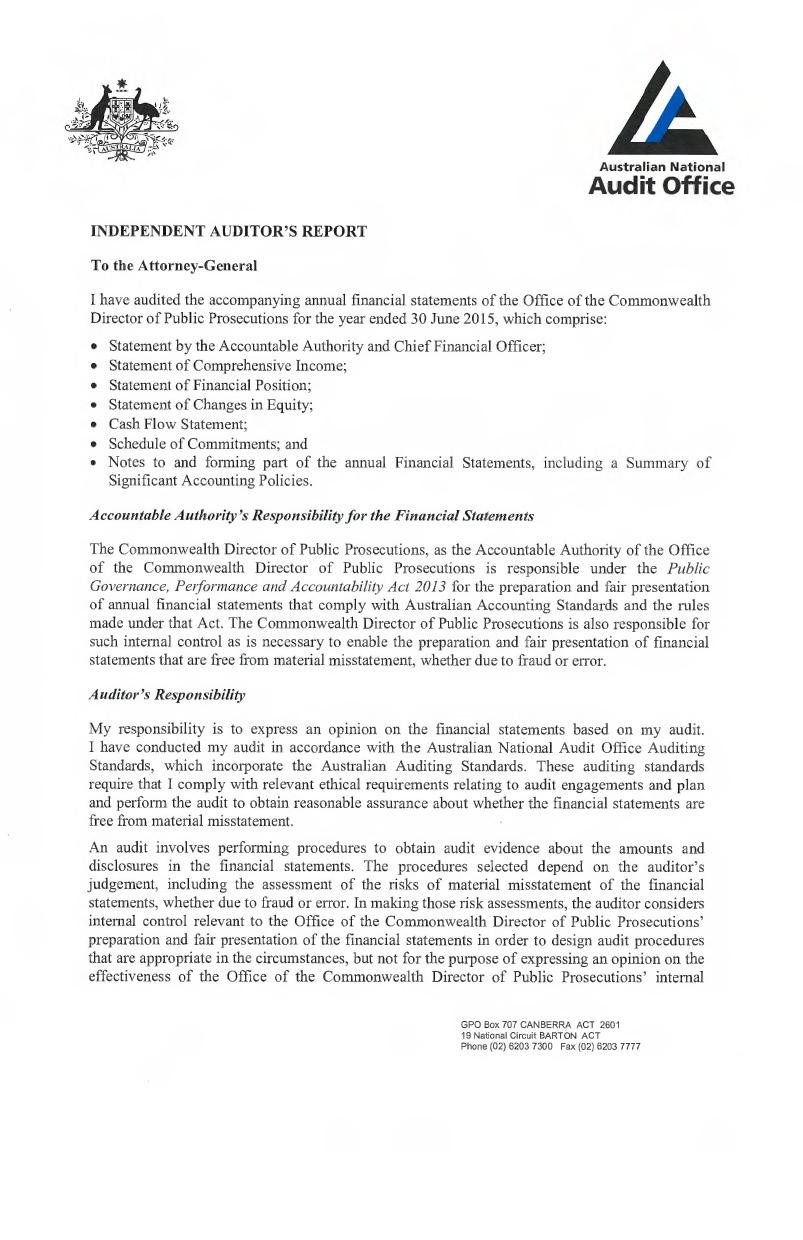
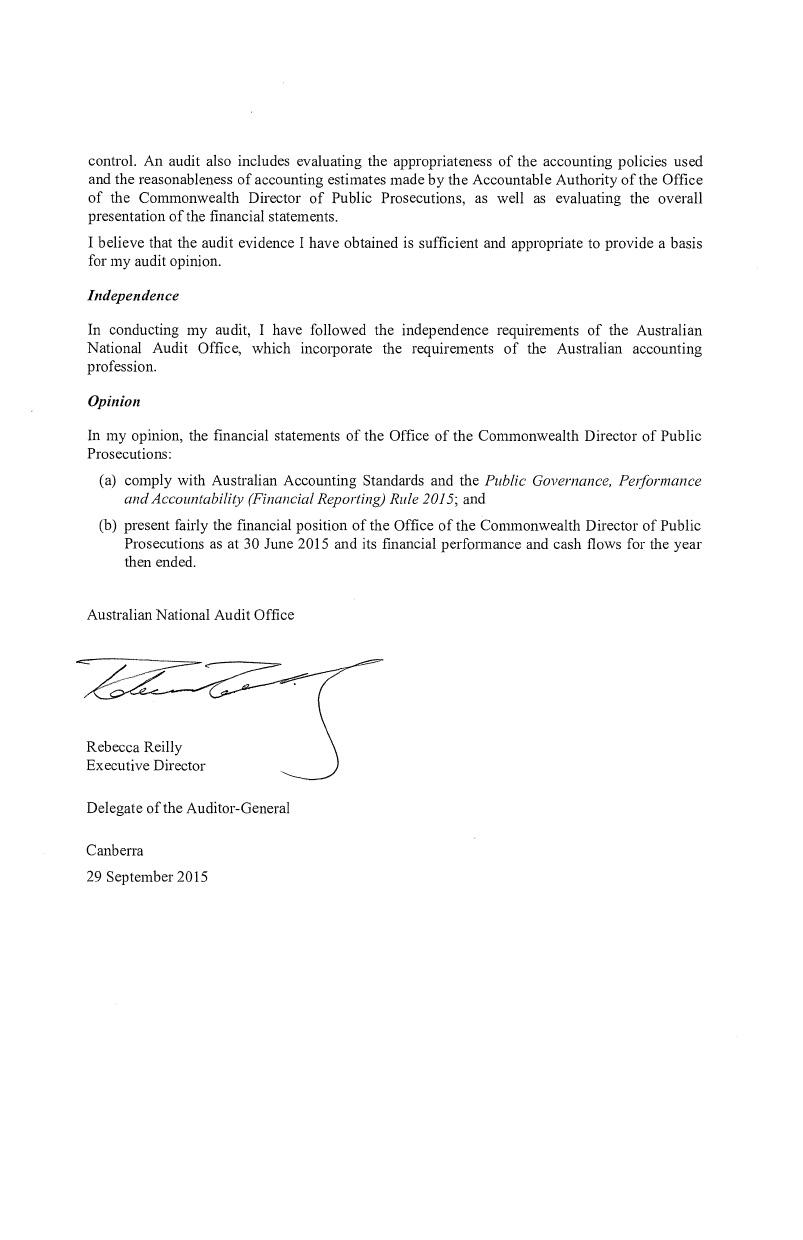
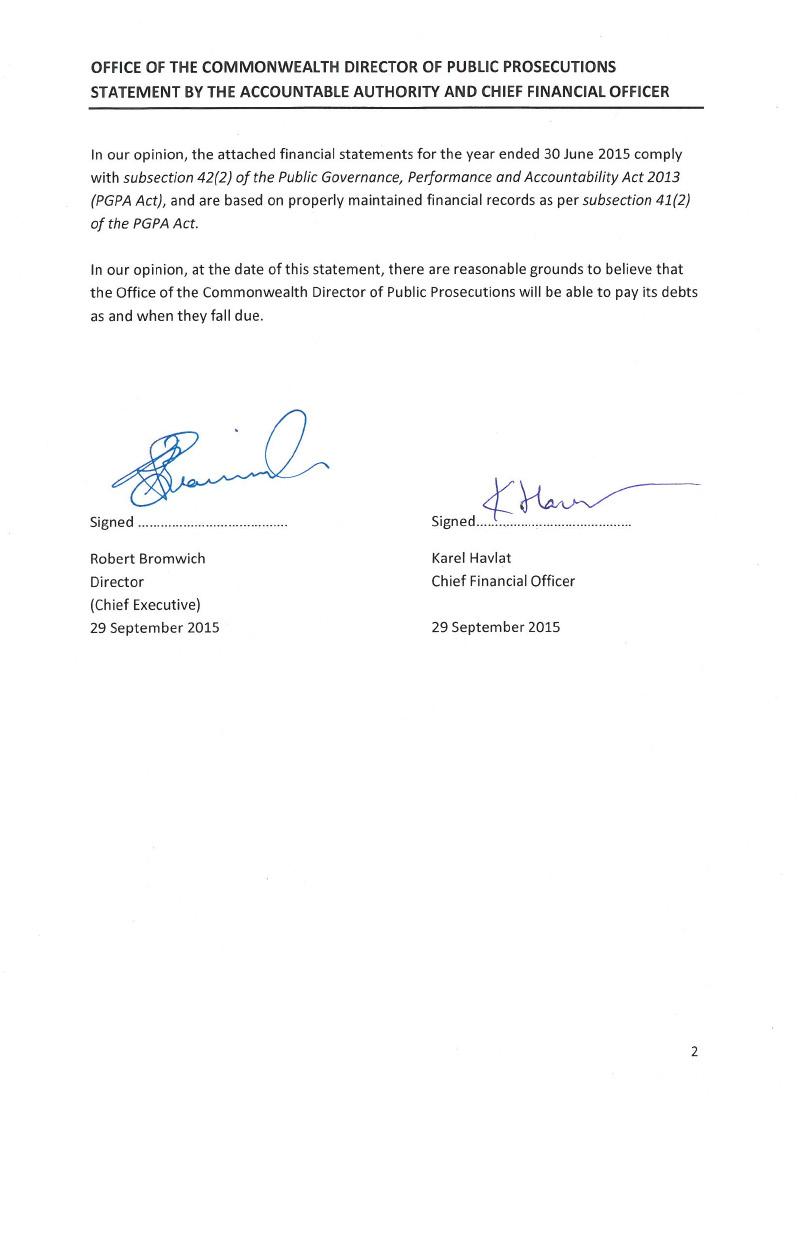
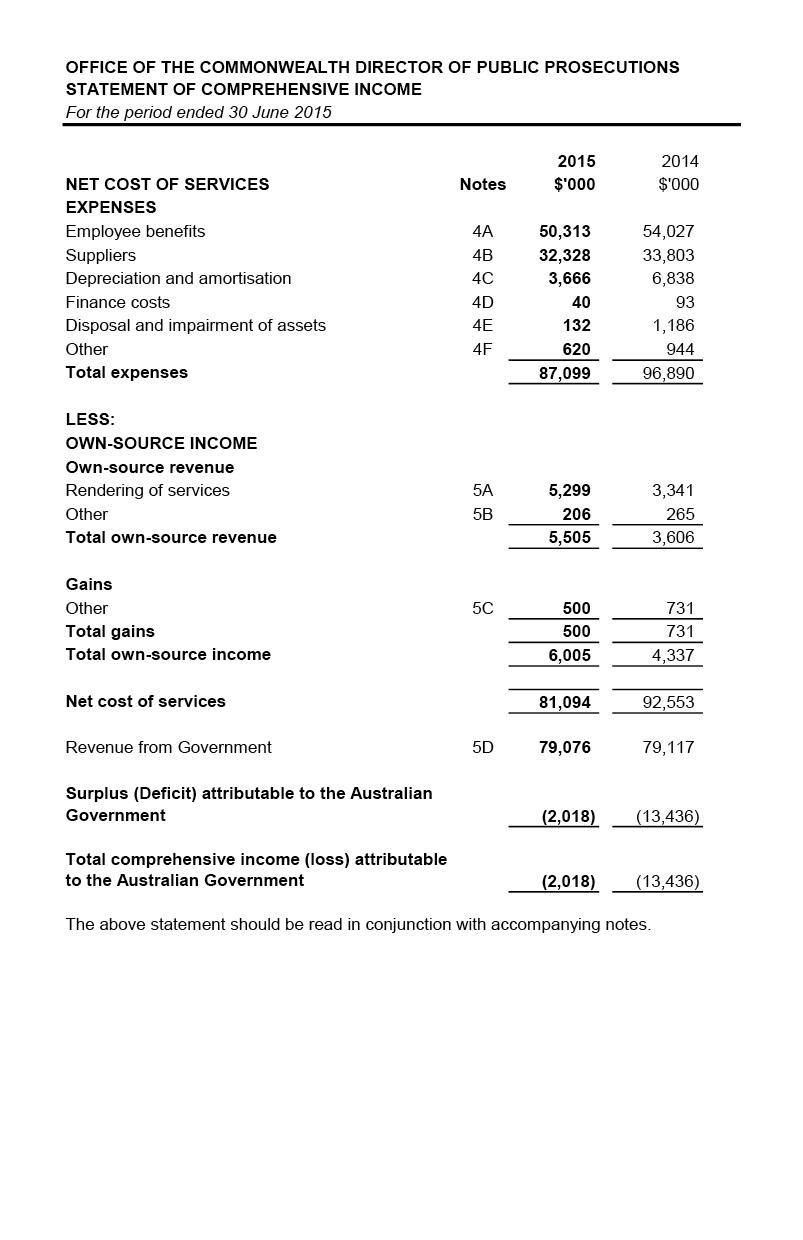
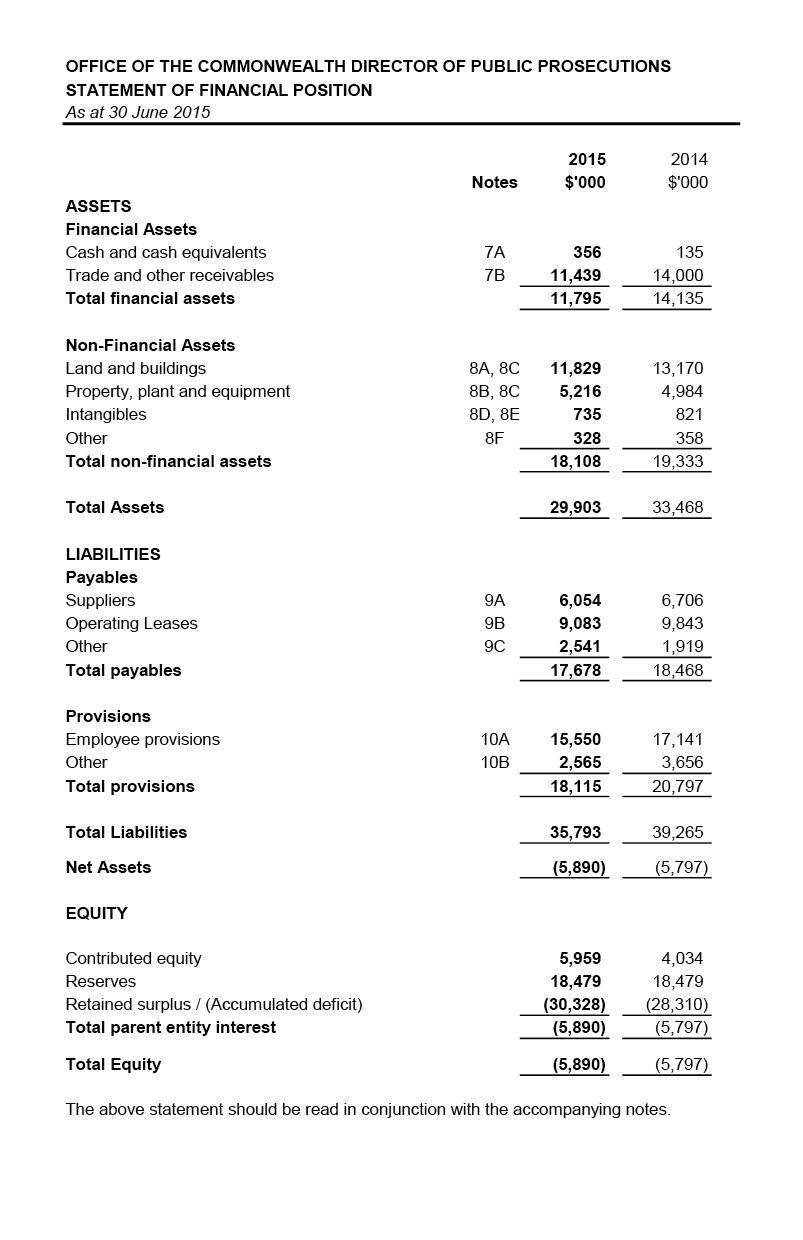
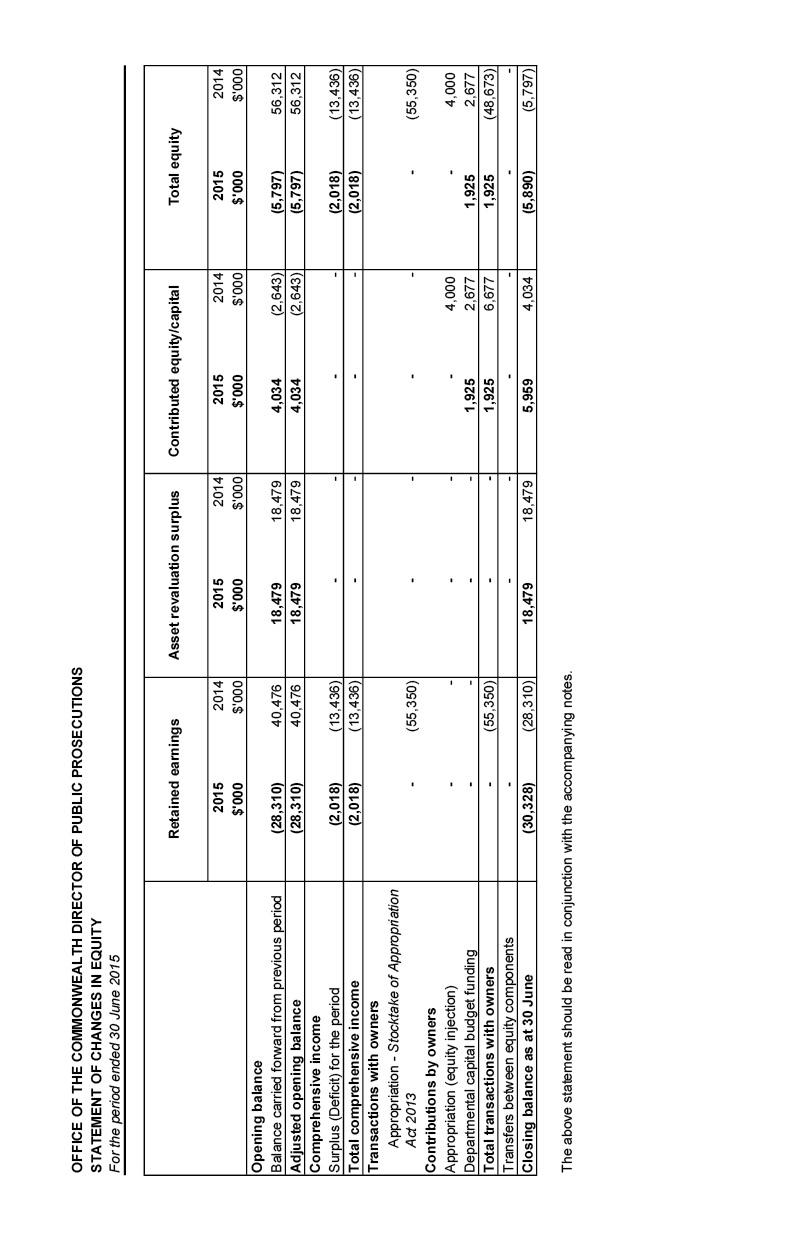
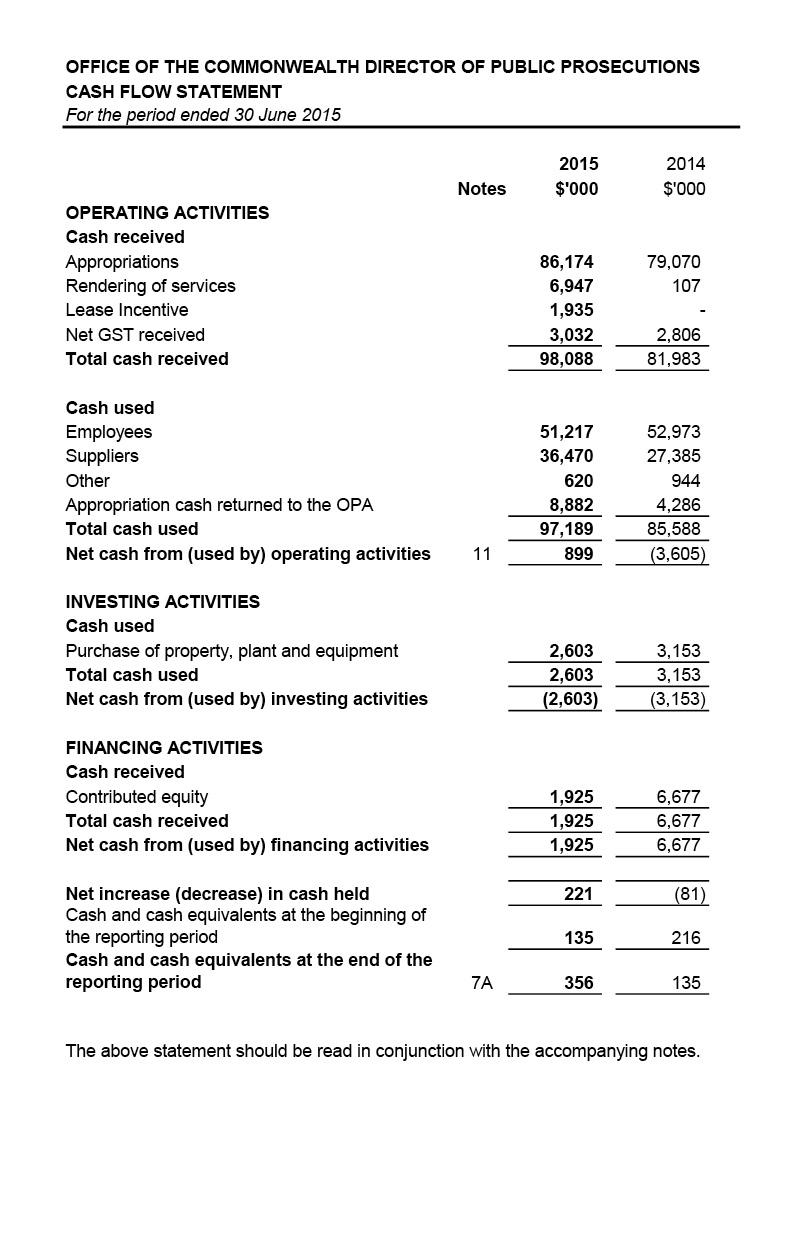
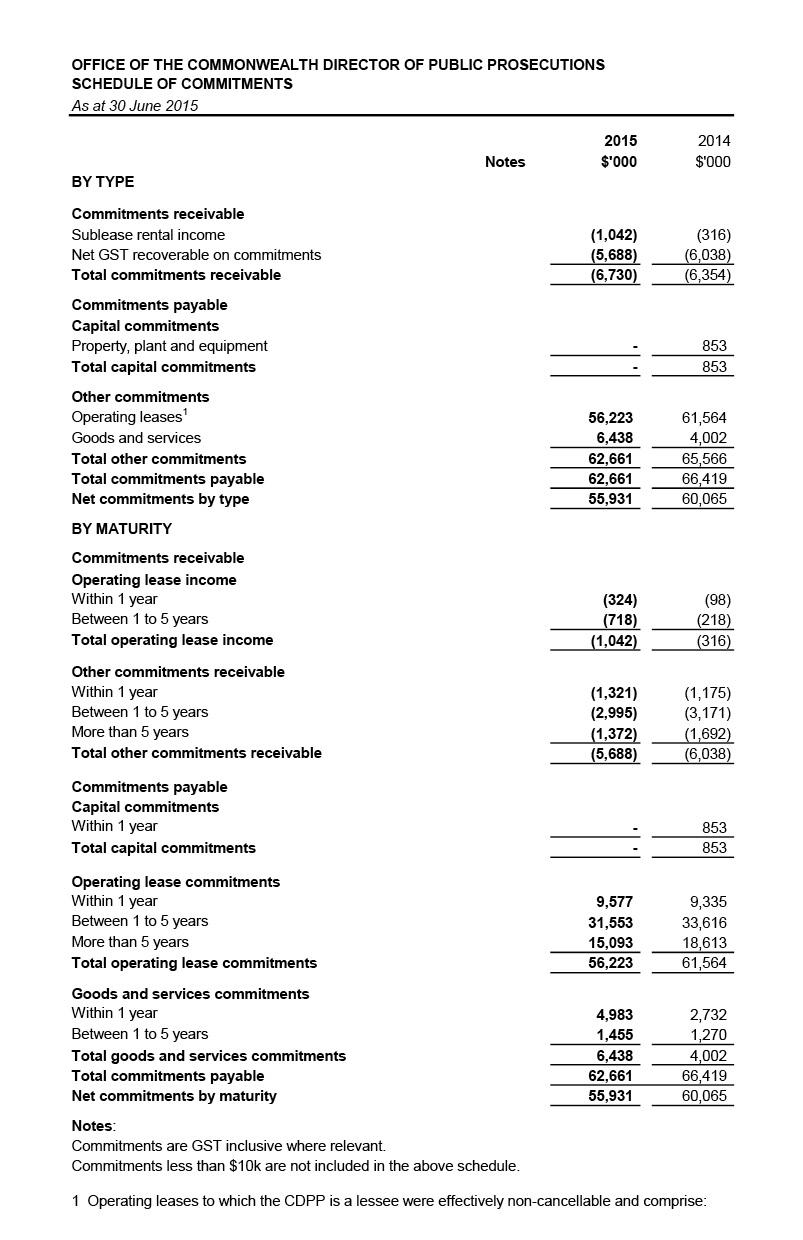

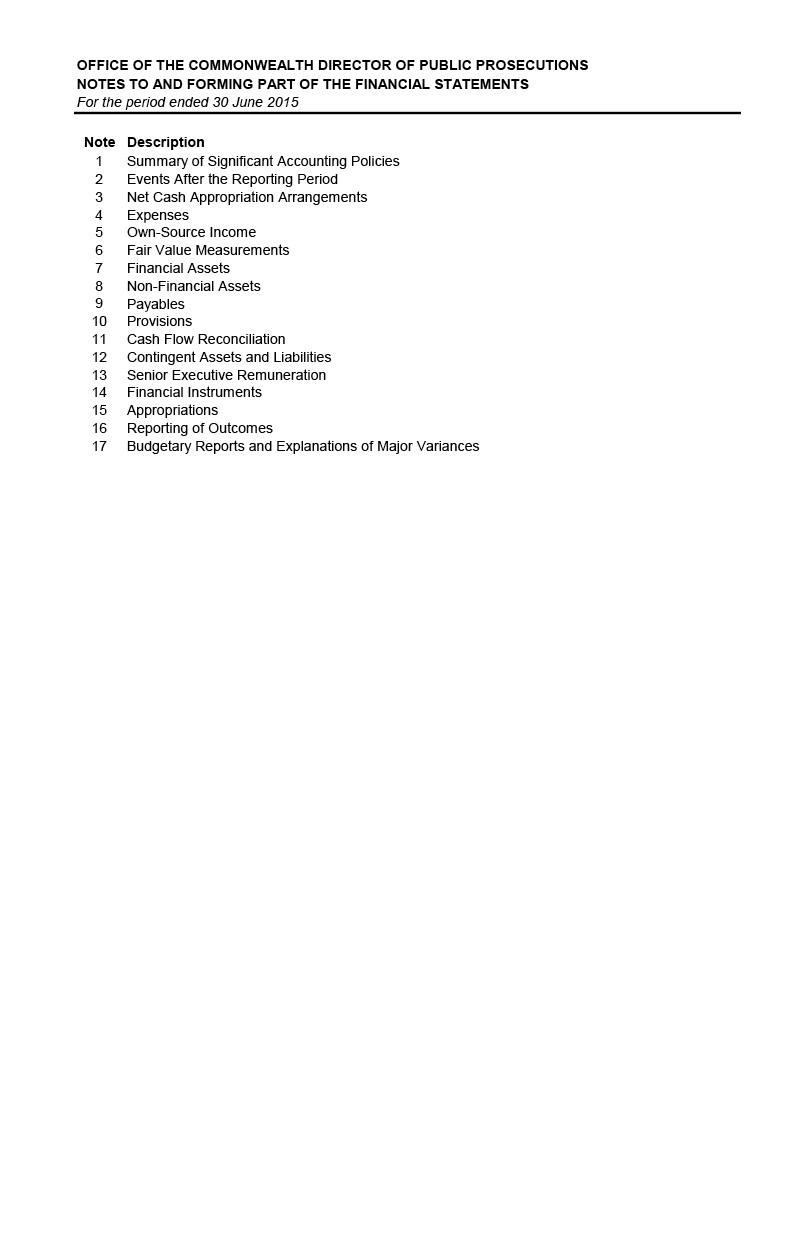
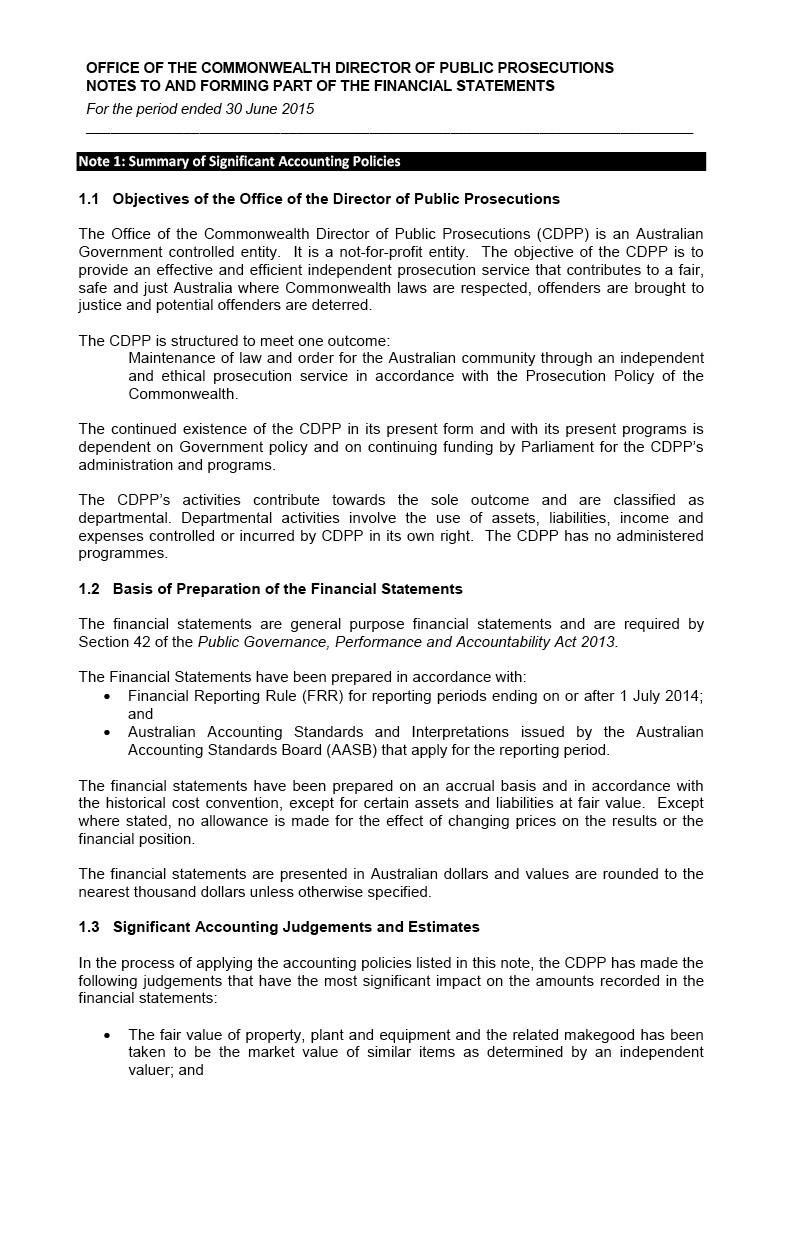
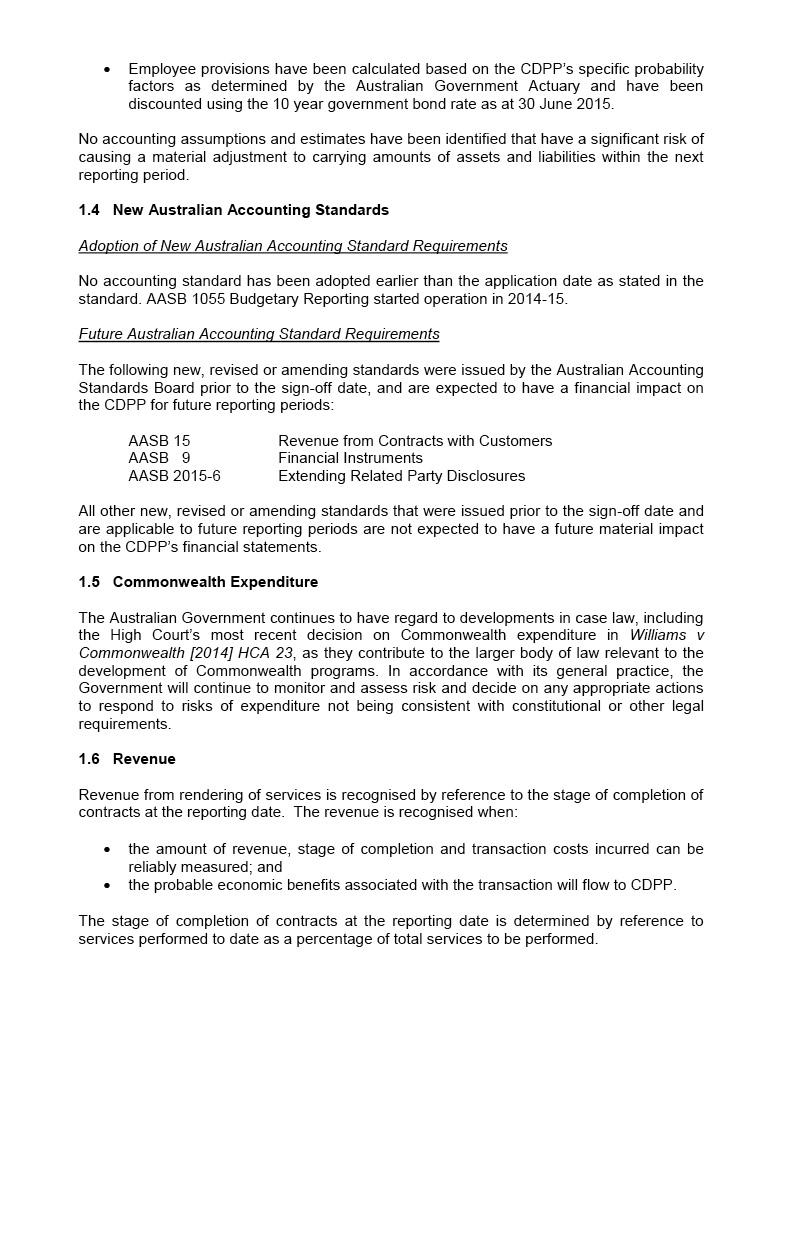
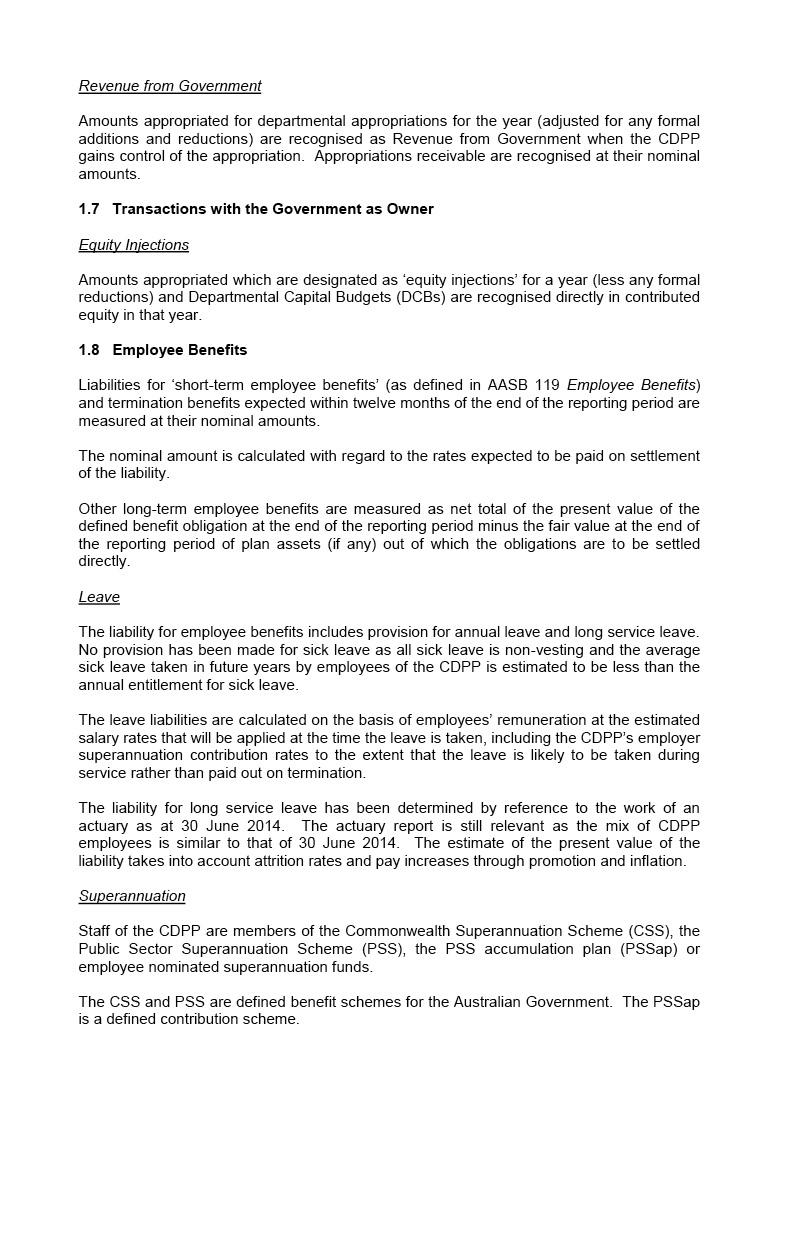
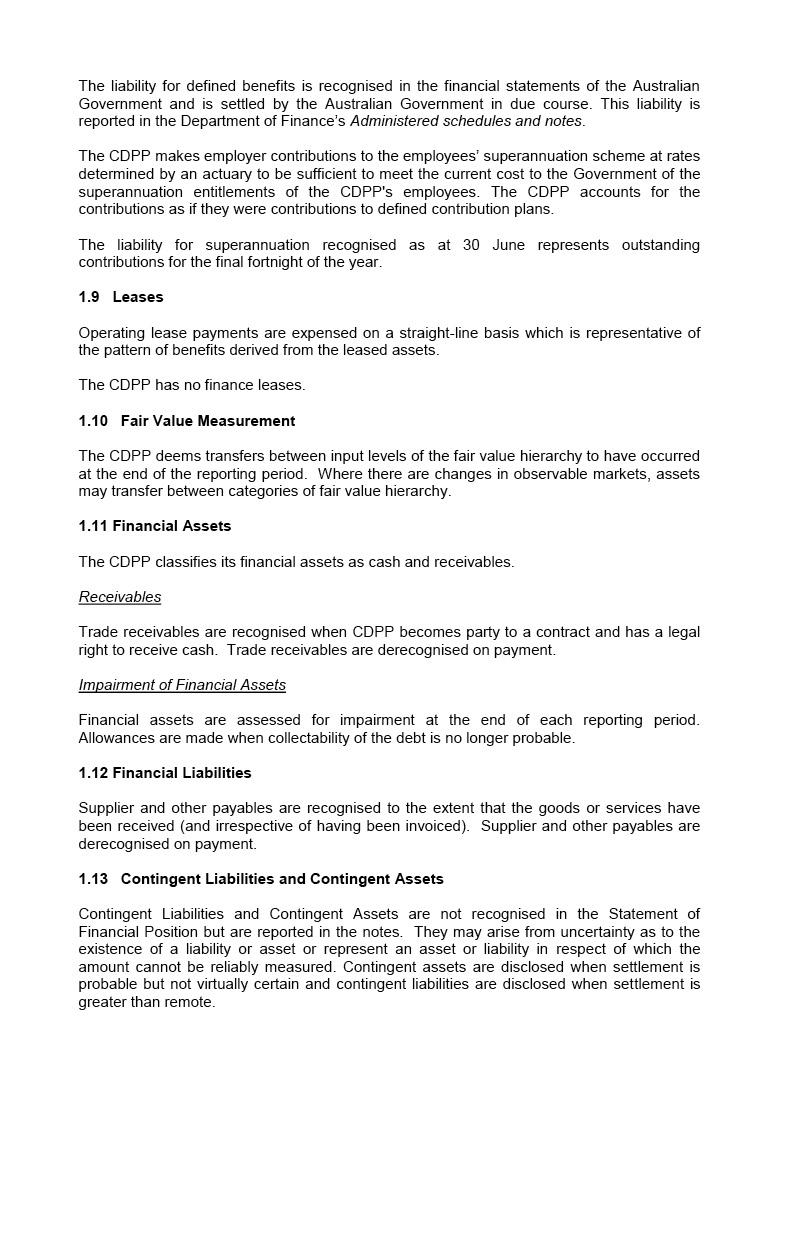
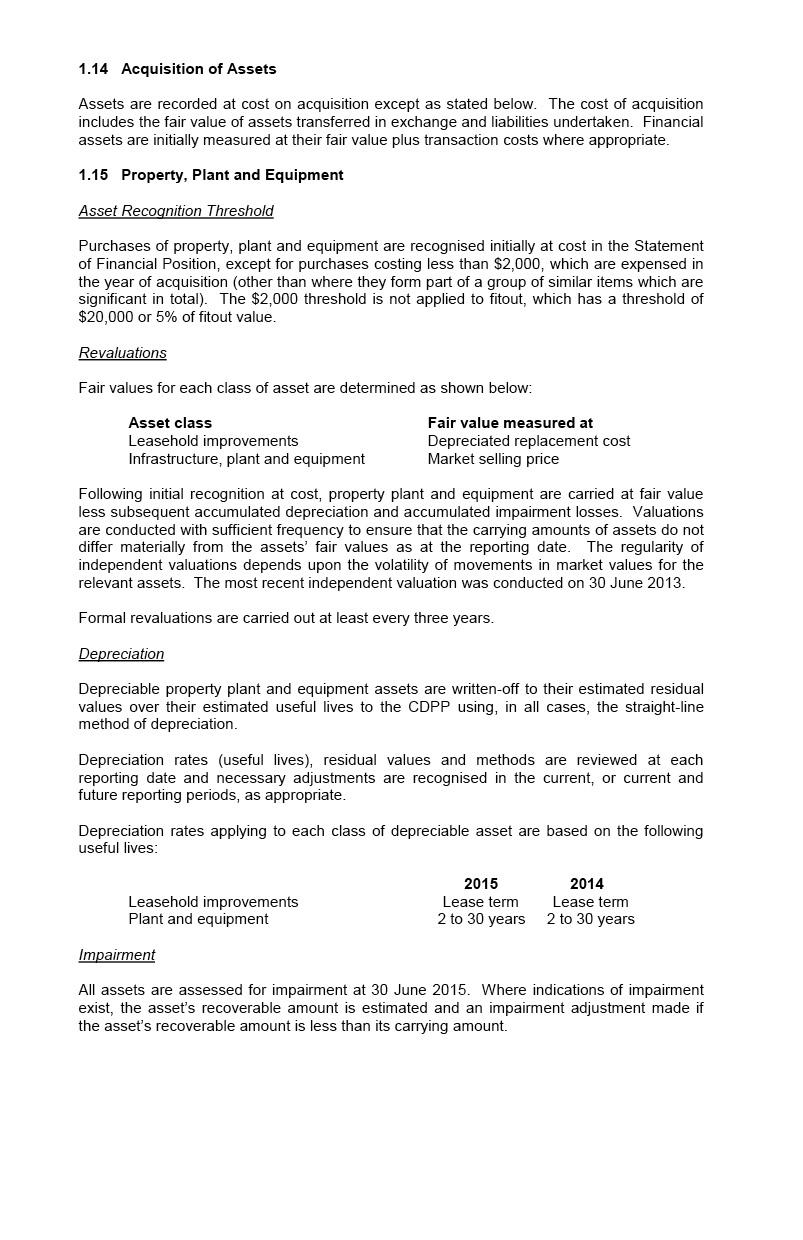
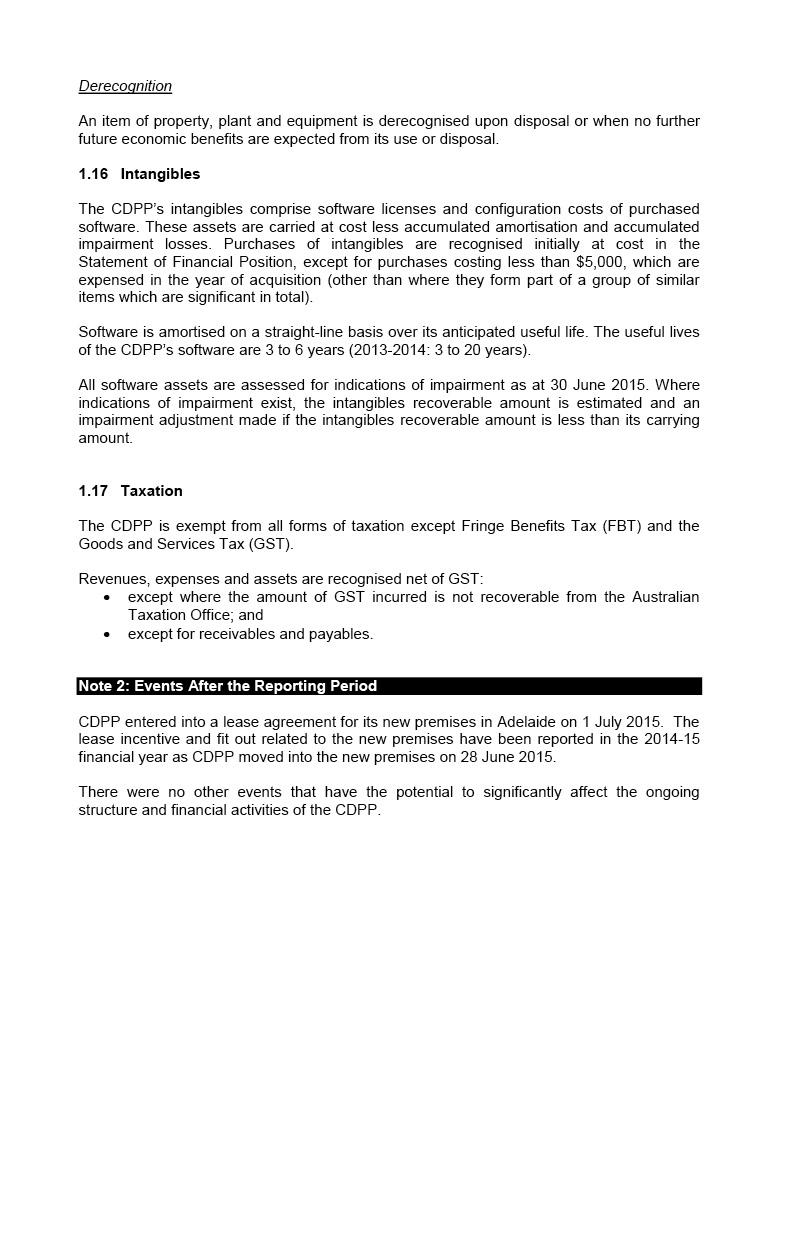
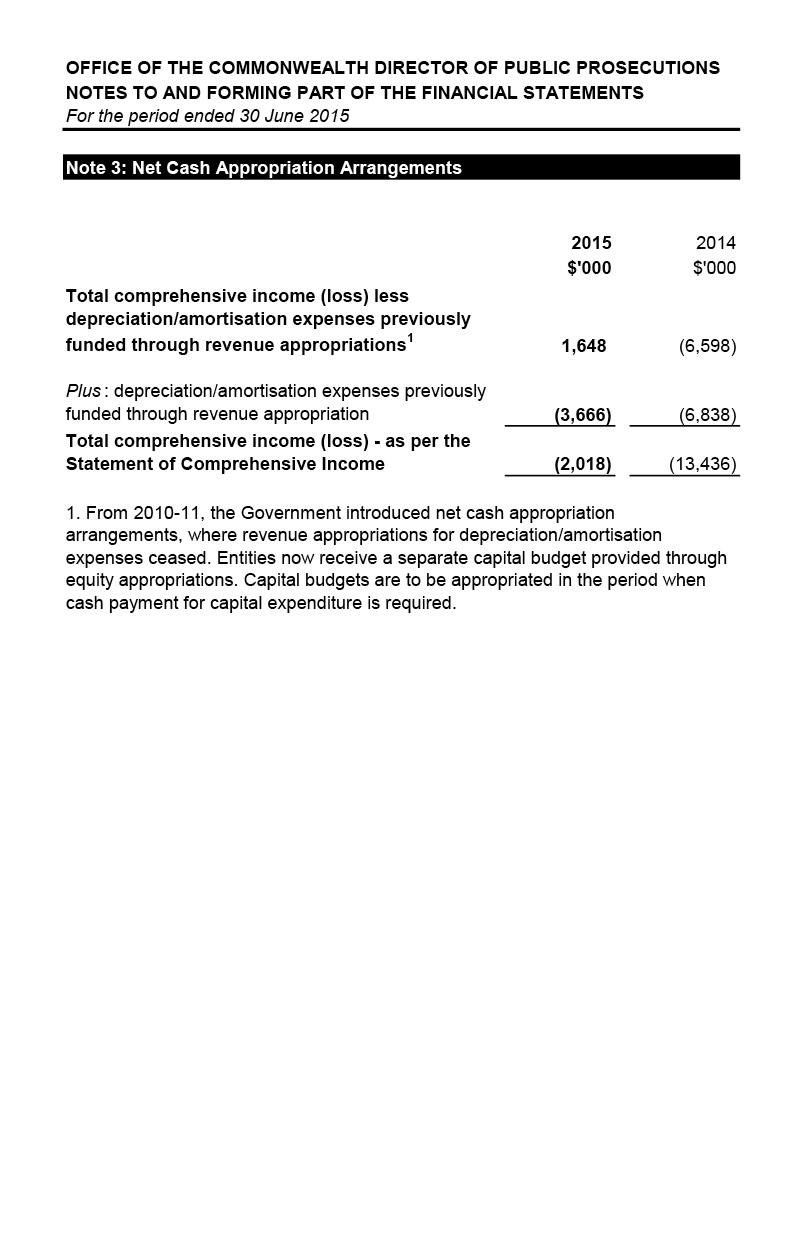
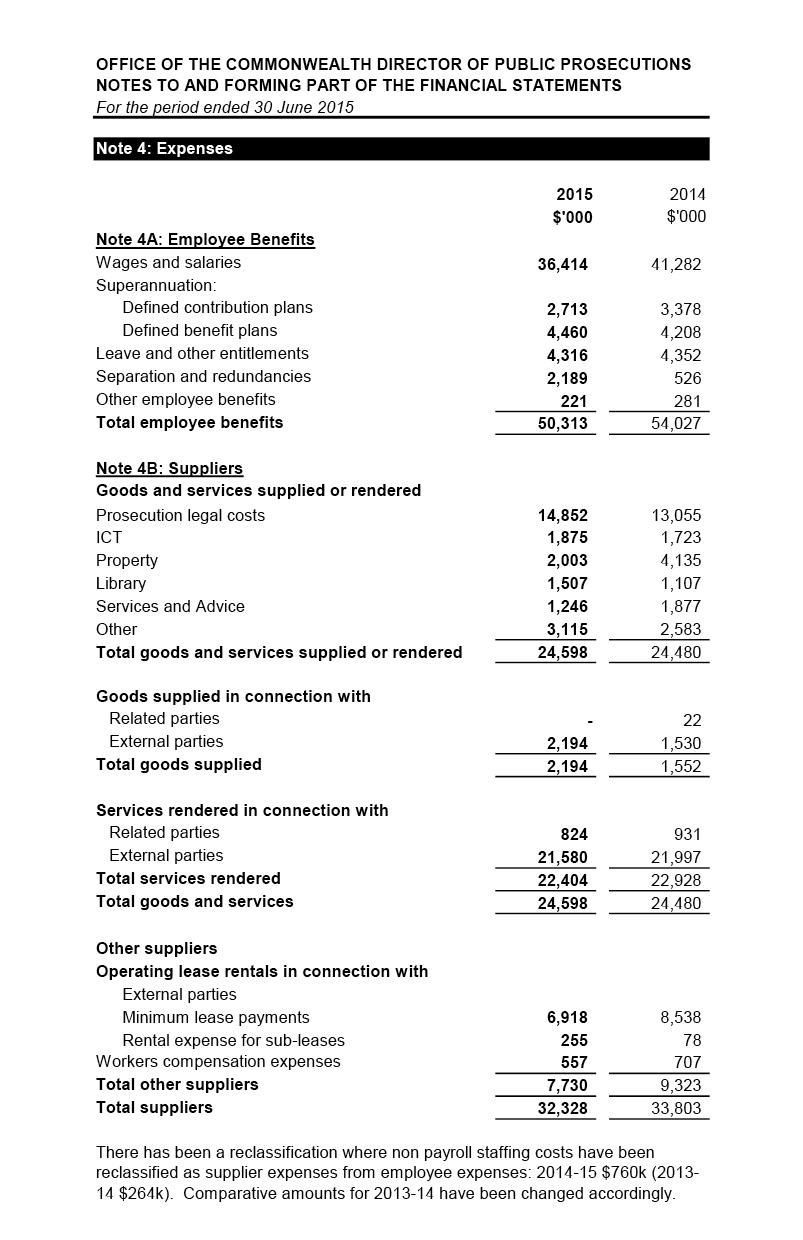
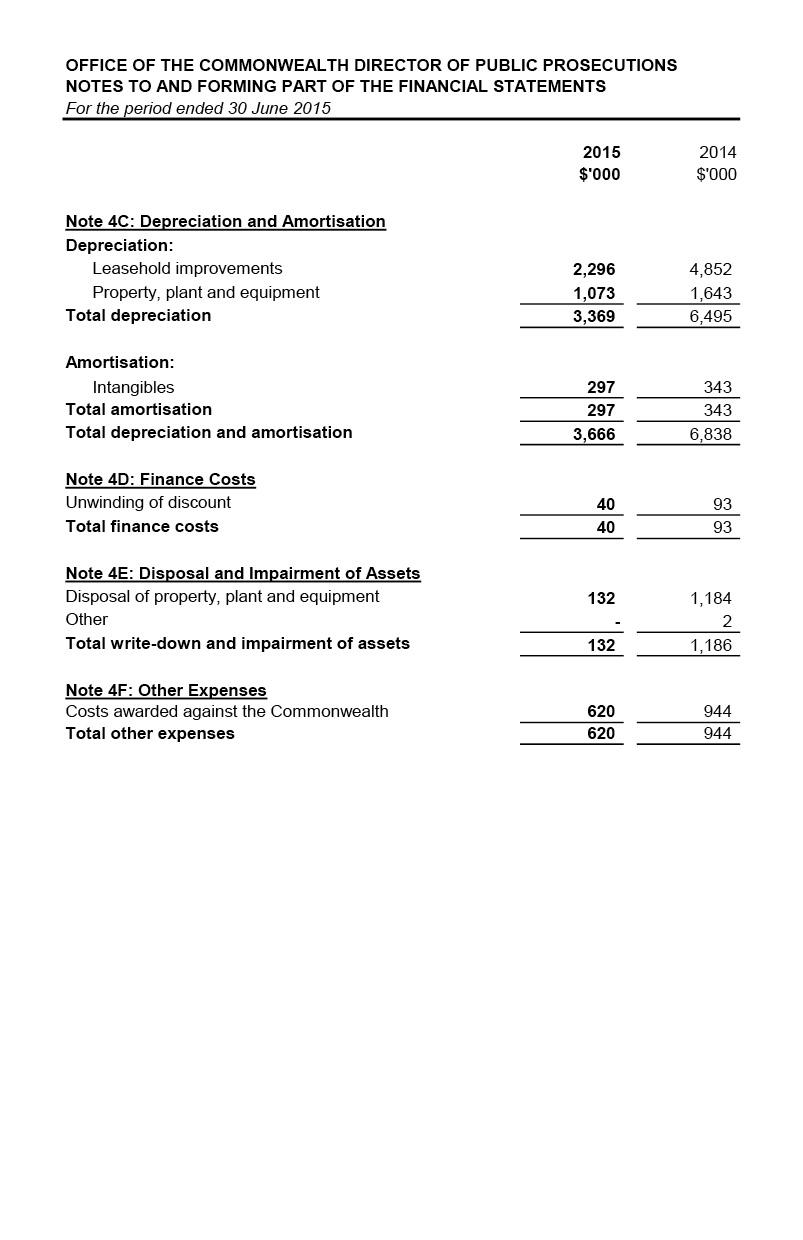
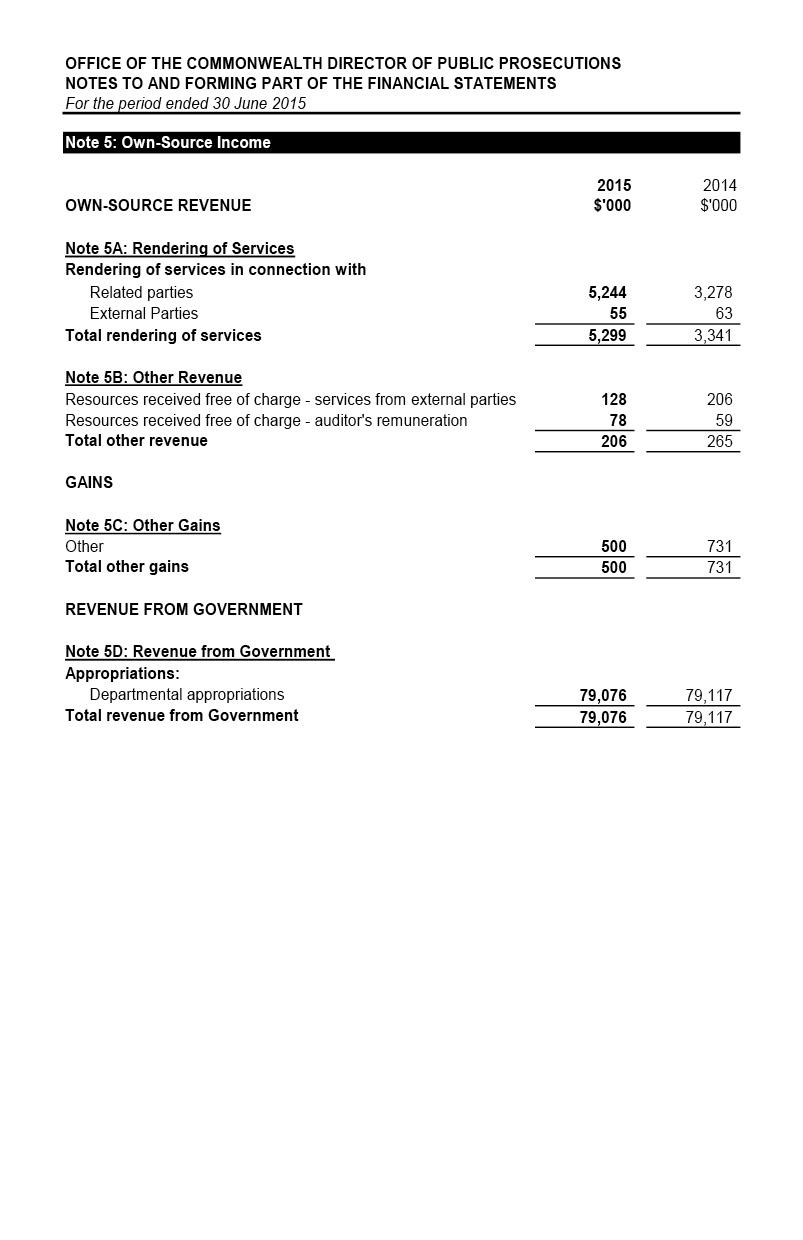
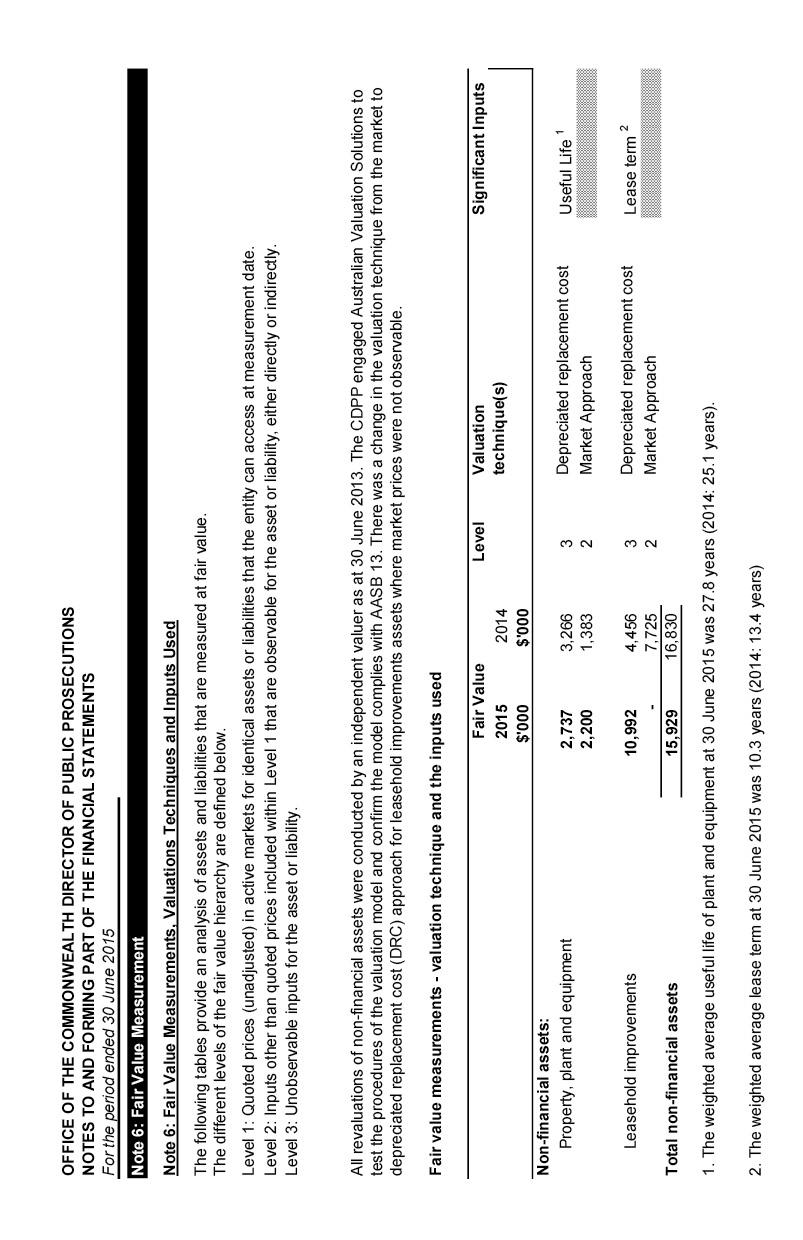
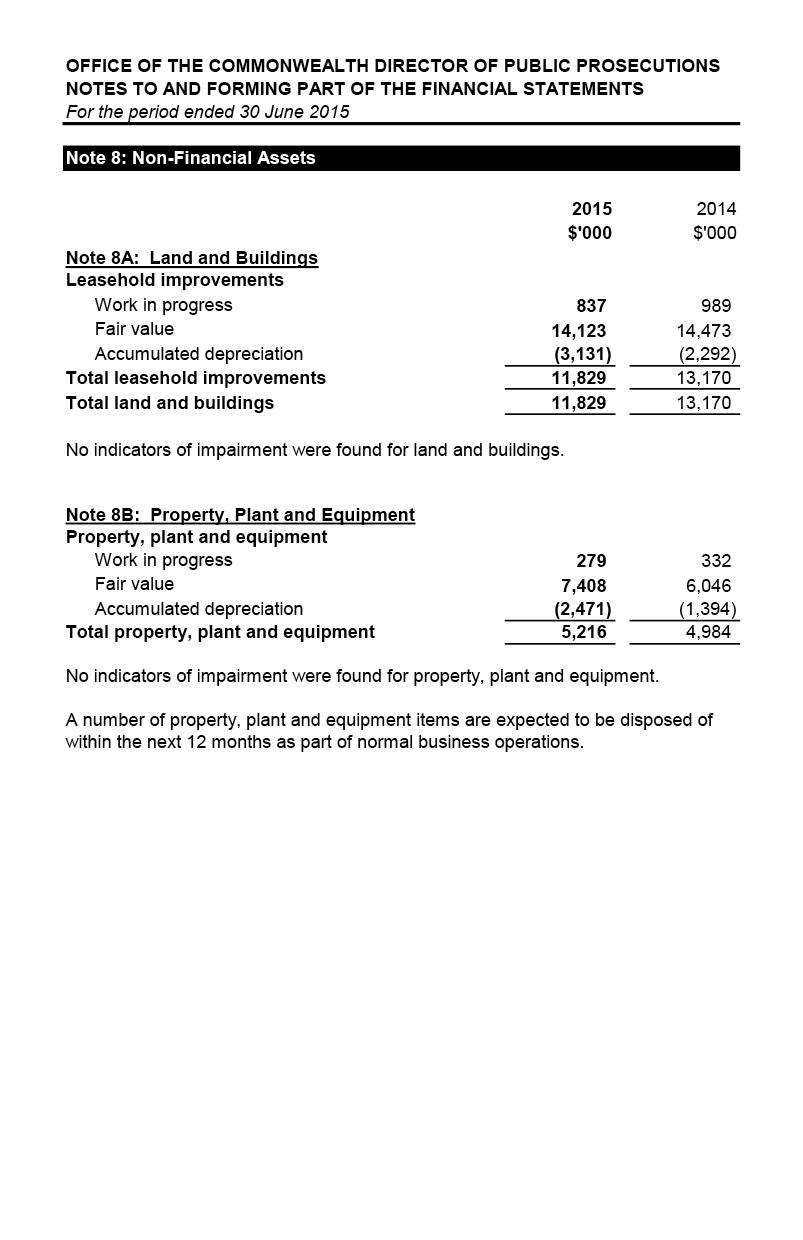
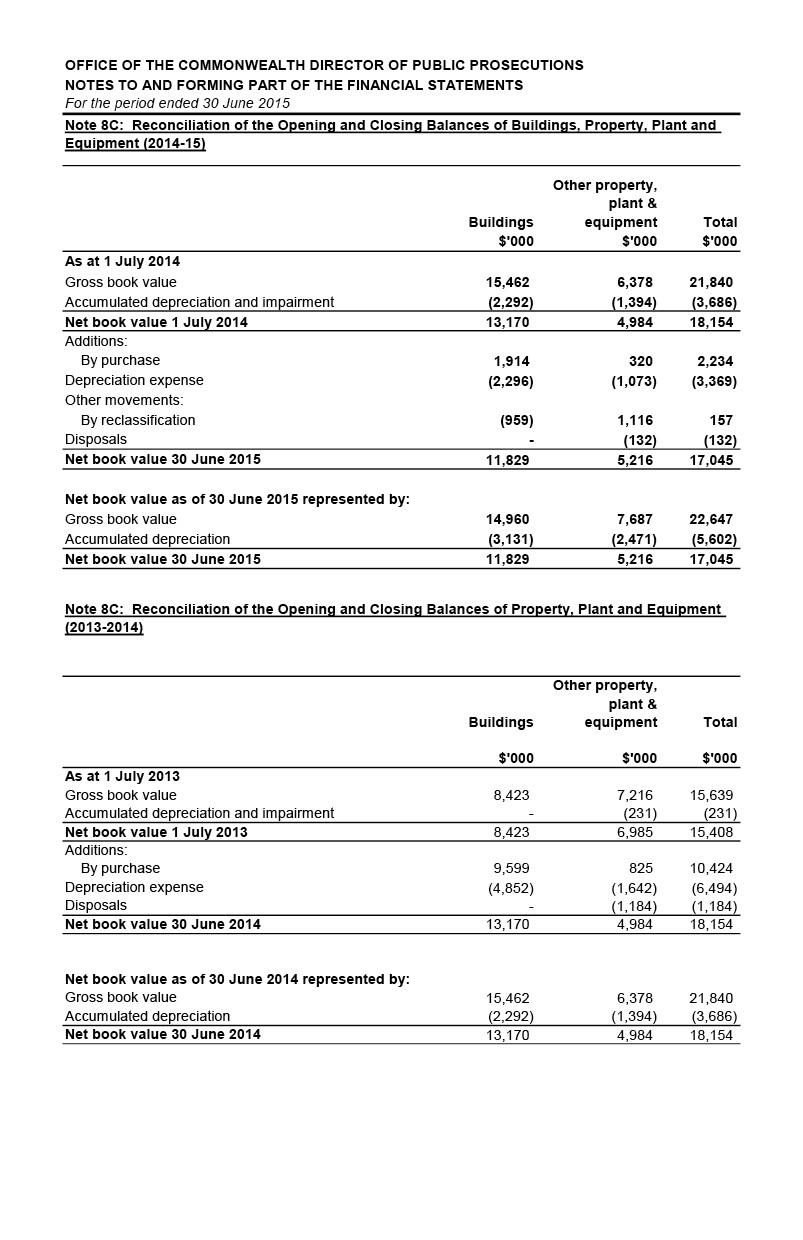
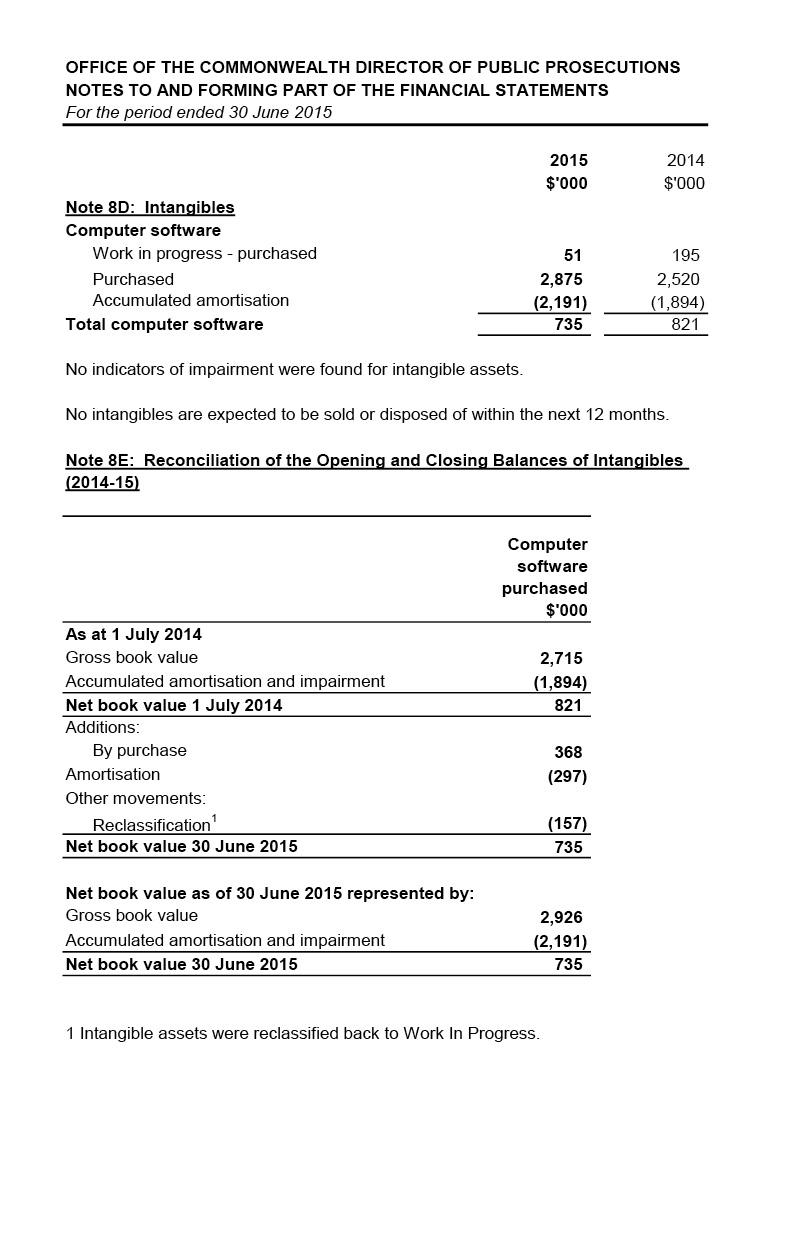
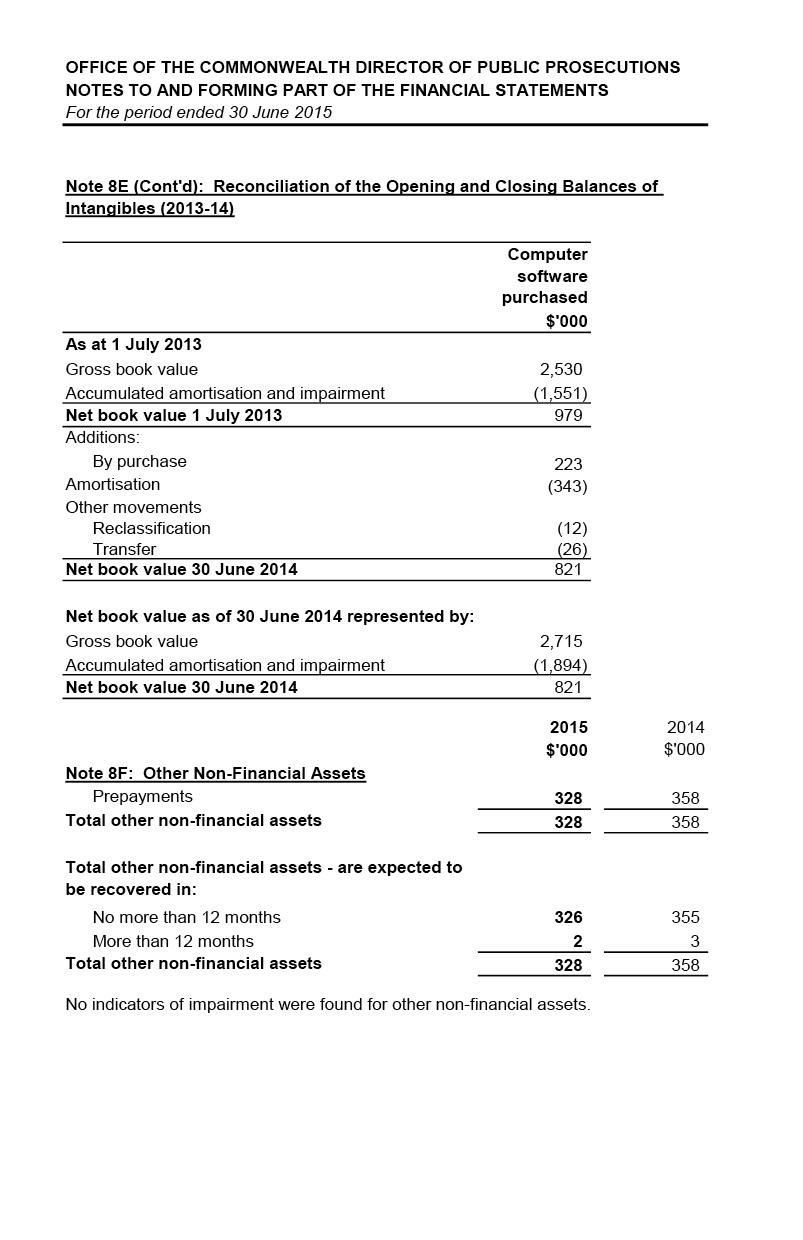
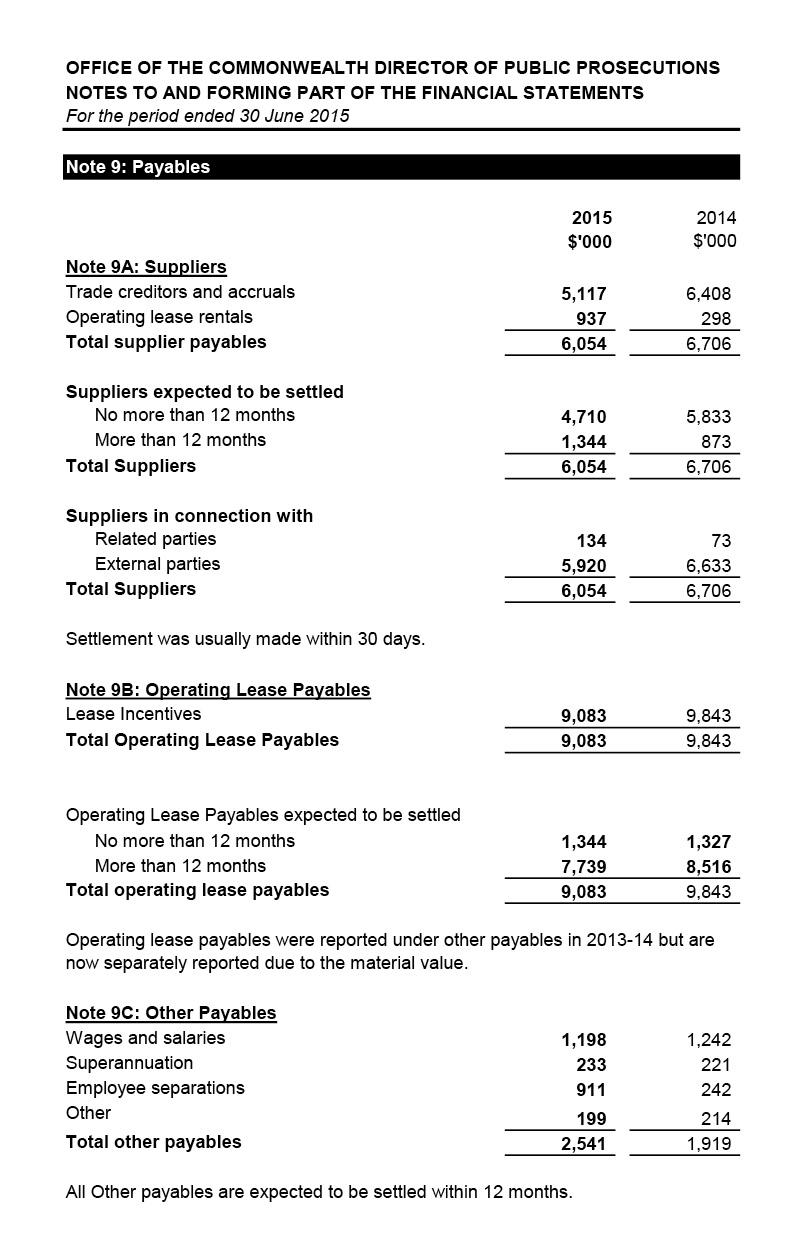
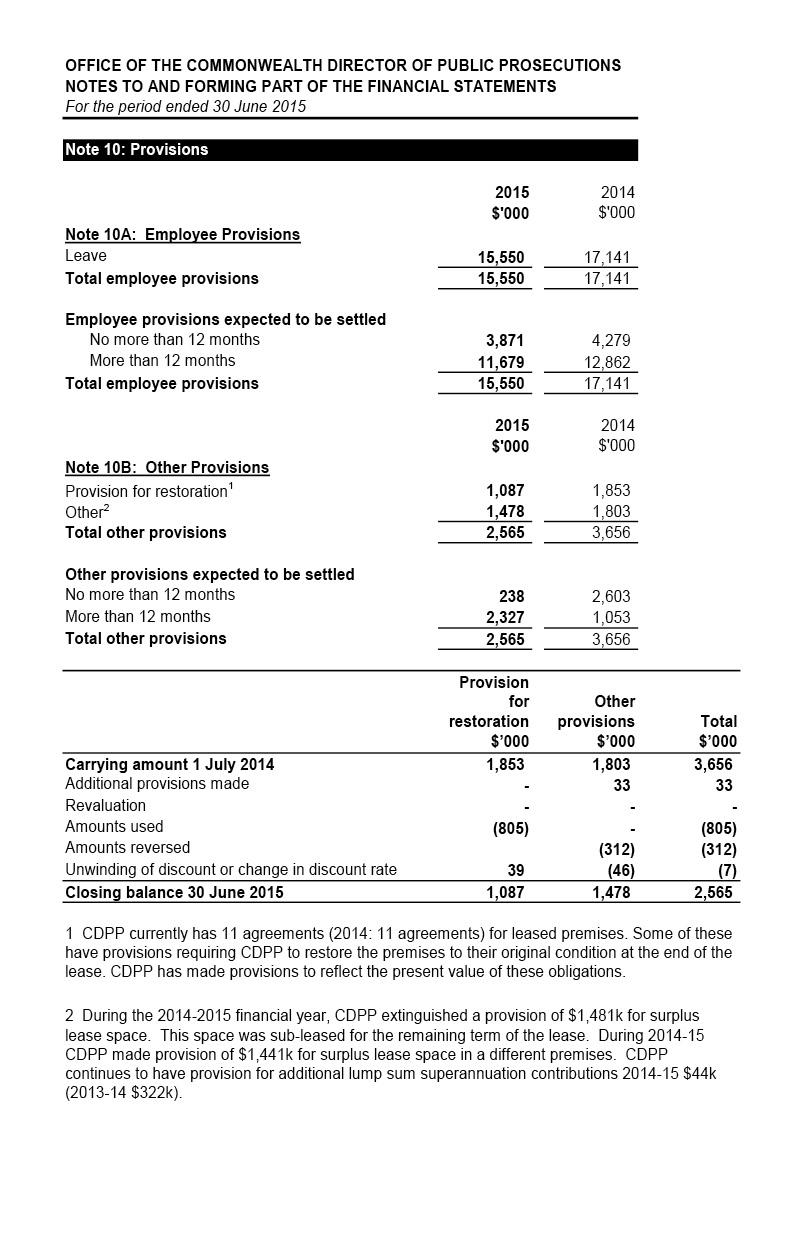
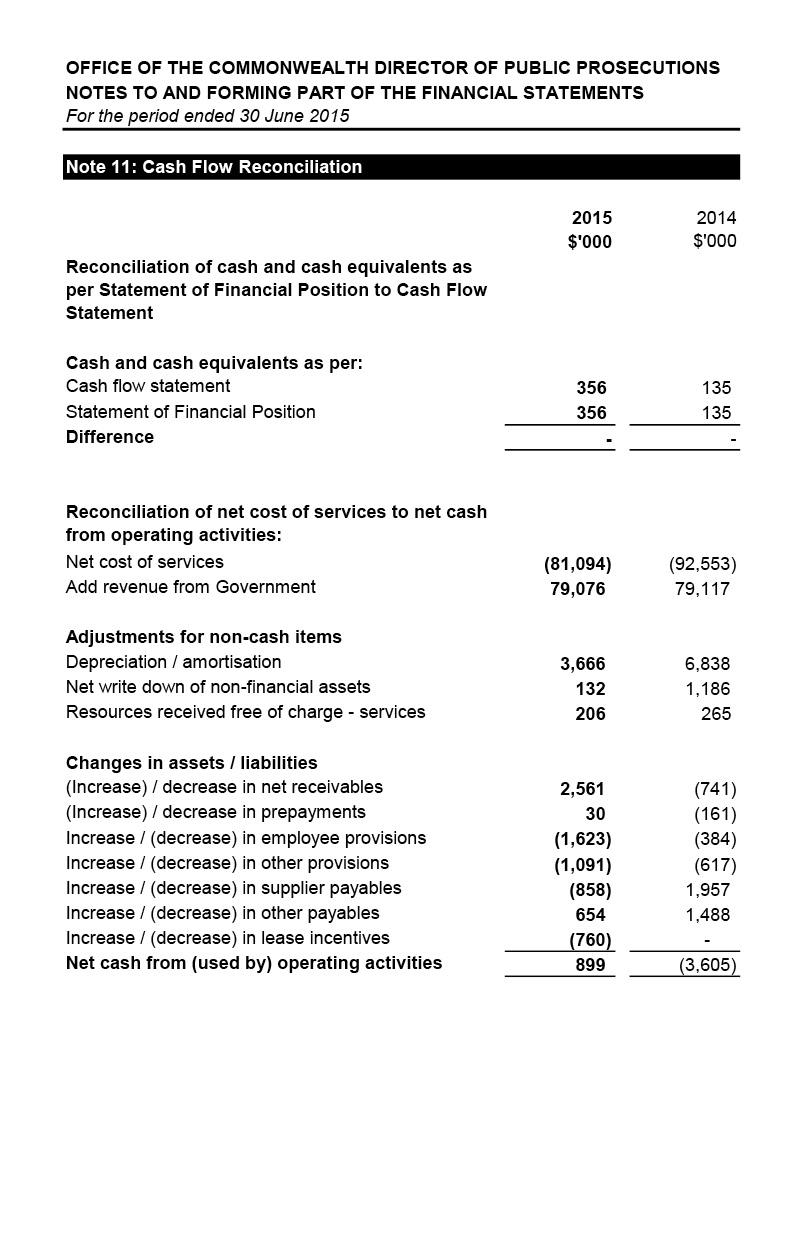
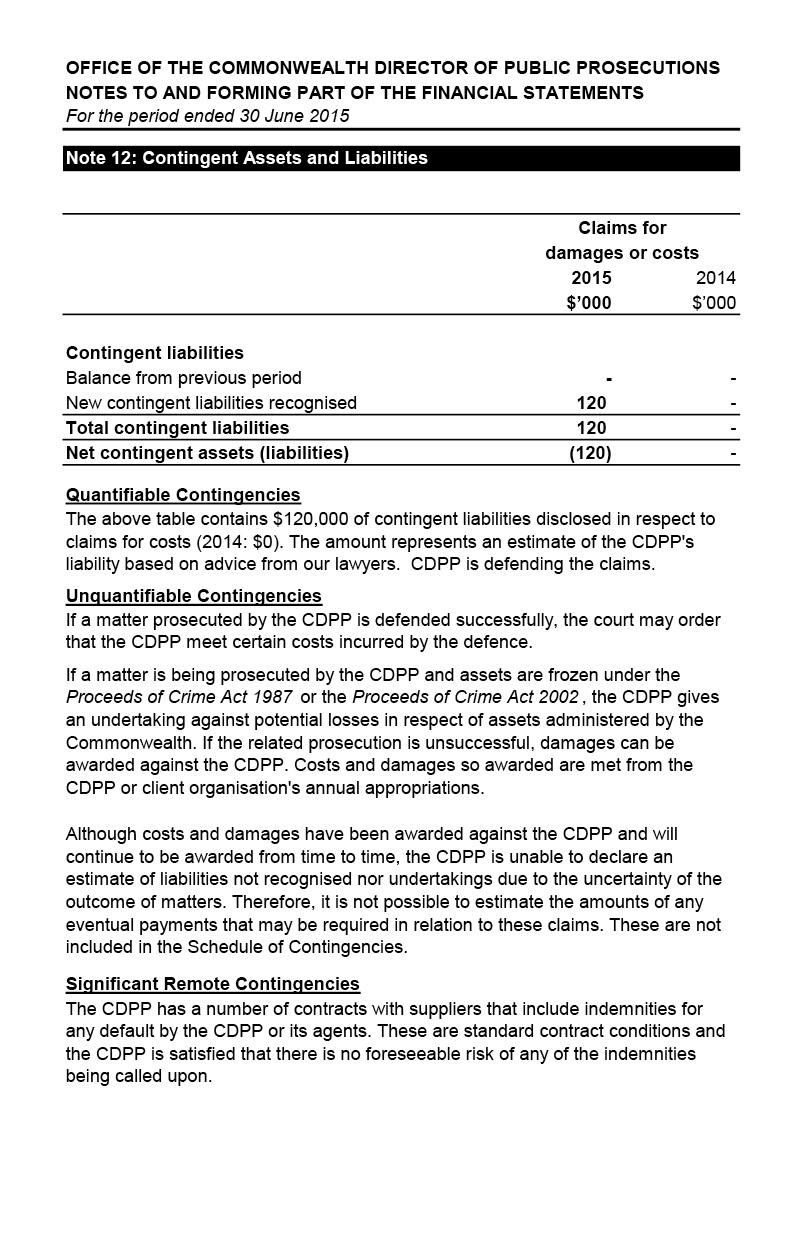
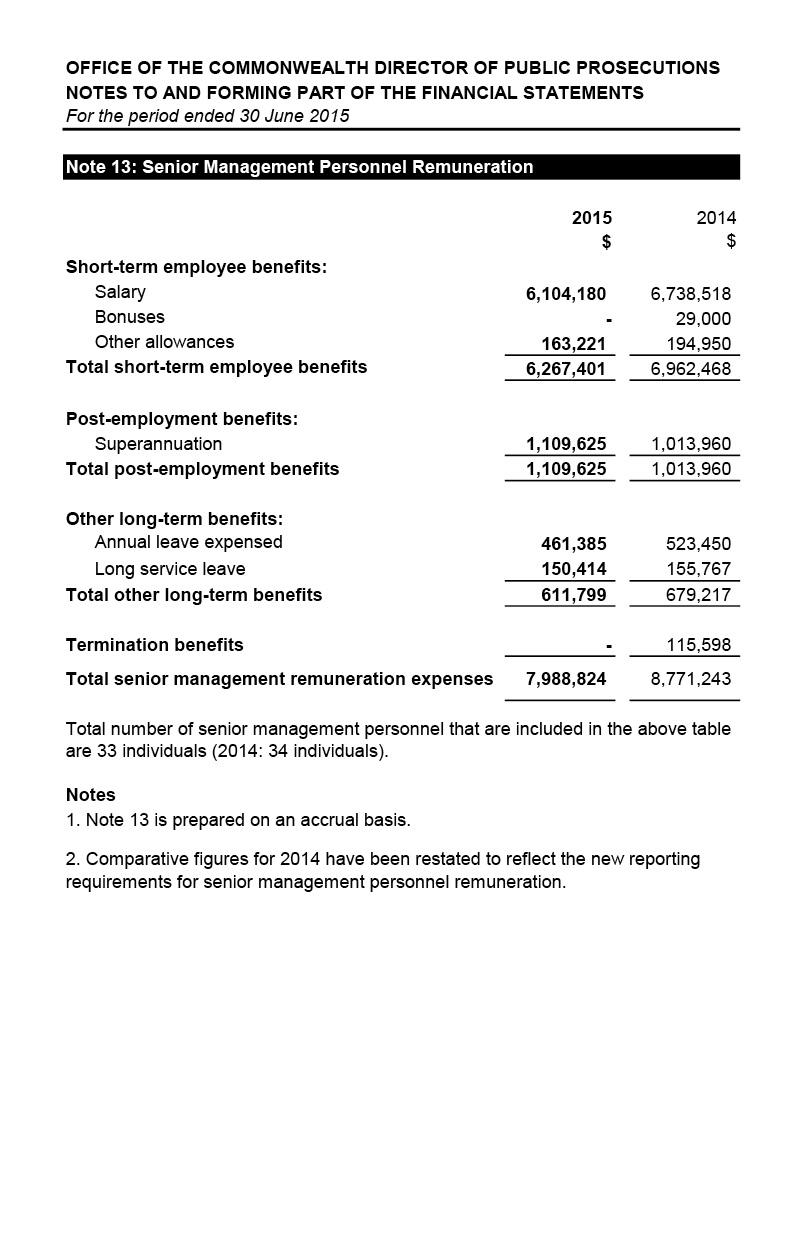
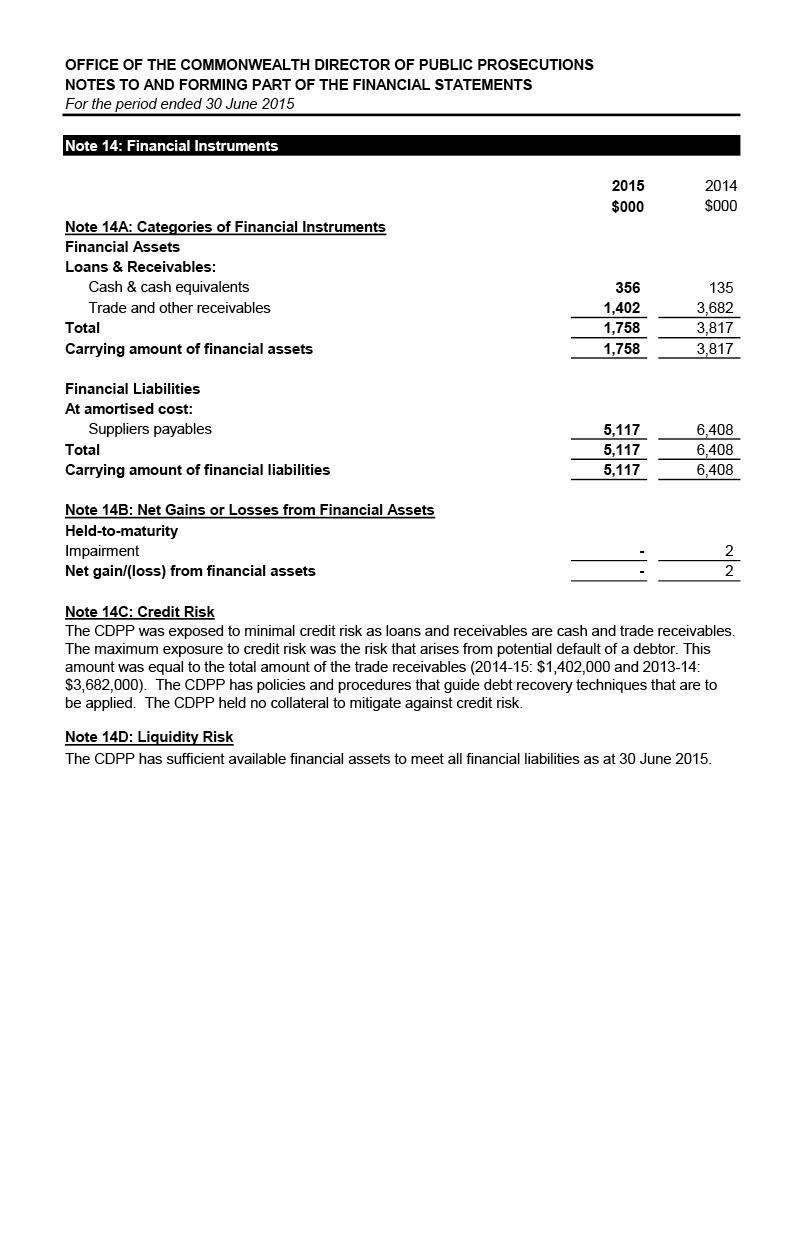
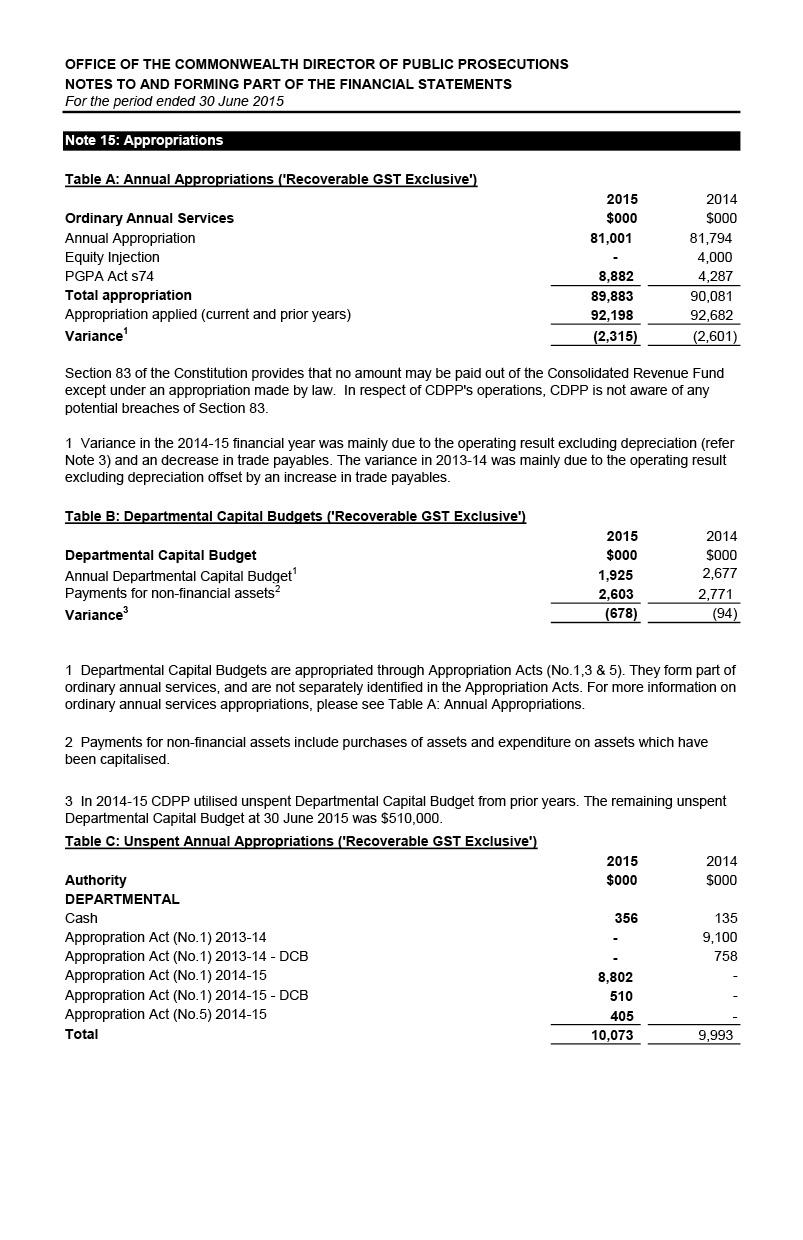
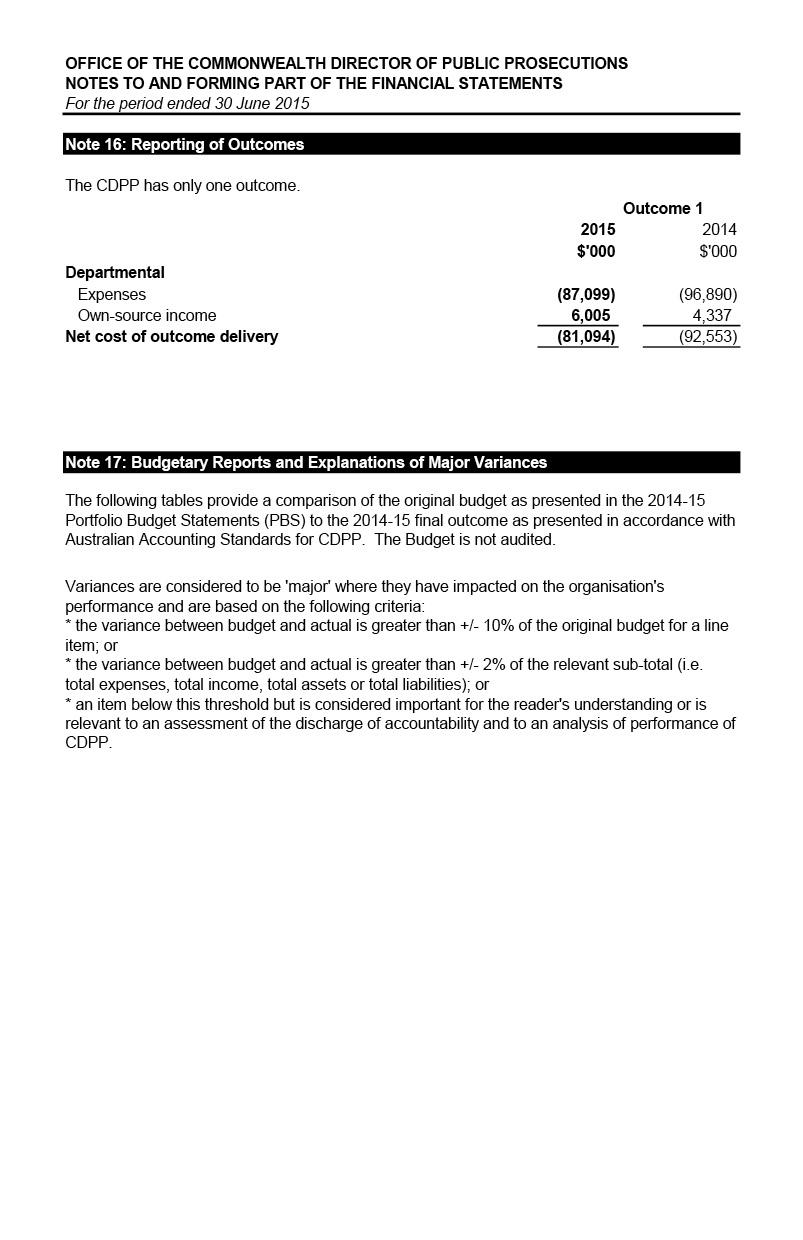
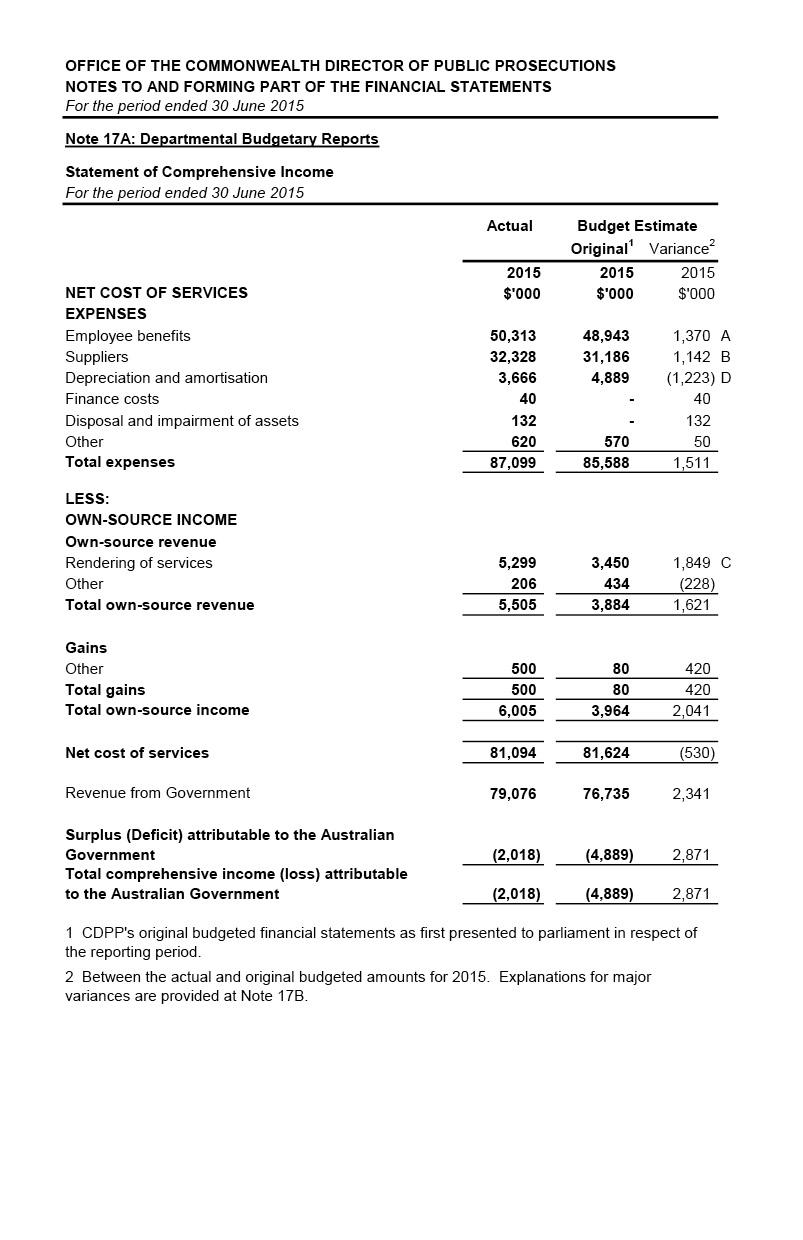
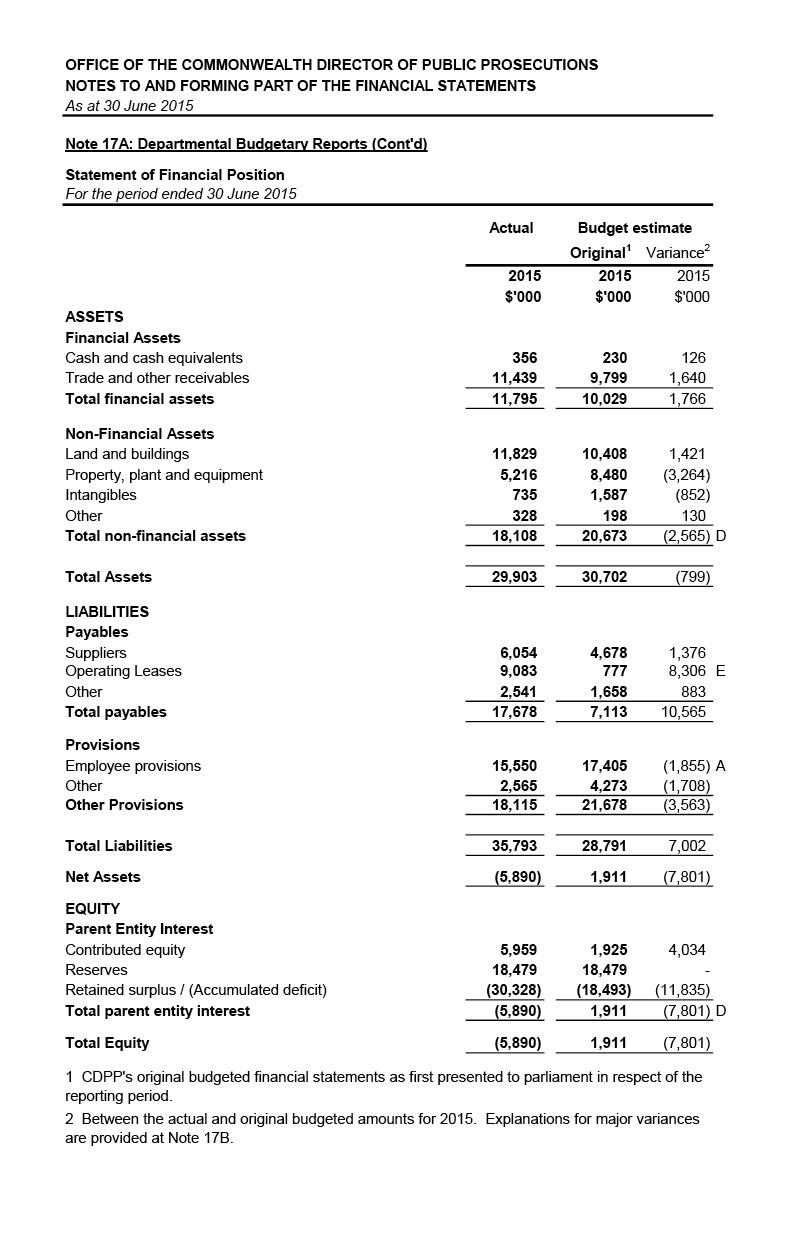
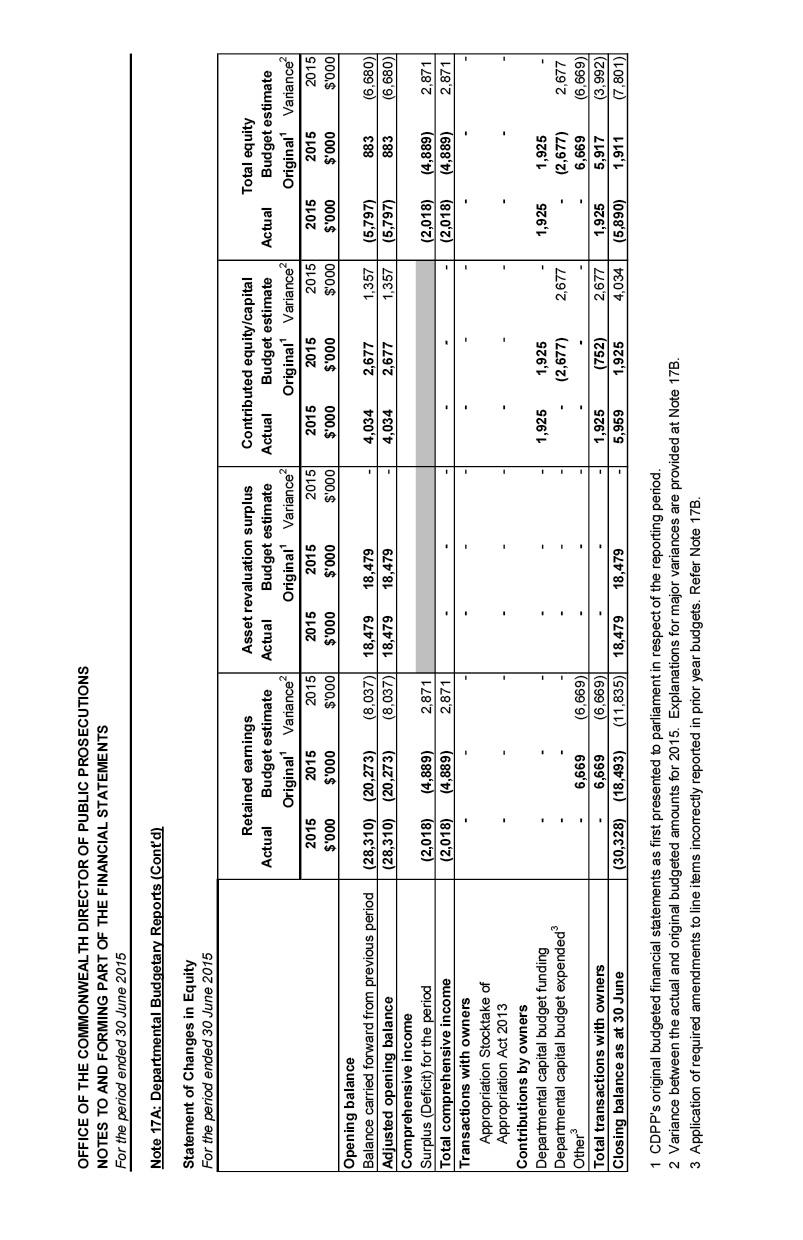
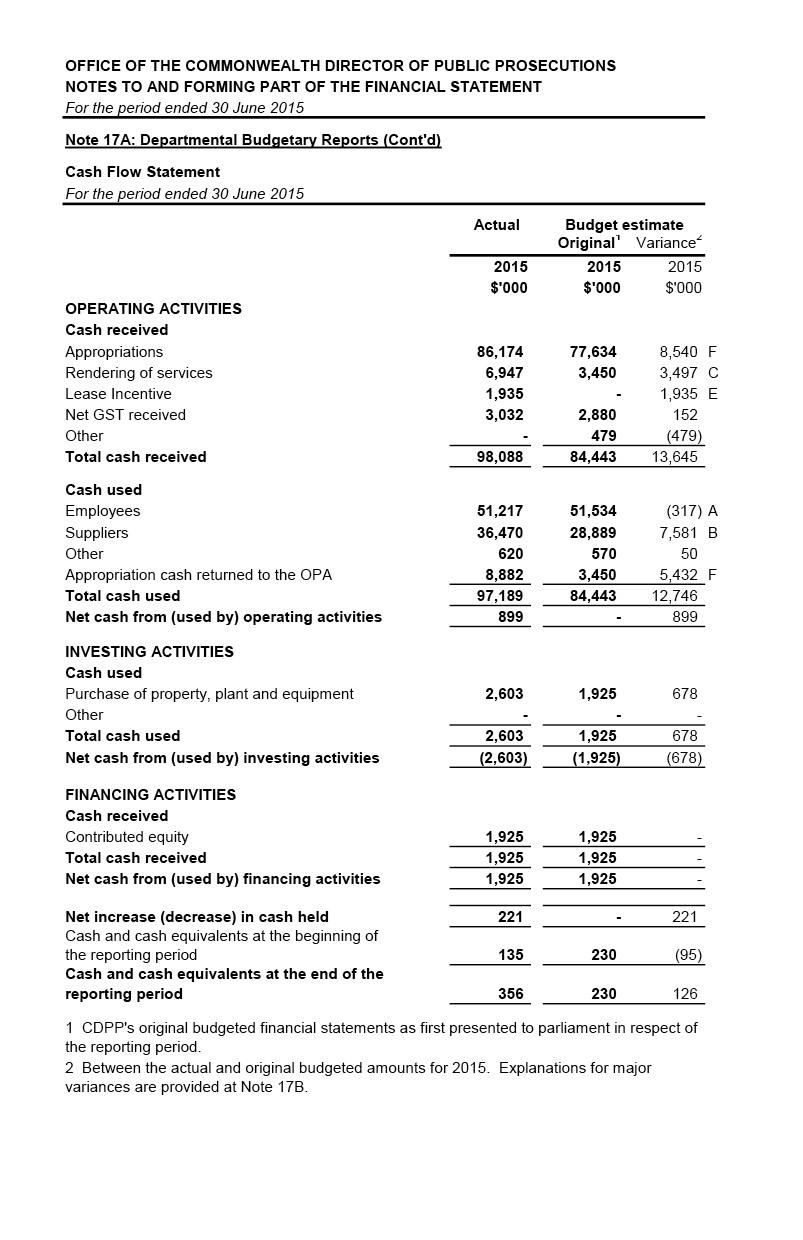
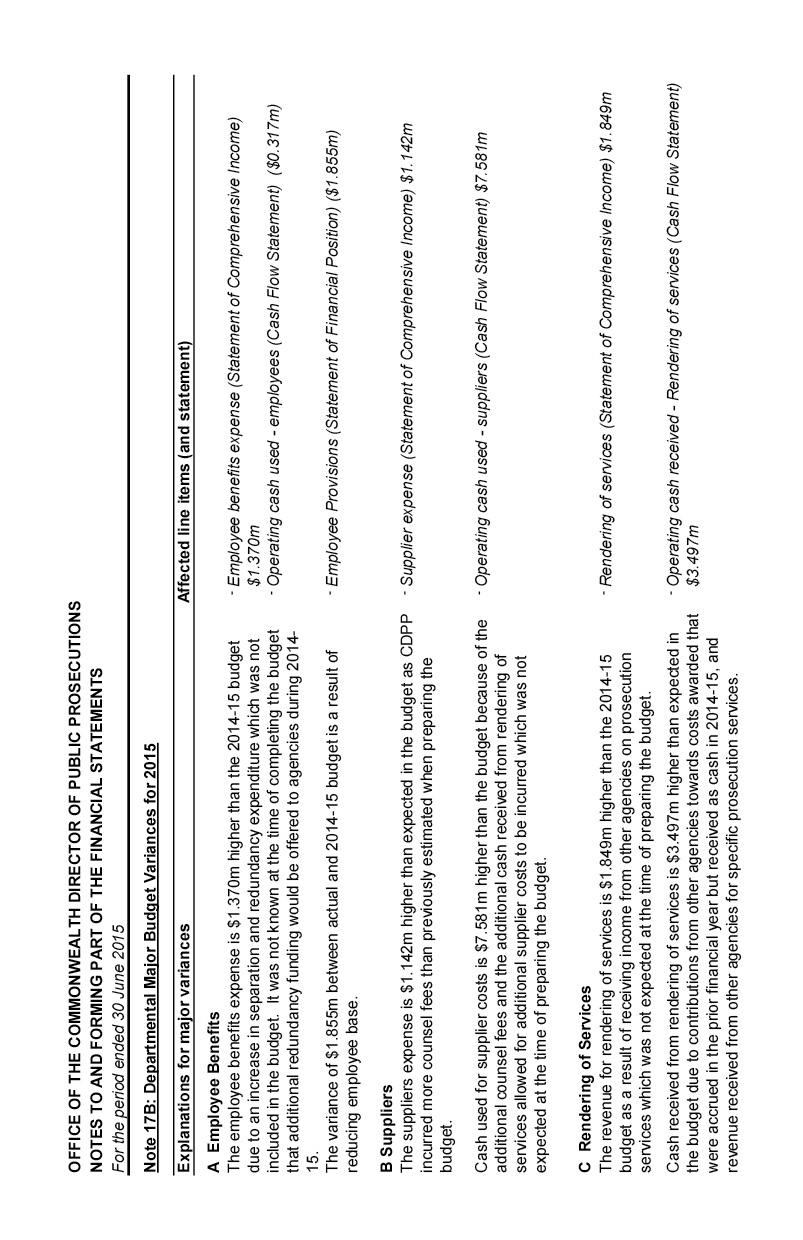
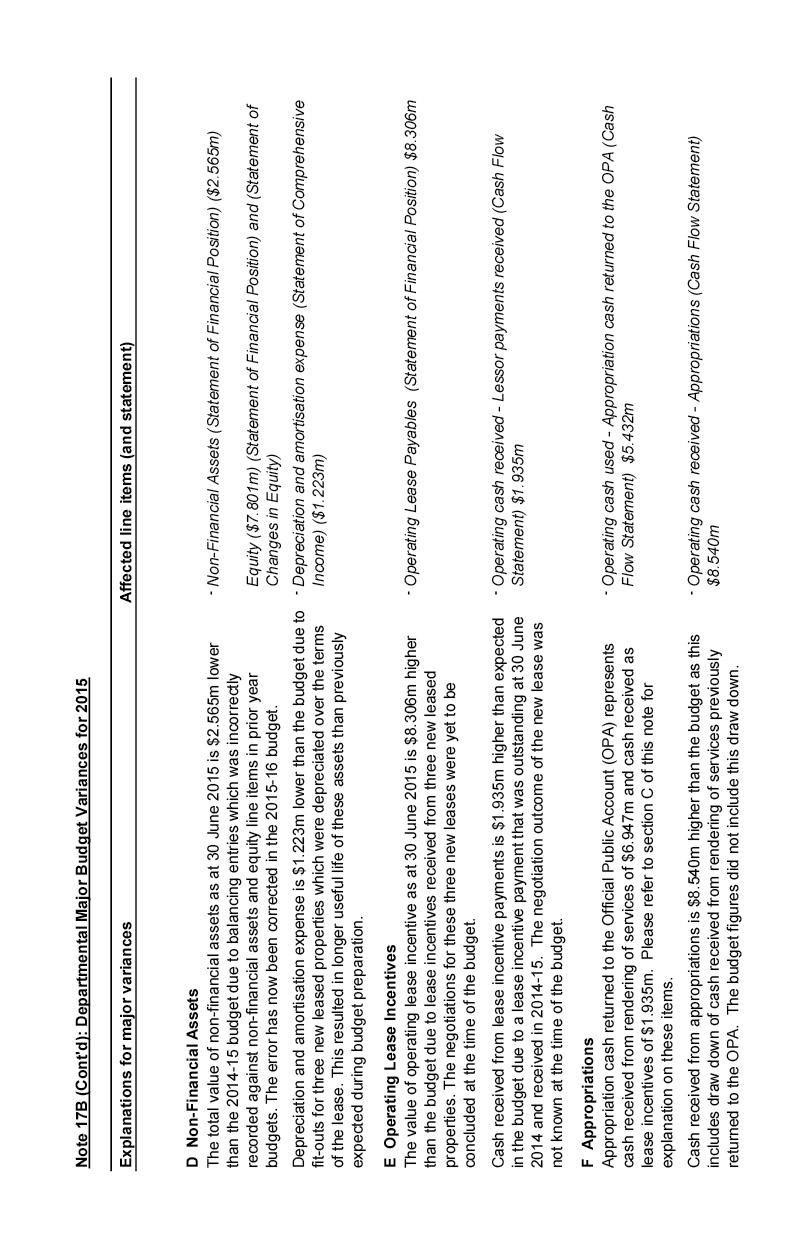
10 APPENDICES & REFERENCES
Appendix 1. Information Publication Scheme
The CDPP is subject to the Freedom of Information Act 1982 (FOI Act) and is required to publish information to the public as part of the Information Publication Scheme (IPS). This requirement is in Part II of the FOI Act and has replaced the former requirement to publish a section 8 statement in an annual report. The CDPP website displays a plan showing what information is published in accordance with the IPS requirements.
Appendix 2. Work Health and Safety
The CDPP continues to strengthen our Work Health and Safety Management System (WHS Management System) with the addition of a suite of policies and procedures designed to meet the associated Australian Standards. The system is intended to be easily understood and applied at a working level, allowing workers greater responsibility for WHS management in their respective areas, consistent with the Work Health and Safety Act 2011.
As part of this process we have analysed incident data over the past five years to identify the highest priority WHS issues within the CDPP. This has allowed us to make evidence-based decisions on how to strategically target remedial resources and to implement procedures to reduce the number and severity of WHS incidents. As an example, we increased the number of resilience checks by 30 per cent during 2014–15 to examine the wellbeing of staff exposed to potentially upsetting items of evidence. These checks included workers who may have only had episodic contact with this material. Likewise, falls and manual handling injuries, resulting from, among other things, carrying large volumes of material to and from court, make up the highest proportion of compensable injuries over the past five years. As a result we have piloted practical manual handling training with a view to offering a blend of electronic and face-to-face learning designed to reduce the incidence of these workplace injuries.
There were no notifiable incidents during 2014–15 that arose out of conducting our businesses or undertakings. There were no investigations conducted during the period that relate to the businesses or undertakings conducted by the CDPP, nor any notices given to the CDPP during 2014–15 under Part 10 of the Work Health and Safety Act 2011.
In 2013–14 we reviewed rehabilitation policies and procedures. As a result we redeveloped our previous Rehabilitation and Return to Work Arrangements into a Rehabilitation Management System (RMS). The CDPP RMS provides the framework for efficient rehabilitation management in the CDPP. It includes elements of current good practice in injury management, recognises our legislative obligations and identifies the key processes and procedures required to support sustainable return-to-work outcomes for all staff. We provide injury management and rehabilitation for both compensable and non-compensable injuries and illnesses.
Injury Prevention and Early Intervention
One of the key principles of the RMS is a managed process involving injury prevention and early intervention with appropriate and timely services based on assessed needs.
We continue to focus on reducing the lifetime cost of injury claims through current and emerging injury prevention strategies and provision of early intervention. These strategies are aimed at rehabilitating and returning staff to the workplace as quickly as possible. The Early Intervention Programme provides timely and tailored support to injured/ill workers and includes provision of short-term treatment (physical or psychological), and access to Employee Assistance Programme support, workplace rehabilitation providers, workplace assessments and fitness for duty medical assessments.
Workers’ compensation
In 2014–15 a total of three workers compensation claims were accepted, compared with four in 2013–14.
Mechanism of injury descriptors are based on a national classification system that assists in identifying injury trends and setting injury prevention performance targets. There has been no remarkable change in injury trends in the last two years.
Employee Assistance Programme
During 2014–15, the Employee Assistance Programme utilisation rate (new referrals) was 6.25 per cent of the total CDPP workforce. The percentage of personal to work-related issues, as the primary reason for accessing this service, was 44.44 per cent to 55.56 per cent respectively.
Appendix 3. Advertising and market research
Under section 311A of the Commonwealth Electoral Act 1918, we are required to disclose payments of $12,565 or more (including GST) for advertising and market research.
We did not undertake any advertising campaigns during 2014–15. We did not use the services of any creative advertising agencies to develop advertising campaigns. We also did not use the services of market research organisations, polling organisations or direct mailing organisations.
Appendix 4. Ecologically sustainable development and environmental performance
One of our priorities is the ongoing efficient and effective management of resources. A number of CDPP initiatives contribute to a more sustainable environment.
We use a range of energy saving methods in our operations including:
- using technology to minimise energy use, including automatic power down devices on electrical equipment
- ensuring all of our computer equipment is energy star enabled
- sourcing a component of electricity costs for Sydney, Melbourne and Canberra offices from green energy options
- recycling waste paper and giving preference to environmentally sound products when purchasing office supplies
- providing staff with access to video and teleconferencing facilities in our offices with the aim of reducing the overall amount of air travel undertaken
- incorporating lighting that is activated by movement detectors in the new office fit outs for our Sydney and Adelaide offices.
Environmental performance
| Performance 2014–15 | |
|---|---|
| Office tenant light and power | |
| Electricity | 1,098,092 (kWh) |
| Green power | 165,469 (kWh) |
| Total | 3,954.6 (GJ) |
| Total electricity consumed per employee | 9,872.8 (MJ) |
| Passenger vehicles | |
| Petrol | 10,231 (L) |
| Total | 349.9 (GJ) |
| Distance | 121,708 (km) |
| MJ/km | 2.88 |
| Total CDPP consumption | 4,304.5 (GJ) |
Notes: CDPP sites for the reporting period included Canberra, Sydney, Melbourne, Brisbane, Perth, Adelaide, Hobart, Darwin, Townsville and Cairns.
Appendix 5. Agency Resource Statements and Resources for Outcomes
| Actual available appropriation for 2014–15 $’000 (a) | Payments made 2014–15 $’000 (b) | Balance remaining 2014–15 $’000 (a)–(b) | |
|---|---|---|---|
| Ordinary annual services departmental appropriation | |||
| Prior-year departmental appropriation | 9,993 | 9,993 | 0 |
| Departmental appropriation¹ | 81,001 | 70,928 | 10,073 |
| s.74 relevant agency receipts | 8,882 | 8,882 | 0 |
| Total | 99,876 | 89,803 | 10,073 |
1 Appropriation Act (No. 1) 2014–15 includes an amount of $1.925 million in 2014–15 for our departmental capital budget. For accounting purposes this amount has been designated as ‘contributions by owners’. Also includes funding provided through the 2014–15 Supplementary Additional Estimates.
Expenses and Resources for Outcome 1
| Outcome 1: Maintenance of law and order for the Australian community through an independent and ethical prosecution service in accordance with the Prosecution Policy of the Commonwealth | Budget 2014–15 $’000 (a) | Actual expenses 2014–15 $’000 (b) | Variation 2014–15 $’000 (a)–(b) |
|---|---|---|---|
| Programme 1.1: An independent service to prosecute alleged offences against the criminal law of the Commonwealth, in appropriate matters, in a manner which is fair and just and to ensure that offenders, where appropriate, are deprived of the proceeds and benefits of criminal activity. | |||
| Price of departmental outputs | 89,883 | 92,198 | 2,315 |
| Programme 1.1: Revenue from government (appropriations) for departmental outputs¹ | |||
| Expenses not requiring appropriation2 | 4,537 | 3,912 | 625 |
| Total price of departmental outputs | 94,420 | 96,110 | (1,690) |
Notes:
1. Departmental outputs combine revenue from government and revenue from independent sources (s74).
2. Departmental expenses not requiring appropriation in the budget year are made up of services received free of charge, depreciation and amortisation.
Appendix 6: List of reporting requirements
| Ref * | Part of Report | Description | Requirement | Location |
|---|---|---|---|---|
| 8(3) & A.4 | Letter of transmittal | Mandatory | Preliminary | |
| A.5 | Table of contents | Mandatory | Preliminary | |
| A.5 | Index | Mandatory | Chapter 11 | |
| A.5 | Glossary | Mandatory | Chapter 10 | |
| A.5 | Contact officer(s) | Mandatory | Chapter 11 | |
| A.5 | Internet home page address and Internet address for report | Mandatory | Chapter 11 | |
| 9 | Review by Secretary | |||
| 9(1) | Review by departmental secretary | Mandatory | Director’s Review—Preliminary | |
| 9(2) | Summary of significant issues and developments | Suggested | Director’s Review & Chapter 1–9 | |
| 9(2) | Overview of department’s performance and financial results | Suggested | Chapters 5–8 | |
| 9(2) | Outlook for following year | Suggested | Director’s Review—Preliminary | |
| 9(3) | Significant issues and developments – portfolio | Portfolio departments – suggested | Not Applicable | |
| 10 | Departmental Overview | |||
| 10(1) | Role and functions | Mandatory | Chapters 1–4 | |
| 10(1) | Organisational structure | Mandatory | Chapter 1 | |
| 10(1) | Outcome and programme structure | Mandatory | Chapter 1 | |
| 10(2) | Where outcome and programme structures differ from PB Statements/PAES or other portfolio statements accompanying any other additional appropriation bills (other portfolio statements), details of variation and reasons for change | Mandatory | Not Applicable | |
| 10(3) | Portfolio structure | Portfolio departments - mandatory | Not Applicable | |
| 11 | Report on Performance | |||
| 11(1) | Review of performance during the year in relation to programmes and contribution to outcomes | Mandatory | Chapters 8–9 | |
| 11(2) | Actual performance in relation to deliverables and KPIs set out in PB Statements/PAES or other portfolio statements | Mandatory | Chapter 5 | |
| 11(2) | Where performance targets differ from the PBS/PAES, details of both former and new targets, and reasons for the change | Mandatory | Not Applicable | |
| 11(2) | Narrative discussion and analysis of performance | Mandatory | Chapter 5 | |
| 11(2) | Trend information | Mandatory | Chapters 4–5 | |
| 11(3) | Significant changes in nature of principal functions/services | Suggested | Not Applicable | |
| 11(3) | Performance of purchaser/provider arrangements | If applicable, suggested | - | |
| 11(3) | Factors, events or trends influencing departmental performance | Suggested | Chapters 3, 4 & 5 | |
| 11(3) | Contribution of risk management in achieving objectives | Suggested | Chapters 6 & 8 | |
| 11(4) | Performance against service charter customer service standards, complaints data, and the department’s response to complaints | If applicable, mandatory | Not Applicable | |
| 11(5) | Discussion and analysis of the department’s financial performance | Mandatory | Chapter 8 | |
| 11(6) | Discussion of any significant changes in financial results from the prior year, from budget or anticipated to have a significant impact on future operations. | Mandatory | Chapter 8 | |
| 11(7) | Agency resource statement and summary resource tables by outcomes | Mandatory | Chapter 10 | |
| 12 | Management and Accountability | |||
| Corporate Governance | ||||
| 12(1) | Agency heads are required to certify their agency’s actions in dealing with fraud. | Mandatory | Transmittal Letter—Preliminary Chapter 6 | |
| 12(2) | Statement of the main corporate governance practices in place | Mandatory | Chapter 6 | |
| 12(3) | Names of the senior executive and their responsibilities | Suggested | Chapter 1 | |
| 12(3) | Senior management committees and their roles | Suggested | Chapter 6 | |
| 12(3) | Corporate and operational plans and associated performance reporting and review | Suggested | Chapters 1–2 | |
| 12(3) | Internal audit arrangements including approach adopted to identifying areas of significant financial or operational risk and arrangements to manage those risks | Suggested | Chapter 6 | |
| 12(3) | Policy and practices on the establishment and maintenance of appropriate ethical standards | Suggested | Chapter 6 | |
| 12(3) | How nature and amount of remuneration for SES officers is determined | Suggested | - | |
| External Scrutiny | ||||
| 12(4) | Significant developments in external scrutiny | Mandatory | Chapter 8 | |
| 12(4) | Judicial decisions and decisions of administrative tribunals and by the Australian Information Commissioner | Mandatory | Chapters 3, 5 & 8 | |
| 12(4) | Reports by the Auditor-General, a Parliamentary Committee, the Commonwealth Ombudsman or an agency capability review | Mandatory | Chapter 8 | |
| Management of Human Resources | ||||
| 12(5) | Assessment of effectiveness in managing and developing human resources to achieve departmental objectives | Mandatory | Director’s Review—Preliminary Chapter 7 | |
| 12(6) | Workforce planning, staff retention and turnover | Suggested | Chapter 7 | |
| 12(6) | Impact and features of enterprise or collective agreements, individual flexibility arrangements (IFAs), determinations, common law contracts and Australian Workplace Agreements (AWAs) | Suggested | Chapter 7 | |
| 12(6) | Training and development undertaken and its impact | Suggested | Chapter 7 | |
| 12(6) | Work health and safety performance | Suggested | Chapter 10 | |
| 12(6) | Productivity gains | Suggested | - | |
| 12(7) | Statistics on staffing | Mandatory | Chapter 7 | |
| 12(8) | Statistics on employees who identify as Indigenous | Mandatory | Chapter 7 | |
| 12(9) | Enterprise or collective agreements, IFAs, determinations, common law contracts and AWAs | Mandatory | Chapter 7 | |
| 12(10) & B | Performance pay | Mandatory | Chapter 7 | |
| 12(11)-(12) | Assets management | Assessment of effectiveness of assets management | If applicable, mandatory | Chapter 8 |
| 12(13) | Purchasing | Assessment of purchasing against core policies and principles | Mandatory | Chapter 8 |
| 12(14)-(23) | Consultants | The annual report must include a summary statement detailing the number of new consultancy services contracts let during the year; the total actual expenditure on all new consultancy contracts let during the year (inclusive of GST); the number of ongoing consultancy contracts that were active in the reporting year; and the total actual expenditure in the reporting year on the ongoing consultancy contracts (inclusive of GST). The annual report must include a statement noting that information on contracts and consultancies is available through the AusTender website. | Mandatory | Chapter 8 |
| 12(24) | Australian National Audit Office Access Clauses | Absence of provisions in contracts allowing access by the Auditor-General | Mandatory | Chapter 8 |
| 12(25) | Exempt contracts | Contracts exempted from publication in AusTender | Mandatory | Chapter 8 |
| 12(26)-(28) | Small business | Procurement initiatives to support small business | Mandatory | Chapter 8 |
| 13 | Financial Statements | Financial Statements | Mandatory | Chapter 9 |
| Other Mandatory Information | ||||
| 14(1) & C.1 | Work health and safety (Schedule 2, Part 4 of the Work Health and Safety Act 2011) | Mandatory | Chapter 10 | |
| 14(1) & C.2 | Advertising and Market Research (Section 311A of the Commonwealth Electoral Act 1918) and statement on advertising campaigns | Mandatory | Chapter 10 | |
| 14(1) & C.3 | Ecologically sustainable development and environmental performance (Section 516A of the Environment Protection and Biodiversity Conservation Act 1999) | Mandatory | Chapter 10 | |
| 14(1) | Compliance with the agency’s obligations under the Carer Recognition Act 2010 | If applicable, mandatory | Not Applicable | |
| 14(2) & D.1 | Grant programmes | Mandatory | Not Applicable | |
| 14(3) & D.2 | Disability reporting – explicit and transparent reference to agency level information available through other reporting mechanisms | Mandatory | Chapter 7 | |
| 14(4) & D.3 | Information Publication Scheme statement | Mandator | Chapter 10 | |
| 14(5) | Correction of material errors in previous annual report | If applicable, mandatory | Not Applicable | |
| E | Agency Resource Statements and Resources for Outcomes | Mandatory | Chapter 10 | |
| F | List of Requirements | Mandatory | Chapter 10 | |
ACRONYMS AND ABBREVIATIONS
ACBPS: Australian Customs and Border Protection Service
ACC: Australian Crime Commission
ACCC: Australian Competition and Consumer Commission
ACLEI: Australian Commission for Law Enforcement Integrity
AFSA: Australian Financial Security Authority
AEC: Australian Electoral Commission
AFMA: Australian Fisheries Management Authority
AFP: Australian Federal Police
AGD: Attorney-General’s Department
AML: Anti-Money Laundering and Counter-Terrorism Financing Act 2006 (Cth)
AMP: Agency Multicultural Plan
APS: Australian Public Service
APSC: Australian Public Service Commission
ASIC: Australian Securities and Investments Commission
ASIO: Australian Security Intelligence Organisation
ATO: Australian Taxation Office
AWA: Australian Workplace Agreement
CALD: Culturally and linguistically diverse (clients)
CASA: Civil Aviation Safety Authority
CDPP: Commonwealth Director of Public Prosecutions
CFC: Commercial, Financial and Corruption
CITES Convention on International Trade in Endangered Species
CLE: Continuing legal education
CPR: Commonwealth Procurement Rule
CRIMS Case Reporting and Information Management System
Customs Act: Customs Act 1901 (Cth)
Defendant: A person who has been charged with an offence
DFAT: Department of Foreign Affairs and Trade
DHS Department of Human Services
DLI Director’s Litigation Instruction
DPP: Director of Public Prosecutions
DPP Act: Director of Public Prosecutions Act 1983 (Cth)
DSS: Department of Social Services
DVA: Department of Veterans’ Affairs
EDRMS Electronic Document Records Management System
ELG: Executive Leadership Group
EWP: Employee Wellbeing Programme
FOI Act: Freedom of Information Act 1982 (Cth)
GST: Goods and services tax
Guidelines: Commonwealth Fraud Control Guidelines 2011
HEBP: Human Exploitation and Border Protection
HOCOLEA: Heads of Commonwealth Operational Law Enforcement Agencies
HRMIS: Human Resource Management Information System
IASA: International Assistance and Specialist Agencies
ICT: Information and Communication Technology
IFA: Individual flexibility arrangement
IIE: Illegal Imports and Exports
INSLM: Independent National Security Legislation Monitor
IPS: Information Publication Scheme
IT: Information Technology
KPI: Key performance indicator
NBPC: National Best Practice Committee
NLD: National Legal Direction
NOPSEMA: National Offshore Petroleum Safety and Environmental Management Authority
NSW: New South Wales
NT: Northern Territory
OCCT: Organised Crime and Counter Terrorism
PAES: Portfolio Additional Estimates Statements
PB: Portfolio Budget
PGL: Practice Group Leader
POC Act 1987: Proceeds of Crime Act 1987 (Cth)
POC Act 2002: Proceeds of Crime Act 2002 (Cth)
Prosecution Policy: Prosecution Policy of the Commonwealth
QLD: Queensland
RBF: Revenue and Benefits Fraud
RMS: Rehabilitation Management System
SES: Senior Executive Service
TAD: Temporary Assignment of Duties
VIC: Victoria
WA: Western Australia
WAS: Witness Assistance Service
WHS: Work health and safety
WILES: Women in Law Enforcement Strategy
GLOSSARY
Acquit/Acquittal/Acquitted
When the magistrate, jury or appeal court find that a person is not guilty of the crime.
Appeal
To take a case to a higher court in order to challenge a decision. The person who appeals is the appellant. Not all decisions can be appealed.
Brief or Brief of Evidence
This is a collection of statements from witnesses (both police and ordinary witnesses), documents, expert reports, medical reports, photographs, bail papers, charge sheets etc. that is given to the CDPP by the police or investigating agency after they have finished their investigation. The CDPP use the material contained within the brief of evidence to decide whether a prosecution should take place and, if so, to prosecute the accused.
Common Law
The law based on previous court decisions and customs as distinct from statute law created by Parliament.
Commonwealth Federal Offence
A criminal offence against a Commonwealth Federal law (as opposed to a State or Territory law).
Conviction
When a person accused of committing a criminal offence is guilty of that offence, a record of their guilt is recorded on their criminal history.
The Crown
In higher courts the prosecution may be referred to as ‘the Crown’, that is, representing the Queen in right of the Commonwealth.
Evidence
Information provided to the court that is used to prove or disprove a fact in issue in court proceedings.
Guilty
To be legally responsible for a criminal offence. When a defendant enters a plea of guilty, he or she accepts responsibility for the offence. When a defendant pleads not guilty, a jury will determine the guilt of the defendant if the matter proceeds as a trial in a higher court. Where a defendant pleads not guilty in the Magistrates or Local Court the Magistrate determines the guilt of the defendant.
Indictable Offence
A serious criminal offence that is usually heard in a higher court before a judge and jury. Less serious indictable offences and summary offences, are usually heard in a Local Court.
Indictment
A formal written accusation charging a person with an offence that is to be tried in a higher court.
Matter
A prosecution or a proceeding in a court (a “case”) may be referred to as a “matter”.
No Bill / No Further Proceedings
The CDPP may decide that a case will not proceed further, for example, due to insufficient evidence. This may be called entering a ‘no bill’ or deciding there will be no further proceedings. A prosecution is discontinued when the court is informed of this.
Prima Facie
A case in which there is evidence which will suffice to support the allegations made in it, and which will stand unless there is evidence to rebut the allegation. When a case is being heard in court, the party on whom the burden of proof rests must make out a prima facie case, otherwise the other party will be able to submit that there is no case to answer, and if successful, the case will be dismissed.
Prosecutor / Prosecution
The CDPP lawyer or lawyers conducting a criminal case before the court.
Prosecution counsel
A CDPP lawyer or private barrister who presents the prosecution case in court on behalf of the CDPP.
Sentencing
A range of penalties can be given during sentencing of an offender including imprisonment, community service orders, good behaviour bonds and fines. The Crimes Act 1914 requires the court to have regard to a number of factors in deciding on the sentence for a federal offence and also requires that the sentence be of a severity appropriate in all the circumstances of the offence.
Victim
A person who has suffered harm as the direct result of an offence or offences.
Witness
Any person who has to come to court and answer questions in front of a Magistrate or Judge and jury.
PHOTOS AND GRAPHICS
Front cover CDPP photo
Page 2-5 CDPP at a glance - Infographic created by New Age Graphics
Page 11 CDPP photo
Page 16 About the CDPP - Infographic created by New Age Graphics
Page 17 Stock photo
Page 21 CDPP photo
Page 28 Areas of Practice - Infographic created by New Age Graphics
Page 29 Stock photo
Page 36 Our National Practice Groups - Infographics created by New Age Graphics
Page 38 Commercial, Financial and Corruption Practice Group - Infographic created by New Age Graphics
Page 37 CDPP photo
Page 45 Stock photo
Page 46 Revenue and Benefits Fraud Practice Group - Infographic created by New Age Graphics
Page 50 International Assistance and Specialist Agencies Practice Group - Infographic created by New Age Graphics
Page 56 Organised Crime and Counter-Terrorism Practice Group - Infographic created by New Age Graphics
Page 60 Illegal Imports and Exports Practice Group - Infographic created by New Age Graphics
Page 64 Human Exploitation and Border Protection Practice Group - Infographic created by New Age Graphics
Page 70 Our Partnerships - Infographics created by New Age Graphics
Page 71 Image supplied by the Australian Federal Police, used with permission
Page 83 Stock photo
Page 84 Our Performance - Infographic created by New Age Graphics
Page 85 Stock photo
Page 94 Our Corporate Governance - Infographic created by New Age Graphics
Page 95 CDPP photo
Page 101 Images reproduced with permission from Audit Committee Members
Page 104 Our People - Infographic created by New Age Graphics
Page 105 Stock photo
Page 110-11 CDPP photos
Page 117 Stock photo
Page 169 Stock photo
Page 189 CDPP photo
INDEX
A
abbreviations, 180–2
address and contact details, 197–8
administrative tribunal decisions, 121
Adsett, David, 21, 22, 60, 64
advertising and market research, 172
agency capability reviews, 121
Agency Multicultural Plan, 115
agency resource statements, 173–4
aims (CDPP), 18–19, 96
Anti-Money Laundering and Counter-Terrorism Financing Act 2006, 62
appeals against sentence
defence appeals, 87
prosecution appeals, 13, 87, 89–91
asset management, 119
Attorney-General, 19
directions to Director, 19
Attorney-General’s Department, 50, 51, 57, 62, 66
Audit Committee, 99–101
Auditor-General
access clauses in contracts, 120
reports, 121
audits
audit report, 121, 127–8
internal audits, 102
Australian Bureau of Statistics former employee conviction, 44–5
Australian Competition and Consumer Commission, 25, 38, 41, 42
Australian Crime Commission, 41, 67, 73
Australian Crime Commission Act 2002 review, 42
Australian Customs and Border Protection Service, 62, 65, 73–4, 75
Australian Department of Human Services, 75
Australian Electoral Commission, 75
Australian Federal Police, 45, 47, 48, 53, 57, 62, 65, 75, 82
Australian Information Commissioner, 121
Australian National Audit Office, 120
Australian Prudential Regulation Authority, 38
Australian Securities and Investments Commission, 38, 41, 45, 75
Australian Security Intelligence Organisation Act 1979, 19, 57–8
Australian Taxation Office, 47, 48, 67, 73–4, 75, 80
B
benefits fraud, 46, 47–8
Brandis, George, 19
bribery, foreign, 40–1, 42
Bromwich, Robert, 19, 20, 21, 42, 45
Bruckard, Scott, 21, 22, 56
business regulation, 27
C
cartel conduct, 25, 41, 42
Carter, James, 21, 22, 46
case reports, 14, 33
case studies
federal prosecutors, 110–11
insider trading, 44–5
Project Wickenby, 80–2
cases managed, 38, 46, 50, 56, 60, 64
CDPP Partner Agencies portal, 74
Centrelink prosecutions, 47
child sex exploitation offences, 64, 65
Child Support fraud, 47
Commercial, Financial and Corruption Practice Group, 31, 38–42, 73
committals, 86
committees, 30, 98–102
common law contracts, 112
Commonwealth Director of Public Prosecutions, 19, 20
directions to, 19
Director’s review, 11–14
powers, 25, 68, 91–3
review of year, 11–14
statutory functions, 31, 68, 91
see also Bromwich, Robert; Office of the Commonwealth Director of Public Prosecutions
Commonwealth Disability Strategy, 115
Commonwealth Ombudsman, 121
Commonwealth prosecutions, preparation of, 73
Commonwealth Sentencing Database, 74
Commonwealth Solicitor for Public Prosecutions appointment, 14
communications and community engagement, 14, 33–4
Competition Policy Review (‘Harper Review’) report, 42
conferences and seminars, 42, 66, 75
conspiracy proceedings, Director’s consent to, 93
consultancy services, 119–20
conventions and treaties, 51
corporate governance, 96–103
framework, 95, 96
Corporate Plan 2015–19, 96, 98
Counter-Terrorism Legislation Amendment (Foreign Fighters) Act 2014, 57
counter-terrorism work, 56–7, 58
Cranston, Michael, 80, 82
Crimes Act 1914, 19, 92
crimes prosecuted, 18, 31–2, 38, 46, 50, 52, 56, 60, 64
Criminal Assets Confiscation Taskforce, 53, 67
Criminal Code
amendments, 58, 62, 67
clarification of definitions in, 62
drug offences (range of), 60
prosecutions under, 40–1, 65, 76
uncertainty of offence of ‘possess a thing’, 57
criminal confiscation action, 53, 67
summary of recoveries, 68
D
Davidson, Graeme, 22, 50, 53
Davy, Carolyn, 42
defence appeals, 87
deliverable, 10
Department of Agriculture, 62
Department of Foreign Affairs and Trade, 65, 67
Department of Human Services, 47, 48
Department of Social Services, 48
Department of the Prime Minister and Cabinet, 48
Department of Veterans’ Affairs, 48
Deputy Directors, 30–1
Director see Commonwealth Director of Public Prosecutions
Director of Public Prosecutions Act 1983, 106
powers under, 19, 92, 93
Director’s Coordination Unit, 30, 33
disability reporting, 115
disclosure obligations, 74–5
DPP (Cth) v Zarb, 65
drug offences, 61
E
ecologically sustainable development, 172–3
electronic resources, 74
Employee Assistance Programme, 102, 172
Employee Wellbeing Programme, 112
enabling legislation, 18
enterprise agreement, 112
environmental performance, 172–3
ethical standards, 102–3
Ex officio indictments, 93
Executive Leadership Group, 20–2, 98, 99
exempt contracts, 120
exports and imports, illegal, 60–3
external scrutiny, 121
extradition, 51–2
F
Family Law Act 1975 s121 offences, 93
Federal Counsel Group, 33
federal prosecutors
case study, 110–11
numbers and levels, 12, 106–8
feedback, 27
female staff, 115
finances
financial performance, 118
financial statements, 118, 121, 127–67
operating results, 118
resources for outcomes, 173–4
financial crime, 40–1, 44–5, 47–8, 80–2
foreign bribery, 40, 42
foreign fighters, 56
Fraud and Anti-Corruption Centre, 48, 82
fraud prevention and control (CDPP), 103
fraud prosecutions, 46–8
freedom of information, 53
G
General Guidelines for Dealing with Investigative Agencies, 74
Global Law Summit, London, 75
glossary, 183–4
governance, 96–103
framework, 95, 96
Gray, Robyn, 101
H
Harper Review, 42
Hill, Christopher, 44–5
Human Exploitation and Border Protection Practice Group, 32, 64–9
human resources management, 106–15
human trafficking offences, 64, 65, 66–7
I
Illegal Imports and Exports Practice Group, 32, 60–3, 74
Immunity and cooperation policy for cartel conduct, 25, 41, 42
imports and exports, illegal, 60–3
indemnities, 92
Independent National Security Legislation Monitor, 57–8
indictment, prosecutions on, 87, 93
information management, 34
Information Publication Scheme, 170
information technology, 34
insider trading, 44–5
internal audit, 102
international assistance, 50
International Assistance and Specialist Agencies Practice Group, 32, 50–4
international engagement, 42, 58, 66, 75
internet home page, 198
investigating agency powers, 41–2
Iraq, foreign bribery allegations, 40–1
J
journalists, direction from Attorney-General concerning, 19
Judicial Commission of New South Wales, 74
K
Kalisch, David W., 45
Kamay, Lukas, 44–5
key performance indicators see performance
Kidman, Simon, 101
Kirne, Shane, 21, 38, 82
L
Law Enforcement Legislation Amendment (Powers) Act 2015, 42
law reform, 42, 57, 62, 66–7
leadership development, 12
learning and development, 112
Lee v R (2014), 41–2
legal manuals, 74
legal services expenditure, 121
legislation, enabling (CDPP), 18
legislation under which charges were dealt with, 39, 53, 60, 67, 68, 76–7
letter of transmittal, 7
library and records management service, 34
looking ahead, 14
M
market research, 172
media relations, 34
Medicare fraud, 47–8
Medley-Brown, Gaby, 21
migration offences, 64
money laundering, 42, 61–2
Moore, Ken, 101
multi-agency taskforces, 57, 80
mutual assistance, 51
N
National Best Practice Committee, 12–13, 99
National Disability Insurance Agency, 48
National Disability Strategy, 115
National Health and Safety Committee, 102
National Judicial College of Australia, 74
national practice group model, 11, 30–2, 73 see also practice groups
New Zealand, extradition arrangements with, 51–2
‘no Bill’ applications, 91–2
O
Office of the Commonwealth Director of Public Prosecutions, 18–27
aims, 18–19, 96
Director, 19, 20 see also Commonwealth Director of Public Prosecutions
Executive Leadership Group, 20–2, 98, 99
links with state and territory Directors of Public Prosecutions, 25
organisation chart, 20
outcome and programme structure, 26
prosecution policy, 24–5
roles and functions, 3, 18, 26, 31, 68
offices, 197
offshore tax evasion, 80–2
online resources, 74
orders and fines, 87
Organisation for Economic Co-operation and Development Working Group on Bribery report, 42
organisational change, 11, 12, 106
organisational structure, 20, 97
organised crime, 57
Organised Crime and Counter–Terrorism Practice Group, 32, 56–60
outcome and programme structure, 10, 26, 96
resources for outcome, 173–4
outlook, 14
P
Parliamentary committees, 121
partnerships with other agencies, 13, 24, 65, 70, 72–82, 113–15
Commercial, Financial and Corruption Practice Group, 40
Human Exploitation and Border Protection Practice Group, 65–6
Illegal Imports and Exports Practice Group, 62
International Assistance and Specialist Agencies Practice Group, 52, 53–4
Organised Crime and Counter–Terrorism Practice Group, 58, 60
Revenue and Benefits Fraud Practice Group, 48
specialist agencies, 52, 53–4
passport offences, 64, 67
people smuggling offences, 64, 67
performance, 86–93
Director’s review, 11–14
indicators, 10, 88
prosecutions statistics, 86–8
summary, 4–5, 10
performance measurement, planning and reporting cycle, 98
performance pay, 112
planning
corporate plan, 96, 98
fraud control, 103
risk management, 103
policy engagement, 42, 57, 62, 66–7
portfolio membership, 19
Practice Group Leaders, 30–1
practice groups, 11, 30–2, 38–68, 73–4, 106
Commercial, Financial and Corruption, 31, 38–42, 73
Human Exploitation and Border Protection, 32, 64–9
Illegal Imports and Exports, 32, 60–3, 74
International Assistance and Specialist Agencies, 32, 50–4
Organised Crime and Counter–Terrorism, 32, 56–60
Revenue and Benefits Fraud, 31, 46–8, 73–4
pre-brief advice, 72
privacy, 115
private prosecutions, 92
proceeds of crime, 53, 67–8
programme, 10, 26
Project Wickenby, 40, 80–2
prosecution appeals against sentence, 13, 87, 89–91
Prosecution Policy of the Commonwealth, 14, 24–5, 26, 27, 96
prosecutions
outcomes summary, 4–5
performance indicators, 10, 88
policy and principles, 24–5
private, 92
Project Wickenby, 81
statistics, 86–8
public comment, 27
Public Governance, Accountability and Performance Act 2013, 12, 96
Public Service Act 1999, 106
Section 24(1) determination, 112
publications, 14, 33, 34
purchasing, 119
R
R v Combo & Crake, 90
R v De Leeuw, 65
R v Estrada, Yuan and Byun, 90
R v Karabegovic, 57
R v Porte, 65
R v Zarb, 89–90
Reconciliation Action Plan, 115
records management service, 34
referring agencies, 38, 40, 46, 47, 50, 56, 57, 60, 64
statistics, 75, 78–9
remuneration
performance pay, 112
staff, 114
reparation orders and fines, 87
reporting arrangements, 98
resources for outcomes, 173–4
Revenue and Benefits Fraud Practice Group, 31, 46–8, 73–4
revenue fraud, 46, 47
reviews and reform processes, 96, 106
risk management, 103
roles and functions (CDPP), 3, 18, 26, 31, 68
S
Search Warrants Manual, 74
Section 24(1) determination, 112
Securency International Pty Ltd, 40–1
Senate Legal and Constitutional Affairs Legislation Committee, 42
Senior Executive Service officers
employment arrangements, 112
female participation, 115
number, 106, 107–9, 113
remuneration, 114
sentencing database, 74
serious cartel conduct, 25, 41, 42
serious drug offences, 61
Serious Financial Crime Taskforce, 40, 80, 81, 82
slavery offences, 64
small business participation in procurement, 120
social justice and equity, 26
specialist agencies, partnerships with, 52, 53–4
staff
female staff, 115
health and safety, 102, 112–13, 170–1
leadership development, 12
recruitment, 12, 110–11
statistics, 106–9, 113–14
training, 112
workplace diversity, 113–15
stakeholders, 97
state and territory Directors of Public Prosecutions, 25
state or territory agency conduct of a Commonwealth prosecution, 75
statutory powers and functions, 31, 68, 91
summary prosecutions, 75, 86
Surveillance Devices Manual, 74
T
taking over private prosecutions, 92
tax evasion, 40, 80–2
tax fraud, 47
Telecommunications Interception and Stored Communications Warrants Manual, 74
telecommunications offences, 65
terrorism-related matters, 56–7
training
delivered by CDPP, 58
for staff, 112
treaties and conventions, 51
U
United Nations Office on Drugs and Crime, 66
V
victims of crime and vulnerable witnesses, 26–7, 65–6
W
website, 34
Wickenby, 40, 80–2
Witness Assistance Service, 27, 66
witnesses, 27, 65–6
work health and safety, 102, 113, 170–1
workers’ compensation, 171
workplace diversity, 113–15
OUR OFFICES
GENERAL INQUIRIES
T: 02 6206 5666
E: inquiries@cdpp.gov.au
Canberra
4 Marcus Clarke Street, CANBERRA CITY ACT 2600
T: 02 6206 5666
E: inquiries@cdpp.gov.au
Sydney
Level 10, 175 Liverpool Street, SYDNEY NSW 2000
T: 02 9321 1100
E: sydney@cdpp.gov.au
Melbourne
Level 16, 460 Lonsdale Street, MELBOURNE VIC 3000
T: 03 9605 4333
E: melbourne@cdpp.gov.au
Brisbane
Level 19, 15 Adelaide Street, BRISBANE QLD 4000
T: 07 3224 9444
E: brisbane@cdpp.gov.au
Perth
Level 1, 226 Adelaide Terrace, PERTH WA 6000
T: 08 9264 7264
E: perth@cdpp.gov.au
Adelaide
12th Floor, 211 Victoria Square, ADELAIDE SA 5000
T: 08 8238 2600
E: adelaide@cdpp.gov.au
Hobart
8th Floor, 188 Collins Street, HOBART TAS 7000
T: 03 6238 8100
E: hobart@cdpp.gov.au
Darwin
9th Floor, 9–11 Cavenagh Street, DARWIN NT 0800
T: 08 8980 8700
E: darwin@cdpp.gov.au
Townsville
Level 3, 61–73 Sturt Street,
TOWNSVILLE QLD 4810
T: 07 4772 7177
E: townsville@cdpp.gov.au
Cairns
Level 12, Cairns Corporate Tower, 15 Lake Street, CAIRNS QLD 4870
T: 07 4031 3105
E: cairns@cdpp.gov.au
CONTACT DETAILS
Annual report
For enquiries regarding the content in this report, please contact:
CDPP Communications Team
T: 02 6206 5666
E: communications@cdpp.gov.au
W: www.cdpp.gov.au/publications
General information
More details are on our website at www.cdpp.gov.au including:
- Prosecution Policy of the Commonwealth
- Strategic Directions and Corporate Plan
- Portfolio Budget Statements.
© Commonwealth of Australia 2015

This copyright work is made available for your use under a Creative Commons Attribution 3.0 Australia licence, with the exception of the Commonwealth Coat of Arms, the Commonwealth Director of Public Prosecutions (CDPP) logo, photographs and where otherwise stated. Details of this licence are available at http://creativecommons.org/licenses/by/3.0/au.
Attributing CDPP material
Use of CDPP material under a Creative Commons Attribution 3.0 Australia licence requires you to attribute the work (but not in any way that suggests that the CDPP endorses you or your use of the work).
If you have not modified or changed CDPP material in any way, the CDPP prefers the following attribution:
- ‘Sourced from the Commonwealth Director of Public
Prosecutions Annual Report 2014–15. - This material is licensed under the Creative Commons Attribution 3.0.’
If you adapt this work in any way or include it in a collection, and publish, distribute or otherwise disseminate that adaptation or collection to the public, the following attribution should be used:
‘Based on the Commonwealth Director of Public Prosecutions Annual Report 2014–15, which is licensed under the Creative Commons Attribution 3.0.’
Use of the Coat of Arms
The terms under which the Coat of Arms can be used are detailed on the ‘It’s an Honour’ website at www.itsanhonour.gov.au/coat-arms/index.cfm
ISSN: 1034-3318
Acknowledgements
Typesetting — Giraffe Visual Communication Management — www.giraffe.com.au
Printing — CanPrint Communications — www.canprint.com.au
The CDPP provides independent prosecution services that contribute to a fair, safe and just Australia where Commonwealth laws are respected, offenders are brought to justice and potential offenders are deterred.
* The reference is to the location of the item in the Department of the Prime Minister and Cabinet’s Requirements for Annual Reports for departments, executive agencies and other non-corporate Commonwealth Entities (25 June 2015) .
